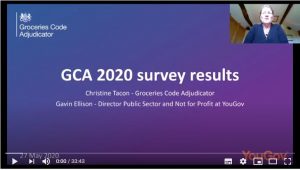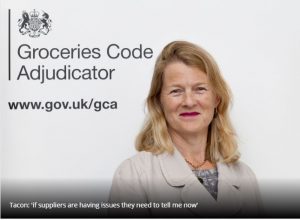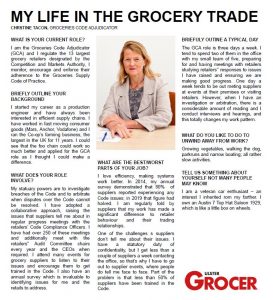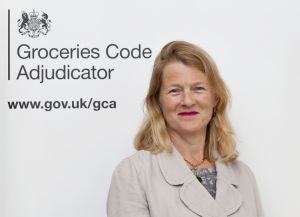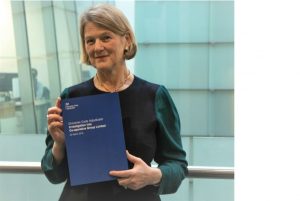The following are examples of Christine’s coverage in the media.
2017
International Women's Day: 'Do not be like others' - Christine Tacon on carving out a career in farming
Farmers Guardian – 7th March 2025
To mark IWD 2025 (March 7), we speak to Christine Tacon, who has sat on various boards such as Red Tractor, about her defining moments and advice for other women in agriculture
Christine Tacon is a well-known figure in the farming world, and although she is not directly from a farming background, she has worked her way up through various businesses and has had a seat at the table on various boards. The Met Office, Red Tractor, MDS and now the Co-op, to name a few.
She says: “My grandparents lived locally to Norwich, where I grew up, on a tenanted farm where my uncle farmed 20 dairy cows. My mother was in the Women’s Land Army, studied agriculture at Sutton Bonnington and Writtle and then worked with the National Advisory Service in dairying, but had to give up her career when she married, as was customary in civil service jobs in those days.
“I am, like many people, only a few generations away from farming.”
Her original career in engineering and marketing had nothing to do with farming until she became marketing director at Anchor Foods, where the butter and cheese were all sourced from New Zealand.
Here she began to understand about dairy farming.
“I tried to identify points of difference for what is essentially a commodity product. I introduced free range butter as a concept, which of course is no longer used as Anchor is part of Arla Foods” she says.
Her first ‘proper job’ in farming was when she became CEO of Co-op Farms.
Christine spent 11 years at Co-op, and she began to really focus on the supply chain.
“We had to get out of some areas of farming to get the business back into profit, and then vertically integrate the supply chain so that we grew, packed and supplied fresh produce and other goods to retailers. Food for the Co-op was branded ‘Grown by Us’ and included nearly all their UK sourced potatoes, onions, strawberries, broccoli and frozen peas along with many other food products such as flour, honey and apple juice. We ran education and wildlife projects on farm and engaged well with the public and Co-op members,” she says.
When she left the Co-op, she began sitting on boards almost all related to food and farming.
Groceries Code Adjudicator
These included the RPA, AF Group, NERC, Met Office, Red Tractor, MDS and now the Co-op. She was also the Groceries Code Adjudicator regulating how retailers treated their suppliers against a statutory code for seven years.
“Not many people realised that was only three days a week, which is why I had other roles alongside it,” she says.
So, after years of working in the sector, what would she say her defining moment is?
“I joined Co-op Farms in September 2000, and I spent the next few months putting together a strategy for how we were going to work together, centralise key functions and exit some activities in order to get us back into profit,” she says.
Foot-and-mouth
“This was going to be a big cultural change and needed a good sell-in and explanation to all employees. I was preparing to launch the strategy at the annual conference when the whole business came together each year in February. At the time the business was run from about 30 locations, including 13 dairy farms, from north to south and there were about 140 employees. And then foot-and-mouth disease struck. I asked the NFU for guidance on hygiene procedures to bring so many people together and Sir Ben Gill said to me: ‘However careful you are, and even if you do nothing wrong, if foot-and-mouth appears in a new area where you farm after your conference, you will be held accountable for spreading it.’
“I realised that the risk was too great and cancelled the conference.
“Instead, I produced a video which I recorded in my garden and sent to all employees. I then went round all the farms personally (meeting off-site for the dairy farms) to explain what we were doing and taking questions. It was a time commitment but meant that everyone got to understand where we were going and question me personally. Retrospectively I now recognise that way of selling in such immense change was infinitely preferable, more personal and safer. But at the time, cancelling the conference felt like a catastrophe.”
She has certainly seen some major changes in farming, particularly policy and the changes made to organisations like Red Tractor.
Farming, by its nature, is challenging and constantly changing, but it was during her groceries code adjudicator role that presented her with her biggest challenge.
She says: “I was the first person in the role, had no team and no guidelines of how to do the job. It also took the Government 18 months to give me the ability to fine a retailer. I thought it would be an unpopular role with suppliers complaining I was not doing enough and retailers pushing back, not changing their ways and finding ways around the code. I thought I and my newly recruited team of five would all need tin-hats.
“In fact, my first day in the role created enormous media interest and I realised that they were going to be my biggest allies. The media played a critical role in telling suppliers what I was doing and what I needed to hear about, and also retailers did not want to be reported in the press for doing badly in the survey or being on the receiving end of criticism from the adjudicator.”
She feels she encouraged a culture change within retailers to realise that the code was a responsible way of doing business, which created better relationships and meant they could collaborate to find solutions.
Advice
With years of experience under her belt, looking back, what would she tell her younger self?
“You do not have to solve all the issues on your own, allow yourself to be vulnerable and ask people for help – it will surprise you how many are there for you,” she says.
“For those starting out in the industry, I would say the same, but I would add that diversity is also about getting diversity of thought – do not be like others, be yourself because your difference adds to the whole.”

Former Red Tractor chair Christine Tacon: "I feeI I have left a job half finished"
Farmers Guardian – 4th July 2024
 After stepping down from her role as chair as Red Tractor, as the new interim chair Alistair Mackintosh begins his role, Christine Tacon reflects on her time at the top – the highs and the lows.
After stepping down from her role as chair as Red Tractor, as the new interim chair Alistair Mackintosh begins his role, Christine Tacon reflects on her time at the top – the highs and the lows.
I stepped down from my role as chair of Red Tractor at the end of June, and it is a good time to reflect on nearly four years in post.
I applied for the job because I wanted to stay close to the farming industry. I’m fortunate to have broad experience, including running the Co-op’s farming business and regulating retailers as the Groceries Code Adjudicator. I saw Red Tractor as a very good ‘pulling together’ of my skills.
Looking back, highlights included farmer meetings and experiencing on-farm audits first-hand. I also very much enjoyed working with the board. They’re a supportive group – some from farming, others bringing science, consumer or supply chain expertise. I feel, however, I have left a job half-finished.
There are achievements I’m very proud of – for example, our focus on simplifying audits.
My objective from the start was to remove two standards for every new one introduced. While achieving that will be a stretch, I’m pleased that streamlining audit efficiency is an ongoing and pressing priority.
I am also extremely proud of Red Tractor’s uniqueness. Not only is it an assurance scheme, but you only find it on British food. Almost every other competitive scheme can be used on imported food. I am concerned that if Red Tractor does not keep up to date, retailers, processors and food service will use alternative schemes and we will lose that British identity on pack.
It is the Red Tractor team’s job to listen to market demands and look at international competition, as well as developments in the market. Raising standards might not be popular, but is indicative of where the market is going – and where producers must get to eventually, though I accept the speed with which we addressed this was too fast.
So whether it’s food safety, treatment of employees, animal welfare or managing the environment, the supply chain needs assurance. Red Tractor has always had these in its remit and if it doesn’t audit, others – possibly many others – will. There is still too much duplication that needs eliminating. I want to thank the producers who have been hugely supportive of Red Tractor and see the need for it. I am also grateful for those on our boards; people, many in unpaid positions, who have had to do way more over the past 12 difficult months than we led them to expect.
I also wish everybody in Red Tractor the best – it’s a small team and they have been so resilient and committed despite what has been a very negative atmosphere around us. I particularly want to thank Jim Moseley for his strength in managing the team through a very difficult year. We’ve faced some major staffing setbacks including the death of one team member, who we will not forget for his dedication and his character. These personal tragedies have placed business issues and industry politics in a very sharp perspective.
I hope the current independent review will explain the relevance of assurance and guide Red Tractor on what it must do better. Armed with these findings, I believe widespread producer trust in Red Tractor can be achieved again. I wish Alistair Mackintosh, the interim chair, all the best over the next few months and look forward to news of the appointment of a permanent chair to carry forward the work longer term.
Emily Ashworth
Red Tractor chair Christine Tacon to stand down after Co-op board appointment
The Grocer – 21st May 2024
Red Tractor chair Christine Tacon is to step down from her role at the farm assurance scheme following her election last weekend to the Co-op board.

Former Groceries Code Adjudicator Tacon was appointed to the Red Tractor board in December 2020.
Her tenure in recent months has been dominated by the controversy around Red Tractor’s abandoned plans for its Greener Farms Commitment module – which ultimately led to a review into the governance of the scheme by the NFU and a second, ongoing review into the wider farm accreditation framework in the UK.
Tacon – who headed up the Co-op’s farming operations from 2000 to 2012 – described her appointment to the retailer’s board, following last weekend’s AGM, as “very significant for me”.
But it had also created a “dilemma” due to her role with Red Tractor.
“Fulfilling these two roles in parallel, each of which requires 30-40 days per year, would ordinarily raise no concerns – indeed, Red Tractor chairs almost always hold other positions in the food industry simultaneously,” she said.
“However, I am acutely aware of those with reservations about supermarket power in general, and a lack of trust in Red Tractor from some quarters that needs to be repaired,” she added.
“Aware of these concerns, I raised my possible appointment proactively with Red Tractor’s ownership body and we mutually agreed it would be better for me to step down from Red Tractor if I got the Co-op role.”
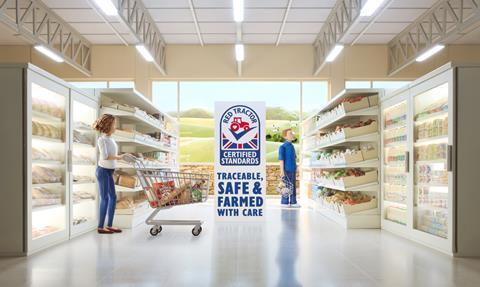 Tacon stressed “this is not a move I welcome in any way”. She added she would have “far preferred to carry on supporting Red Tractor at such a critical point”.
Tacon stressed “this is not a move I welcome in any way”. She added she would have “far preferred to carry on supporting Red Tractor at such a critical point”.
She was also “confident I could have executed both roles without compromising either organisation”, she added.
“However, I do not want to risk giving oxygen to those intent on criticising Red Tractor or for this to be the cause of any negative publicity.”
Tacon has offered to stay on at the Red Tractor ownership body’s discretion until a new or interim chair is appointed.
This is an important time for Red Tractor as it works to improve transparency and audit efficiency, and better demonstrate value,” she added. “I would also like to thank the excellent team at Red Tractor for their hard work and dedication. Expect an update from the ownership body in due course.”
Despite the “bumps in the road” faced by the scheme in recent months – which led Tacon to apologise for the handling of the GFC’s rollout when it was officially axed in March – she insisted Red Tractor was “a unique and valuable asset to us all, from farm to fork”.
“There are issues that need addressing, and believe me, this is happening. But it is incumbent on us all to see the enormous opportunities and value presented by Red Tractor and work together to ensure it is there for us all, for the future.”
Kevin White
Co-op Member Nominated Director Candidacy
I am delighted to have been elected as a Member Nominated Director for the Co-op at their AGM held on 18th May 2024. If you are interested you can see my candidate address, 500-word statement and 2-minute video used for my application here.
What Australia, U.K. grocery codes can teach us as Canada's food fight comes to a head
Financial Post – 22nd April 2024
Progress on a Canadian grocery code of conduct has stalled as two major retailers refuse to sign it, claiming it will raise prices.
The code is intended to set rules for fair dealing in negotiations between retailers and suppliers, helping level the playing field in the grocery industry.
Although Canada’s proposed code of conduct differs from the Australian and U.K. counterparts that influenced it, there may be lessons to draw from those frameworks as public discourse about the Canadian code comes to a head.
Political pressure
Discussions about a grocery code here got underway before food inflation started to surge. But in recent months, rhetoric about the code and grocery prices have become increasingly intertwined as consumers felt the strain of higher bills.
As the planned 2024 launch of the code neared, Loblaw Cos. Ltd. and Walmart Inc. said they wouldn’t sign it in its current form, arguing it could raise prices further.
Meanwhile, in hearings by a House of Commons committee studying food prices, some members of Parliament said the code could help with food prices, claiming that’s what happened in Australia and the U.K.
“When the codes of conduct were introduced in those countries, there was actually very positive impacts on grocery store prices,” said Bloc Quebecois MP Yves Perron in French at a committee meeting Dec. 7.
Michael von Massow, a food economy professor at the University of Guelph, doesn’t think Canada’s grocery code will lower prices.
In fact, he thinks it could put upward pressure on prices — but that pressure is more likely to squeeze big grocers’ margins than significantly boost costs to consumers.
“My guess is … everyone will get squeezed a bit. We’ll see small price increases, but not to the degree that the big players are squeezed,” von Massow said.
The code was not created with affordability in mind, but rather economic stability for suppliers and manufacturers, said Michael Graydon, chief executive of Food, Health & Consumer Products of Canada and chairman of the interim board for the code.
He, however, does believe it could help stabilize prices, saying countries with grocery codes have seen lower food inflation than others after those codes were implemented.
“It shouldn’t be the … silver bullet of affordability,” he said.
Other countries’ codes
The U.K. has had a mandatory grocery code for more than a decade, prompted by many of the same concerns that led to the creation of the Canadian version.
“The code is designed to stop retailers transferring excessive risk and unexpected cost to suppliers,” said Mark White, the U.K.’s current code adjudicator.
An investigation by the country’s Competition Commission concluded grocers’ practices negatively affected quality, innovation, investment and consumer choice, he said.
The code applies to the U.K.’s 14 biggest retailers selling groceries and has been mandatory since 2010 after an earlier, voluntary code proved ineffective, said Christine Tacon, a food chain expert and the code adjudicator until 2020. That role was introduced in 2013 and given a “pretty hefty stick,” Tacon said — the power to fine retailers by up to one per cent of their revenue.
Neither retail prices nor prices between suppliers and retailers are covered by the British code of conduct. However, White recently published a set of “golden rules” for retailers dealing with price increase requests from suppliers.
In Australia, the launch of a grocery code in 2015 was prompted by complaints about how grocers treated suppliers, said Tanya Barden, chief executive of the Australian Food and Grocery Council.
The code, which has an independent reviewer, is voluntary. But once signed, it becomes legally binding — and all the major players in Australia’s heavily concentrated industry have signed on.
“One of the cornerstones of the Australian code is the requirement for the retailers to negotiate in good faith,” said Barden.
The Australian and British codes don’t cover the conduct of suppliers or many smaller retailers, but Tacon believes changing behaviours among the biggest players can have a trickle-down effect.
Mixed results
Comparing Canada’s food inflation data to numbers from other countries doesn’t paint a conclusive picture. In the years before the COVID-19 pandemic, during which Australia and the U.K. had grocery codes, each of the three countries outpaced the others at different points.
A look at food inflation by country could be seen to suggest some stabilization after the codes were implemented, but it’s difficult to peg changes in food inflation to a single factor.
In both the U.K. and Australia, annual food inflation varied widely from year to year before grocery codes were introduced — some years more than nine per cent, others below one per cent or even negative, according to data from the Organization for Economic Co-operation and Development.
After the British code was implemented, annual food inflation numbers in the U.K. appeared to stabilize somewhat, remaining below three per cent from 2014 until 2022 (and negative from 2014 to 2016).
The U.K. code benefits everyone involved, said Tacon, including consumers, who over time have access to more choice as smaller suppliers are less likely to be squeezed out of the market.
What’s next
Canada’s grocery code shares aspects of both the British and Australian models, but differs in one major way: it’s meant to cover suppliers as well as retailers, which Tacon said makes it much more complicated.
And right now, it’s not clear whether it will end up being voluntary or mandatory.
Without all the major players on board, the voluntary Canadian code won’t work, advocates and politicians say. In February, the House of Commons committee told Loblaw and Walmart that if they didn’t sign on, the committee would recommend that federal and provincial governments enshrine the code in law.
Australia’s code may not be voluntary for much longer, either. In April, a government-commissioned report recommended that the code be made mandatory.
Barden said the Australian code has been effective, though there’s room for improvement — “and it’s not a panacea for the market concentration.”
“The (grocery) code is aimed at improving trust, transparency and certainty in the negotiations between retailers and suppliers,” said Barden.
“They’re different issues.”
Rosa Saba
Independent review finds Red Tractor Governance is sound and no breach of procedure
The NFU have today published Campbell Tickell’s independent review of Red Tractor Governance.
Red Tractor Chair, Christine Tacon commented:
“The review reports that ‘Red Tractor governance is sound’ and Campbell Tickell have found ‘no procedural breach’.
“It also flags that ‘Red Tractor is perhaps significantly more transparent than other assurance schemes’ and acknowledges that this, together with its representative structure, leads to governance complexity. Red Tractor needs to respond to this, particularly given the current pressure of a challenging operating environment.
“The review sends a clear message about the level of frustration farmers feel and we need to listen carefully to their views. We will also continue to increase our efforts and investment in communicating Red Tractor’s purpose and benefits to farmer members.
“We now have an essential opportunity to reflect and refresh the way Red Tractor delivers its role for all stakeholders across the entire food chain. Over the coming weeks, Red Tractor’s AFS Board will consider the Review in full before agreeing next steps and how these will be implemented.”
The Review has found that Red Tractor governance is sound and comments that: “Red Tractor’s procedures were followed and there was no procedural breach in relation to the events which gave rise to the decision to commission this review.” [Paragraph 1.7]
Regarding the Greener Farms Commitment, the Review confirms that the proposals are correctly part of Red Tractor’s remit: “Red Tractor’s standards are to cover food safety, animal welfare and the protection of the environment. Red Tractor’s activities, in producing its assurance standards, promoting the Red Tractor Brand and developing the environmental module, the Greener Farms Commitment, fall full-square within its corporate objects.” [3.3]
Campbell Tickell have investigated the work on the Greener Farms Commitment proposal and found that: “…a process was agreed which included customer surveys, piloting with 40 farming enterprises, a cost-benefit analysis, updates to all Sector Boards, and regular OB and Board updates. Some 300 + stakeholders were involved in this process, including the NFU, which was duly briefed at formal meetings during the process.” [2.6]
The report comments on the challenging circumstances that surrounded this process: “Although throughout its 23-year existence Red Tractor has always needed to balance pressures and forces – the needs of consumers, retailers, processors, farmers, governments and others – that are often in direct conflict with one another, there has probably not been as difficult a set of operating circumstances as at present.” [2.14]
Campbell Tickell also observe that Red Tractors’ governance is complex and makes responding to these operating circumstances more difficult: “The Articles of AFS are, in comparison with most companies limited by guarantee, somewhat complex, for reasons that we have acknowledged above. However, a successful 20-plus year track record suggests that they have, until recent events, proved fit for purpose.” [3.8]
The review identifies that this complexity is increased by the need to respond to the differences between the devolved nations: “…the differences between the devolved nations have become more pronounced over recent years, and that ensuring that Red Tractor can respond to and engage with all the nations will be one of the critical success measures going forward.” [3.34]
Campbell Tickell’s report comments that to respond to this challenging operating conditions, Red Tractor will need a united board of directors: “Whatever the number of Board members, it is important that all should be united around common purpose, and should fully understand their role and behave accordingly.” [3.11]
The report also highlights the importance of communications: “We consider that this situation is partly a communication issue – there is of course a great deal of communication and consultation, but its recipients may not always fully understand exactly how a given item may fit into the wider processes under way. In this sense, Red Tractor is perhaps significantly more transparent than other assurance schemes, but given the considerable complexity of the structure, this does not currently always operate in its favour.” [3.39]
The review reports that there are misunderstandings within Red Tractor’s governance structure: “…a significant minority people within its governance structure and to whom we have spoken in the course of our review have expressed themselves unclear as to their role and the precise role of their part of that structure, whether the Sector Boards or Technical Advisory Committees.” [3.35]
Campbell Tickell have also identified what they describe as ‘widely contrasting perceptions’ of Red Tractor: “Many see Red Tractor as a well-managed, effective and professional organisation striving to make progress in difficult conditions and to exercise much-needed leadership in the food and farming industries. Others (although fewer of these on the Board of Red Tractor) see the organisation as having a closed, top-down and controlling culture and as having lost touch with the farming communities.” [3.50]
And: “Thus we have found evidence to support both the contrasting sets of perceptions referred to above. There is widespread praise for the quality of Red Tractor Board Members and for the professionalism, commitment and effectiveness of the executive team. In the focus groups we encountered much respect for the wider staff workforce and a recognition of the very stressful conditions under which they were working.” [3.56]
Campbell Tickell make a number of recommendations designed to inform the response to their Review. Red Tractor’s Ownership Body and the AFS Board will now consider these in full:
Campbell Tickell’s Recommendations:
- Create and publish a Governance Handbook: To address issues around lack of clarity about roles and responsibilities.
- Introduce a formal process of appraisal for Board and Committee members: To foster a culture of continuous improvement within the governance of the organisation and enable opportunities for ongoing simplification and streamlining.
- Develop and adopt a Board Member Code of Conduct: To balance two considerations: That company law requires directors to act in the best interests of the company; and that those interests can sometimes conflict with the interests of the body the director represents.
- Ensure that aspects of the Code of Conduct have application to the wider governance community.
- Address stakeholder engagement and relations as a priority: We understand that Red Tractor intends to commit resource and time to engaging with farmers in coming months, explaining its work and purpose. We recommend that this be done as soon as practicable. This effort needs to be matched by the Ownership Bodies.
- Review and revise the Red Tractor risk map: so that it can be fit for purpose in the new environment.
Supermarkets already have price controls: us
The Times – 2nd July 2023
Our supermarkets seem short of friends — at least within the Palace of Westminster. Rishi Sunak has said that the cost of the weekly shop “has gone up too much in the past few months … we’re looking at the supermarkets, making sure that they’re behaving responsibly and fairly when it comes to pricing”.
Accordingly the chancellor, Jeremy Hunt, has urged the Competition and Markets Authority to look into the matter. The leader of the Liberal Democrats, Ed Davey, has already made his mind up, declaring the supermarket firms to be “raking in eye-watering profits” and “profiteering”. And last week leaders from the industry were subjected to a (rambling and ill-directed) interrogation by MPs from the Commons business and trade committee.
On Monday’s edition of Newsnight, the BBC2 programme’s invariably well-informed political editor, Nicholas Watt, revealed that his sources in government told him they were urging the CMA to consider using its “sweeping powers” to punish exploitative supermarket pricing and that it “may need to make a significant intervention”. And the reason for this? “There is a grim mood … Conservative MPs are getting the jitters.” So it’s about politics, not economics. Or, in the logic of Yes Minister: something must be done. This is something. Therefore we must do it.
My bet? Nothing will be done, because in reality the government and the CMA know that the food retail business in this country — almost entirely down to the supermarkets themselves — is intensely competitive; more so, for example, than in the rest of Europe. Even if we need to thank the arrival of the German discount chains Lidl and Aldi for keeping our established supermarkets honest, so to speak.
As the head of Assured Food Standards, Christine Tacon, observed last week in response to Watt’s Newsnight report: “Discounters are leading the charge on prices, and others are following them so as not to lose market share. That’s what you get in a truly competitive market. People may not want to hear this, but [in Britain] we have some of the cheapest food.”
In this context it’s instructive to see what happened to Tesco a decade ago. It had been seen as an invincible behemoth, even described as “Tescopoly”. But when Aldi and Lidl arrived, it resisted cutting prices. The result was that it lost over a million customers in a single year, its own profits foundered and its chief executive, the unfortunate Philip Clarke, was ignominiously dumped.
It was only after he left that it became the consumer champion again, for example by winning, last year, a very public battle against Heinz when it refused to stock the firm’s best-known products on the grounds that the American food giant was being too greedy on pricing. Heinz backed down, to the benefit of British purchasers of its tomato ketchup and baked beans. In any case, all the big UK supermarkets have developed their own much cheaper versions of such products for those who can’t easily afford the premium prices of the original.
Having returned to its core values (its founder, Jack Cohen, to whom my paternal grandfather supplied tea, had the slogan “Pile it high, sell it cheap”) Tesco remains the most profitable supermarket business. Yet its profit is about 4p for every £1 of sales — its latest annual figures show a margin of 3.8 per cent. The figure for all the other supermarkets is lower still. Aldi’s most recent declared returns show a profit of £35 million on sales of £13.5 billion, a profit margin, if it can be called that, of about 0.25 per cent.
As The Guardian’s business columnist Nils Pratley has observed, the industry’s profitability numbers are “miles below what the global food and drink manufacturers achieve. Unilever, the global Dove to Domestos titan, has just reported 16 per cent [profit margin]”. In fact there is no UK business sector that has such low profit margins as the food retail industry. Utilities tend to have margins of about 10 per cent, for example, and mobile phone operators 15 per cent.
Obviously, it would be possible for the supermarkets to absorb more of the increase in their costs (not just in the food chain from fertiliser upwards but also their vast energy bill in the freezing process). However, most of them are publicly quoted companies. Not only do they have dividends to pay, chiefly to pension funds; no one is obliged to buy their shares, and if they suffer a flight of capital, then how would they be able to pay their own hundreds of thousands of employees, let alone fund the technological improvements of which the biggest beneficiaries have been the consumers — us?
This is the process that has, in the postwar period, seen the average British family’s food bill fall from about 30 per cent of its disposable income to 10 per cent. It is true that food costs take a higher proportion of income among the poorest families, but by the same token they have been the biggest beneficiaries of the historic downward trend in food costs (and will at least be grateful for the government’s sensible decision earlier this month to postpone for a further two years its mooted ban on “Buy one, get one free” deals on products with high fat or salt content).
I am not claiming the supermarkets are in any way altruistic. Their ultimate purpose, as for all businesses, is to make profits. But they are rooted in communities; good citizens, if you like. And their endeavours during the height of the coronavirus crisis, in which they and their employees managed to maintain their quality of service and reliability in the most trying of circumstances, has been too easily forgotten.
And I am still reeling from the discovery that in February last year, even before the rocketing of food prices (principally because of the war in Ukraine), the pollster Opinium reported that 70 per cent of respondents — and 65 per cent of Conservative voters — would support “price controls on food”. Thousands of years of history, from the emperor Diocletian to modern-day Marxist-led Venezuela, has demonstrated that this leads to food shortages.
In the face of such invincible ignorance, it is perhaps not surprising that politicians say the things they do about “profiteering”, or that they will somehow act to make the supermarkets “more responsive” to the consumers’ needs — as if the firms themselves didn’t have the biggest interest of all in maintaining the goodwill of their customers.
It almost makes me want to make a most undemocratic counter-suggestion: how about the politicians and civil servants step aside and let the supermarkets run the country? Imagine if government departments were even half as efficient as Tesco or Sainsbury’s. I’d vote for that.
Dominic Lawson
Tacon announces Co-op Member Nominated Director candidacy
I am standing as a Member Nominated Director for the Co-op at their AGM held on Saturday 20th May 2023. I have been asked to produce a brief candidate address, a 500-word statement and a 2-minute video. These can be view below.
Application Process
My application and those of the other 3 candidates can be viewed on the AGM pack for the Co-op Group.
Summary candidate address
I led the Co-op’s farming business for 11 years. More recently, as Groceries Code Adjudicator, I regulated the Co-op. I’ve been an insider and an outsider. I know first-hand that balancing commercial and co-operative isn’t always easy, but I care about Co-op values. As your MND, I will ensure members’ voices are at the heart of decisions – that means really listening to Co-op members, be they young or old, new or life-long, and whether in village, town or city communities.
500-word Statement:
About me
- I live in Macclesfield, am a Chartered Engineer and have an MBA but most of my career has been in food, including at Mars Confectionery and Fonterra (New Zealand’s dairy co-op)
- I led the Co-op’s farming business, when it was the biggest in the UK, for 11 years
- Since leaving the Co-op, I have worked as a non-executive director of the Met Office, Natural Environment Research Council and AF, a large farmer purchasing co-op
- 2013-2020 I was Groceries Code Adjudicator and regulated the 13 largest retailers, including the Co-op: my role was to enforce a legally binding code of practice on how suppliers should be treated
- I now chair Red Tractor, the food standards body assuring customers that British food is safe and farmed with care
- And I founded and run a network where women in food and farming can meet and find role models and mentors.
How I have served the Co-op so far and how I work
I took over the Co-op farming business when it was loss-making, but we quickly returned to profit by taking courageous decisions like getting out of livestock farming and investing in produce packing. Most of our successes came by putting co-op values and principles heart and centre of operations: we shared machinery; centralised professional expertise, like buying and selling; and empowered farmers to focus on what they did best – producing food efficiently and responsibly. We launched an education project, 250,000 children visited our farms and learned where their food came from; we developed a range of “Grown by us” products for Co-op shops; each farm developed their own wildlife project, and we welcomed Co-op members onto farms. The farm business improved through living the Co-op values of co-operation, education, concern for the community and local decision-making.
As Groceries Code Adjudicator, I listened to suppliers and ran annual surveys so that I could make retailers aware of the issues their suppliers were experiencing. I investigated Tesco and found them in breach of the Code by delaying payments to suppliers; Tesco’s behaviour improved dramatically as I ensured that they implemented all my recommendations. I also investigated the Co-op and found them in breach of varying agreements without reasonable notice. There was no malice, but I found poor governance controls, missing documentation and systems that did not match policies. A highly effective Co-op team worked through my recommendations, and with new practices in place, Co-op was voted by their suppliers to be the second most compliant retailer the following year. A remarkable improvement.
I would bring to the Co-op board
- a focus on an inclusive organisational culture and colleague progression;
- food supply chain experience with insight about future opportunities, such as forecasting to reduce food waste in the supply chain;
- a desire to listen and advocate for members, especially the young who want business to work on the issues that shape their future society like sustainability and animal welfare
- because co-op values and principles in action make for better business.
View my 2 minute video here
How do I vote?
* please note that you must be a member of the Co-op in order to vote *
- You must cast your votes using the Co-op website before 15th May 2023.
- You should have received all information via email or post which will include your two security codes required to access the website voting page.
- Vote online here.
- View the AGM Booklet for more information on the elections.
Supermarket power tops concerns at Farmers Weekly Question Time
Farmers Weekly– 25th April 2023
Watch Christine as a panelist at Farmers Weekly Question Time event – recorded in front of a live studio audience, farmers, students and other guests quiz industry leaders on topical agricultural issues.
https://www.youtube.com/watch?v=2D3P4jB5kG
Supermarket power tops concerns at Farmers Weekly Question Time
Farmers Weekly– 25th April 2023
Supermarkets and supply chain unfairness were top of the agenda at the third Farmers Weekly Question time event at the John Innes Centre in Norwich.
Farmers shaped the discussion by putting their searching questions to a panel of policymakers and influential figures, including Christine Tacon, chairwoman of Assured Food Standards for Red Tractor.
Questions covered a range of topics, including gene editing, Red Tractor assurance, food safety and net zero.
Read some of the best questions put to the panel below.
How can we stop ever-decreasing margins for farmers while supermarkets always increase theirs?
Labour shadow farming minister Daniel Zeichner said there is a role for government to play in achieving a fairer balance in the supply chain, and more intervention is needed.
“We argued in the Agriculture Act for more powers for the groceries code adjudicator [GCA] and more resources to make it happen,” he said.
“I don’t blame the retailers – they do what they do as profit-seeking organisations, but if we want to be a country that produces our own food in the future, we’ve got to do something about that supply chain unfairness.”
But Christine Tacon, who prior to her current role as chairman of Red Tractor was the GCA, explained that legislation – both past and present – only allows the GCA to get involved in contracts between the big retailers and their suppliers. It does not allow any intervention on price.
Despite this, she suggested that retailers had a “massive shock” in recent months when they could not get hold of the food they wanted.
This means that power is now shifting back to suppliers. “It’s got to be about better long-term relationships – making sure that everyone in the food chain is making enough money to invest – rather than regulation.”
National Pig Association chairman Rob Mutimer told the audience that the pig farmers which have emerged the best from the past two years of squeezed margins are the ones who have the strongest relations with the end buyers.
Audience comment: Amy Russell, an agronomist from Timac Agro, said more needed to be done at government level.
“Suppliers are all struggling – be that in the pig industry or the veg industry, or even the grain market. Without anything from government level, supermarkets will continue to push their luck.”
Can we have cheap food and protect the environment?
Local Conservative MP Jerome Mayhew said that the whole ethos of the government’s post-Brexit policy is to pay “public money for public goods” while letting the free market determine the price of food.
But Mr Mutimer pointed to two particular challenges – the first that meeting environmental regulations could cost substantial amounts of money, and the second being that cheap food often means imported food, produced to lower standards than in the UK.
“If you do trade deals with countries that have low environmental regulation, you will find that the food on offer in supermarkets will be coming from other parts of the world.
“Consumers in all supermarkets may say they support environmental issues, but when they come out and you look in their baskets, you will find the cheapest food.”
Mr Zeichner agrees. “Yes, we can have cheap food – it just won’t be made here,” he said.
He believes there is no better example than the recent Comprehensive and Progressive Agreement for Trans-Pacific Partnership (CPTPP) deal the government has signed up to.
This has effectively “thrown the egg industry under the bus”, as imports will be coming in 10 years’ time from hens kept in cages.
Audience comment: Wendy Houston, vice-chairwoman of Fram Farmers in Suffolk, said it was important to get away from the obsession with cheap food and the “race to the bottom”.
“If we can produce reasonably priced, highly valued food with due regard to the environment and animal welfare, we will be much better off altogether.”
Could genetic modification (GM) and gene editing (GE) and be good for UK farming?
Simon Griffiths, who leads on wheat genetics at the John Innes Centre, said that both GE and GM could deliver benefits, but the overriding factor is whether the British people are ready for it.
Regardless, Dr Griffiths welcomes the recent royal assent given to the Genetic Technology (Precision Breeding) Act.
“Even if we never see precision-bred crops on UK soil as a farm crop, it is still going to accelerate discoveries in biology that allows us to deliver benefits to breeding more quickly.”
Mr Mayhew said it was crucial to help consumers understand the difference between GM and GE – the first of which involves introducing new genes, and the second simply speeds up natural genetic processes.
“It would be a tragedy if the two got conflated in the public mind and thought of as the same thing,” he said, pointing out that the public had already made up their minds against GM.
Mr Zeichner said that, even though Labour is broadly in favour of GE, the debate is actually more nuanced, and GE is not always as precise as some liked to believe. He also points to potential trade issues, as other countries had different interpretations.
“The key is to get equivalence with other countries and also get consent all the way up the supply chain,” he said.
The biggest danger is if the public get “spooked” by GE, which is why there is reason to tread very cautiously with gene-edited animals.
Audience comment: Former UKIP MEP and local farmer Stuart Agnew condemned the hypocrisy of the debate on GM, pointing out that the entire UK livestock sector relied on imported GM soya beans.
“The public are eating large quantities of GM food and for them to say they won’t accept it is utter nonsense.”
Is it time to dump Red Tractor on the scrap heap?
Not surprisingly, Ms Tacon put up a strong defense of the Red Tractor scheme, pointing out that it was set up in 2000 in the wake of the bovine spongiform encephalopathy and salmonella food scares, to bring all assurance schemes under one roof and reassure consumers their food is safe.
The impact has been to raise public trust in food and the scheme has now been adopted by every food retailer and most food service companies.
“All these retailers and food service companies are not doing their own audits because they are relying on Red Tractor to do it,” she said.
“So it is one audit that gives you maximum access to every single market,” Ms Tacon said, adding that government agencies such as the Food Standards Agency were far less likely to carry out their separate audits on Red Tractor farms.
Not everyone sees it that way. While Mr Mutimer acknowledged that having Red Tractor assurance has helped UK pig producers enjoy a small price premium over Continental pig farmers during the recent crisis, he disagreed that it results in fewer audits.
“In the pig sector, we are audited by Red Tractor, the RSPCA, and every supermarket has their own auditing system using Red Tractor as the baseline which they add onto, creating a huge amount of bureaucracy.”
Multiple “empire builders” have also made Red Tractor far more complex than when it first started, with additional requirements pushed down by the supermarkets at zero cost to them.
Mr Mayhew said the concept of Red Tractor is the right one, supporting both consumers and producers, while Mr Zeichner believes it would be foolish to dump it.
“I quite understand the frustration people feel with it, but if it went, it would be replaced by another set of bureaucracy.”
Audience comment: Ian Spinks, a Norfolk beef farmer, was sceptical, suggesting a single annual visit did not really prove what was going on throughout the rest of the year.
“I also wonder sometimes if the work is really being done for the Health and Safety Executive, the Environment Agency or the supermarkets, yet the farmer still has to pay for it.”
Is food safety a concern?
Mr Zeichner said people should certainly be worried and the recent Farmers Weekly investigation into malpractice in the meat sector shows why.
“The Food Standards Agency now has a much bigger job to do than before, but I’m not sure they’ve been given enough resources to do that,” he said.
He added that the checking in Dover on imports is only intelligence-led, while imports of illegal meat in white vans passing unchecked through the port puts the UK at risk.
Mr Mutimer went further, describing the imports of illegal meat through Dover as an “absolute disgrace”.
“The Scots did some checks and were finding two or three vans a day coming through their ports carrying illegal meat,” he said. “We’re just leaving ourselves open to foot-and-mouth or African swine fever, which is rife throughout Europe.”
However, Mr Mayhew believes the situation will improve, with the government having recently launched its draft Border Target Operating Model, which will apply the most inspections to product coming from areas with highest risk.
What are the panel’s reflections on food security and who will policy develop?
According to Dr Griffiths, food security and self-sufficiency are not being taken seriously enough. “More than 50% of the world’s wheat is produced by just five countries and we saw what happened when just one of those countries – Ukraine – came under such pressure,” he said.
“India and China are the biggest wheat producers in the world, but they are not exporting because they eat it all.
“And all the time, climate change is bringing in new diseases, and high temperature and drought are putting pressure on those areas where our wheat is imported from. You can’t overstate the importance of making sure our supply of staples is secure.”
Mr Zeichner agreed that food security should be given higher priority. “Our goal is to produce more here, and it’s sensible to have shorter supply chains when the world is so precarious,” he said.
Closely linked to food security is energy security, added Ms Tacon, pointing out that the UK has lost a lot of glasshouse and poultry production in the past few months due to the high cost of energy and the exclusion of farmers from energy subsidy schemes.
How can agri-food help the UK reach net-zero greenhouse gas emissions by 2050?
The first priority is to be able to measure each farmer’s carbon footprint, said Ms Tacon, but few have even thought about this. “We also have a plethora of different carbon calculation tools that all give completely different answers.”
More financial help should be given to encourage farmers to do their carbon calculations, as is available in Scotland, she added. Bord Bia in Ireland already includes carbon measurement within its farm assurance standards.
But she opposed the idea of farmland being used to help other sectors offset their own emissions and biodiversity losses.
“It really worries me that we always talk about net zero as if nothing else matters. Biodiversity matters. Food security matters. They’re all important and we can’t look at anything in isolation.
Mr Mutimer said finding alternatives to soya and maintaining high animal health on pig farms will result in greater food conversion efficiency and so help the move towards net zero.
But the AHDB needs to provide better data and the government should provide capital grants to help people move in the right direction.
Changing farming practices is also important, and Dr Griffiths said it is encouraging that farmers are thirsty to innovate and take on these challenges.
“Our crops can be planted to use less nitrogen, we can increase soil carbon, we can increase biodiversity and that can have beneficial effects on greenhouse gas emissions,” he said.
Could the Competition & Markets Authority seriously do the job of policing the GSCOP?
The Grocer – 19th July 2022
Critics say the GCA has over-stepped its remit and made itself vulnerable, but supporters warn handing its job to the CMA would be disastrous
Small business minister Jane Hunt had been in the job for just two weeks when The Grocer revealed she was to consider scrapping the Groceries Code Adjudicator role in a drive to increase efficiency and ministerial accountability.
Whether Hunt is still in place after the Tory leadership election remains to be seen, but the prospect of an end to the independent supermarket watchdog has sparked a furious backlash.
Yet Adjudicator Mark White is also facing questions from some quarters about the continued relevance of the GCA, eight years after it was formed to protect suppliers from unfair supermarket behaviour.
A statutory review by the Department for Business, Energy & Industrial Strategy (BEIS) is to consider whether the GCA’s duties should be folded into the Competition & Markets Authority. It is not the first time ministers have considered ditching the Adjudicator. A 2016 review found no evidence such a move would be beneficial to effectiveness in delivering public functions.
A second review in 2019 omitted the question and some believe the fact it’s back in the latest review could make the GCA vulnerable to the sort of “bonfire of red tape” promised by Tory leadership favourite Liz Truss.
Yet the Adjudicator is funded by a levy of the 14 retailers it polices, all of whom have grocery turnover of over £1bn.

“For the government to present this as some sort of cost-saving exercise shows how out of touch they are,” says Red Tractor chair Christine Tacon, who held the Adjudicator post for its first seven years.
“It doesn’t cost the taxpayer a penny. The only public money spent goes on those officials in BEIS whose job seems to be running around shadowing the GCA, even though it was supposed to be independent.”
However, Tacon believes it is right for the GCA to be held up to scrutiny. “I always viewed the statutory review as a sunset clause and a chance to review the legislation to ensure it is still fit for purpose.
“I think it was wrong for them to omit this question in 2019.”
Tacon, who conducted the only two GCA formal investigations to date (see box), claims the 2015 one into Tesco is the biggest landmark in the GCA’s legacy to date, despite it coming before the Adjudicator had powers to fine the supermarket 1% of its annual turnover. Tesco was found to have systematically delayed supplier payments to suppliers, despite the Groceries Supply Code of Practice having been in place since 2010.
“You only have to go back to what was happening between 2010 and 2013 to see what an impact the GCA has made,” says Tacon. “The change between 2013 and 2014 was dramatic. Retailers are now some of the best payers in industry. They pay their suppliers much faster than suppliers pay their suppliers.”
Yet tensions have been growing between supermarkets and suppliers, whilst the role of GSCOP has come under question, first in the pandemic and now with the cost of living crisis. At the height of lockdown several retailers raised concerns with Defra and the CMA about remaining compliant with the code because of “unprecedented” trading conditions. Morrisons boss David Potts compared it to “being handcuffed to a donkey”.
This year’s avalanche of cost price increase requests from suppliers has seen clashes reach new heights. The Grocer understands the Adjudicator is currently involved in multiple arbitration processes – the stage before a formal investigation – between suppliers and supermarkets, in the fallout from price hike disputes.
“It’s all very well having golden rules but if you can’t enforce them, what’s the point?”
“I’m sure there is a lot of retailer lobbying going on and knives out for the Adjudicator,” says a source. “We saw it during Covid, and I’ve always been very fearful they would try to blame GSCOP for prices being high.”
Another source points to the comparative “lack of visibility” of the Adjudicator under former Compass Group general counsel White’s regime, compared with Tacon’s, and claims the role has been made vulnerable by the GCA’s intervention in CPIs, after White published a set of ‘golden rules’ for retailers after what he described as an “unprecedented” barrage in January. Yet the Adjudicator has no powers to intervene in pricing issues, unless they have led to code breaches, such as short notice delistings, itself a grey area.
“It’s just not his remit.” says the source. “It’s all very well having golden rules but if you can’t enforce them, what’s the point?”
However, GCA supporters warn it would be disastrous to cull the role, just as retailer/suppliers’ relations face their biggest test in decades.
“I think Mark White is doing a really good job,” says John Noble, director of the British Brands Group.
Jonathan Kittow, director of supply chain consultancy Simply Supply Chain, claims the interventions of the GCA continue to save suppliers millions each year and says it is crucial it survives the review.
He cites a £14m per year reduction in unsubstantiated deductions from The Customer Supply Group set up in the time of Tacon, to tackle retailer ‘Drop and Drive’ fines, and says the figure is much larger when extended beyond the group.
Kittow says in the past two years alone, £2m has been recovered by his members thanks to the GCA pressing retailers to let suppliers raise invoices for products that have been received but not paid for.
The GCA surveys between 2019 and 2022 showed suppliers incurring significant costs because of inaccurate forecasting have fallen from 24% to 18%. Suppliers experiencing retrospective changes to supply agreements fell from 12% to 9% and suppliers experiencing delisting without reasonable notice dropped from 22% to 16%.
Along with CPI-linked delists, White’s current challenges include how to tackle online giant Amazon, which was welcomed to the GSCOP fold in March, after the CMA decided it had hit the magic £1bn turnover figure.
Trust in supermarket food down as consumers link cheaper choices with lower quality, survey finds
The Grocer – 20th July 2022
 Consumers are losing trust in supermarket food as they assume swapping to cheaper ranges means compromising on quality and food safety, new research suggests.
Consumers are losing trust in supermarket food as they assume swapping to cheaper ranges means compromising on quality and food safety, new research suggests.
A YouGov survey of 3,500 UK adults commissioned by Red Tractor found 46% were changing what they bought to keep their families fed during the cost of living crisis. Meanwhile, 24% said they were buying what they perceived to be food produced to lower food safety and animal welfare standards, increasing to 29% of people on lower incomes.
The survey for Red Tractor’s second annual Trust in Food Index found only 58% of consumers trusted the safety and quality of supermarket food, down 20 percentage points since 2021.
The change showed that “consumers who switch to value ranges assume that production standards are weaker, despite many of these products being assured to high UK specifications”, said a Red Tractor spokeswoman.
Trust in food sourced in the UK food was also down, by eight percentage points to 73%. Nevertheless, the UK remained more trusted for food than anywhere else in the world, according to the research.
The survey, conducted online in May this year, also found 30% of respondents had cut back on buying meat and 13% on fruit & veg, rising to 35% and 19% respectively for lower-income households.
“While British food continues to be highly trusted, our latest Trust in Food Index shows that as people are forced to trade down into cheaper products, they lose confidence in the way the food is produced,” said Red Tractor chair Christine Tacon.
“That’s understandable – but it’s also unnecessary. Whilst some shoppers now struggle to afford the prime cuts and choice ingredients, if they buy assured British food, the strict regulations on food safety, animal welfare and other aspects of food production, apply equally to value ranges as they do to premium products.”
Efra Committee chair Robert Goodwill said: “This report provides valuable insights into the impact that the pandemic, war in Ukraine and the rising cost of living are having on the choices the public face when they buy food – and the trust they have in those choices.
“It is encouraging to see that despite these pressures, overall trust in UK food remains high.”
by Steve Farrell
Tacon announces Co-op Member Nominated Director candidacy

I am standing as a Member Nominated Director for the Co-op at their AGM held on Saturday 21st May 2022. I have been asked to produce a brief candidate address, a 500-word statement and a 2-minute video. These can be view below, as well as on the Co-op website.
Application Process
To view my application and 2-minute video please visit the Co-Op Nominations page.
Candidate Address
I led the Co-op’s farming business for 11 years. More recently, as Groceries Code Adjudicator, I regulated the Co-op. I’ve been an insider and an outsider. I know first-hand that balancing commercial and co-operative isn’t always easy, but I care about Co-op values. As your MND, I will ensure members’ voices are at the heart of decisions – that means really listening to Co-op members, be they young or old, new or life-long, and whether in village, town or city communities.
500-word Statement: Click here to read.
How do I vote?
* please note that you must be a member of the Co-op in order to vote *
-
- You must cast your votes using the Co-op website before 16th May 2022.
- You should have received all information via email or post which will include your two security codes required to access the website voting page.
- Vote online here.
- View the AGM Booklet for more information on the elections.
Ex-military workers encouraged to join food supply chain by £450k grant
The Grocer – 21st February 2022
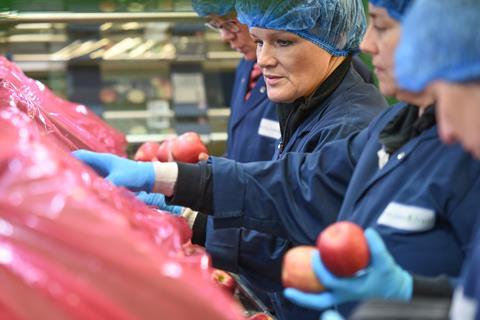
Food sector learning provider MDS has received a £450,000 grant to create a training programme for non-graduates and triple the number of its secondments in the food industry.
The campaign will focus on recruiting ex-military personnel and career changers to upskill the fresh produce sector.
MDS works with over 60 food and produce businesses in the UK to run its leadership & management training scheme for degree graduates, which will now be expanded to military service leavers with leadership experience.
Additionally, MDS will be introducing an operations & development scheme tailored to non-graduates already in the workplace. These will be hands-on roles such as on a production line with the opportunity to move into more senior roles.
“This funding is an exciting and long-planned step for MDS to expand our popular leadership training and attract others on a different work ladder with diverse perspectives and skill sets into our sector,” said Sapphira Waterson, COO at MDS.
“Giving ex-military personnel a route into the sector has been a passion of mine for both the opportunity it gives food supply chain businesses and those leaving the forces to develop a compelling career. As team players with a bias for decision making and completing tasks, ex-service personnel are a perfect fit for our fast-paced sector”.
MDS is calling on businesses to asses how they can benefit from this and strengthen their operations with new talent, as it looks to nearly triple the number of training placements available in food businesses to 220 placements each year.
MDS board member Richard Whittle said: “This is a real opportunity for food supply chain businesses to look at their operations as well as management level roles, particularly as the availability of labour in the industry changes.”
Whittle emphasised that the funding would only be available for a limited time so businesses should sign up as soon as possible to capitalise on this “golden opportunity”.
The government funding package was announced in March 2021 as part of the Budget, with the aim of tackling the national skills shortage.
Grace Duncan
NFU Scotland AGM 2022: Sustainability increasingly important for farm assurance
The Press and Journal – 11th February 2022
Sustainability will become an increasingly important component of farm assurance going forward, claim the leaders of three industry assurance bodies.
Speaking at the NFU Scotland virtual annual general meeting and conference, the chairs of Quality Meat Scotland (QMS), Red Tractor and Scottish Quality Crops (SQC) said farm produce buyers were increasingly asking for assurances about the sustainability of food produced on British farms.
SQC chairman Andrew Moir, who runs a contract farming business near Laurencekirk, said: “Increasingly sustainability is needing to be proven and audited, and we have customers wanting extras.”
As an example, he said Quaker Oats was requiring its growers to have a LEAF – Linking Environment and Farming – audit.
“This is not without its challenges and costs, and SQC will try and get things in place where there is just one audit,” added Mr Moir.
He called for the creation of an industry-wide sustainability strategy and said SQC, along with stakeholders in the arable sector, could co-ordinate this for growers to deliver a sustainability scheme.
Red Tractor chairwoman Christine Tacon, who formerly served as Groceries Code Adjudicator, agreed that sustainability was becoming increasingly important.
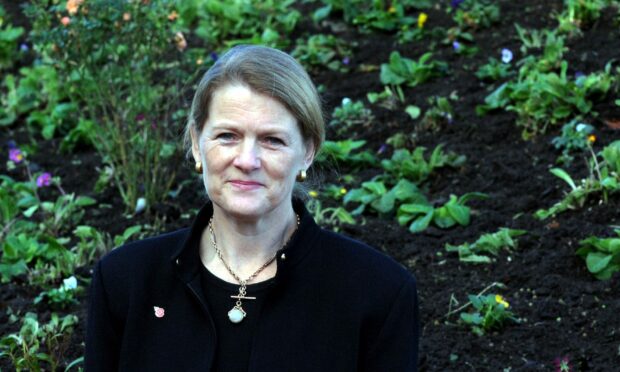
She said: “All down-stream users of our products are asking for worker welfare or sustainability standards, and even the banks are worrying about the carbon footprint of their loans.”
However, Ms Tacon acknowledged the challenges associated with measuring certain sustainability standards, such as the carbon footprint of a farm.
She added: “Working with AHDB and the NFU we came to the conclusion that three of the most popular carbon audit calculators came to a different answer for the same farm.”
QMS chairwoman Kate Rowell, who farms in Peebleshire, said further sustainability standards needed to be embedded into the schemes which govern the Scotch Beef, Scotch Lamb and Specially Selected Pork brands.
However, she said: “A big part of our standards are already sustainable so it’s just a case of highlighting this to our consumers.”
She acknowledged that farm assurance audits weren’t popular with farmers and crofters, but encouraged them to embrace their standards and be proud of them.
Ms Rowell added: “These schemes are voluntary but what we need to try and do is change the mindset for the farmers.
“We need to see it as a chance to showcase the good things that we do; we should be welcoming the fact that we can prove to the assessor that we are doing things right and prove to consumers that we are this fantastic industry.”
She said QMS was working to create an online hub for assurance scheme users to upload records and plans to make on-farm farm assurance assessments more streamlined.
Gemma Mackie
CAPI Releases Report on Supply Chain Efficiencies
Canadian Agri-Food Policy Institute (CAPI) – 27th January 2022
The Canadian Agri-Food Policy Institute (CAPI) announces the release of its latest Perspective Report, delivering critical insights on supply-chain efficiencies and competitiveness from UK Groceries Code Adjudicator Christine Tacon.
A healthy supply chain, where food can flow efficiently from farmers and processors, through retailers to consumers, is critical for Canada and Canadians,” says Tyler McCann, Managing Director of CAPI. “This report can inform the ongoing development of policies to ensure a strong, efficient and competitive marketplace for farmers, processors, retailers and consumers. Experience is a strong teacher, and CAPI is pleased to have this opportunity to glean from Christine Tacon’s experience, including her time as the UK. Groceries Code Adjudicator.”
Tacon filled the role as UK Groceries Code Adjudicator from 2013 to 2020. Her insights on competitiveness and supply-chain efficiencies come from her vast experience not only as a regulator, but also from running the largest farming business in the UK, as well as having worked in marketing and sales for M&M Mars and Fonterra.
“I trained as a production engineer and my experience in the grocery industry, particularly growing fresh produce, exposed some very inefficient ways of working with retailers. I started my role as the Groceries Code Adjudicator addressing the issues which could be easily resolved, I progressed to more systemic ones and ended up addressing corporate governance in the retailers,” says Tacon. “I demonstrated that collaboration along the supply chain builds resilience and encourages innovation; that competition fosters fairness; that regulation can work; and much, much more. These lessons come from real-world experience and it’s encouraging to be able to pass them along to CAPI.”
To read the report here in English or French
About CAPI The Canadian Agri-Food Policy Institute (CAPI) is the place for agri-food leaders to come together, share insights and advance ideas on emerging issues facing this important sector. Established as an independent, non-partisan and not-for-profit corporation in 2004 with an initial grant from the federal government, CAPI is guided by a diverse Board of Directors and an Advisory Committee and works extensively with partners to fulfil its mandate.
CAPI’s work reflects systems thinking, researching complex and interconnected food issues, bringing diverse voices to the table — from across agri-food supply chains, governments, researchers and among adjacent sectors. By providing reference points, source material and education for all stakeholders, CAPI is helping to ensure growth and prosperity in the agri-food industry for generations to come.
For media inquires, please contact:
Tyler McCann
Managing Director, CAPI (FR)
mccannt@capi-icpa.ca
(819) 639-6705
Al Mussell
Research Director, CAPI
al@agrifoodecon.ca
Women In Food & Farming – November Broadcast
Guest Speaker Jan England of England Marketing
“Women in Food and Farming” is a group of professional women in food, agriculture, and the land-based industries at all stages of their careers, who get together to discuss business issues, support each other via mentorship and advice, and help generate networks of contacts that might be useful to themselves and their businesses.
Founded in 2011 by Christine Tacon CBE, the group started back in 2011 with just five women and has now grown to over 500 members. Christine is known to many as the first Grocery Code Adjudicator and head of the Co-op’s farming business, she has just been appointed Chair of Assured Food Standards which operates the Red Tractor Assurance scheme amongst other roles.
In the November broadcast, we welcome guest speaker Jan England of England Marketing. They are a leading market research agency, specialising in research in the food, agriculture and environment sectors. They are also Company Partners of the Market Research Society and run The Research Hub, a facility for their clients to research, explore, develop and learn. On site they undertake product evaluation, taste testing and immersive research. They are also developing capabilities in biometric testing with Anglia Ruskin University.
Click below to sign up for Women in Food and Farming communications.
Women In Food & Farming - October Broadcast
Guest Speaker Judith Batchelar OBE. Special Advisor CR&S and Public Affairs Sainsbury’s.
“Women in Food and Farming” is a group of professional women in food, agriculture, and the land-based industries at all stages of their careers, who get together to discuss business issues, support each other via mentorship and advice, and help generate networks of contacts that might be useful to themselves and their businesses.
Founded in 2011 by Christine Tacon CBE, the group started back in 2011 with just five women and has now grown to over 500 members. Christine is known to many as the first Grocery Code Adjudicator and head of the Co-op’s farming business, she has just been appointed Chair of Assured Food Standards which operates the Red Tractor Assurance scheme amongst other roles.
On this month’s broadcast we are delighted to be joined by Judith Batchelar OBE.
 Judith was awarded an OBE in 2015 for services to farming and the food industry. She also sits on the government’s Food and Drink Sector Council, is a non-executive director of the Environment Agency and the Rugby Players Association and is a trustee of the Prince’s Accounting for Sustainability Project, as well as the Royal Botanic Gardens, Kew.
Judith was awarded an OBE in 2015 for services to farming and the food industry. She also sits on the government’s Food and Drink Sector Council, is a non-executive director of the Environment Agency and the Rugby Players Association and is a trustee of the Prince’s Accounting for Sustainability Project, as well as the Royal Botanic Gardens, Kew.
She has worked in the food and drink industry for more than 38 years and prior to joining Sainsbury’s she was a director at Safeway and also spent 12 years in the food division of Marks & Spencer. She currently is the Special Advisor on CR&S and Public Affairs for Sainsbury’s.
Click below to sign up for Women in Food and Farming communications.
Women In Food & Farming – September Broadcast
What Have We Learned In Our Ways Of Working From The COVID Pandemic…?
A quick insight from some of the Group Founders as to what they have found and differing ways of working from over the last 18mths.
“Women in Food and Farming” is a group of professional women in food, agriculture, and the land-based industries at all stages of their careers, who get together to discuss business issues, support each other via mentorship and advice, and help generate networks of contacts that might be useful to themselves and their businesses.
Founded in 2011 by Christine Tacon CBE, the group started back in 2011 with just five women and has now grown to over 500 members. Christine is known to many as the first Grocery Code Adjudicator and head of the Co-op’s farming business, she has just been appointed Chair of Assured Food Standards which operates the Red Tractor Assurance scheme amongst other roles.
In these current strange times, Beanstalk is very proud to offer our extensive platforms to allow Women in Food and Farming to continue their conversation and debate and to encourage new members ongoing to join them, be that on a virtual Broadcast basis.
The emergence of Covid-19 dramatically changed life and business as we knew it. Yet, despite all of the challenges, worry and fear that have accompanied this global health crisis, many professionals gleaned valuable insights over the past 18 months.
This is especially true in the Farming and Food sectors, which had to quickly adapt to sharing information about the ever-changing pandemic and adjust their businesses to suit. What have we learned most?
- Kindness and compassion matter most.
- Teams need a shared sense of purpose.
- There’s no such thing as ‘Normal’.
- Flexibility and transparency lead to productivity.
- Being flexible and adaptive is key.
- We are all deeply interconnected.
- There is always a way to move forward.
- Every business needs an online brand.
- In-Person Interactions Are Crucial.
- Strong communication is essential.
Click below to sign up for Women in Food and Farming communications.
Canada food retail body issues own call for grocery code of conduct
Just Food – 28th May 2021
Canada’s largest retail trade body has joined calls for a grocery code of conduct – although its demands have sparked concerns at one leading manufacturers’ association.
The Retail Council of Canada, which represents Canada’s largest food retailers, yesterday (27 May) announced it wants a “food industry code of practice” and unveiled a new “alliance” of supplier and retail organisations that would look to devise the new system.
Food manufacturers operating in Canada have been calling for years on the country’s government to set up a code of practice. Those demands intensified last summer after some large retailers introduced new fees on suppliers.
In March, Empire, Canada’s second-largest grocery retailer – operating chains including Sobeys – and the trade group Food, Health & Consumer Products of Canada (FHCP), which represents Canada’s food manufacturing sector, set out plans for a Grocery Supply Code of Practice.
Under their plans, submitted to a government working group, a government adjudication system would be set up to manage complaints of unfair practices under the code.
The alternative set of ideas drawn up by the new Canadian Food Industry Collaborative Alliance appear to foresee a different role for government. A statement issued yesterday by the Retail Council of Canada on behalf of the Alliance read: “We believe a Canadian Food Industry Code of Practice must be developed by industry for industry and must reflect and respect the unique elements of Canada’s food supply chain and federated system of government.
“We are therefore proposing that industry work together to design, lead and participate in a consultative process to develop the Code of Practice and to design an oversight framework to support adherence to its provisions. The Code of Practice would not be embedded in regulation, thereby providing flexibility for it to evolve. However, participation would be mandatory.”
Under the Alliance’s plans an “industry steering committee” is to be formed to develop the terms of the code. The committee would include representatives from retailers, producers, processors and government, the statement read. A timetable put forward foresees the code being put together by December next year.
In response, FHCP said it was “pleased that the association representing the chains that control more than 80% of grocery sales in Canada finally agrees that our food supply system must be based on transparency and fair treatment as FHCP and Empire formally proposed in March”.
However, it added: “The proposed consultation approach and timelines duplicates the current engagement underway by the Federal-Provincial-Territorial government Working Group, and asks Canadian taxpayers to fund a brand new process that will take two years and only start in the fall. We are concerned that this proposal serves to thwart government action, attempts to address an array of complex food supply issues with a one-size-fits-all approach and fails to draw on lessons learned from existing international models. Decades of experience in Canada and around the world has shown that big grocers will not voluntarily regulate their own unfair behaviour.”
The code put forward by FHCP and Empire drew on experience outside Canada, most notably the UK Groceries Supply Code of Practice.
By contrast, the new Alliance, which comprises six organisations that also include The Canadian Federation of Independent Grocers and manufacturers’ association FBC-ABC, has stated “any Code of Practice must be developed in Canada for Canada”.
FHPC said yesterday: “When crafting our proposed Grocery Code of Practice, FHCP and Empire relied heavily on the advice, knowledge and expertise of the former UK Adjudicator, Christine Tacon, who advised us to take a practical and simple step that would have the most significant and positive impact on the supply chain.
“Our goal has always been to introduce a code between large retailers and manufacturers, where most of the challenges reside. Our Code was crafted to suit the needs of the Canadian market while taking lessons from relevant international precedent, most notably the UK Groceries Supply Code of Practice, which remains the most effective model. Our focused approach is an important step forward and does not attempt to solve every supply chain challenge.”
Dean Best
Red Tractor leader to discuss food and farming challenges
Eastern Daily Press – 9th April 2021
 The Norfolk-born businesswoman who now leads the nation’s largest farm assurance scheme will discuss the future challenges facing the food industry during an online event.
The Norfolk-born businesswoman who now leads the nation’s largest farm assurance scheme will discuss the future challenges facing the food industry during an online event.
Christine Tacon, newly-appointed chairman of the Red Tractor farm and food assurance scheme, will speak at an online event on Tuesday, part of series of lectures and debates to celebrate the 175th anniversary of the Royal Agricultural University (RAU).
She was previously the country’s first groceries code adjudicator (GCA), a role created to ensure the largest retailers treat their direct suppliers lawfully, to investigate complaints and arbitrate in disputes.
Her career also includes senior marketing positions for organisations including Mars, Vodafone and Anchor, now Fonterra. She ran the Co-operative Group’s farming business for more than 10 years and was made a CBE for services to agriculture in 2004.
She is currently a director of the AF Group, formerly Anglia Farmers, a £250m purchasing co-operative based at Honingham Thorpe near Norwich.
She is also chairman of MDS Limited, a training provider for graduates in the fresh food and produce industry, and a mentor to 2020 RAU graduate Max Pitman who will join her to speak at the event.
The free event runs from 6pm on Tuesday, April 13, and is open to all.
- To register, see the Eventbrite booking page.
Women In Food & Farming - March Broadcast
Views on the Biggest Challenges Facing Agriculture in the next 10 years
“Women in Food and Farming” is a group of professional women in food, agriculture, and the land-based industries at all stages of their careers, who get together to discuss business issues, support each other via mentorship and advice, and help generate networks of contacts that might be useful to themselves and their businesses.
Founded in 2011 by Christine Tacon CBE, the group started back in 2011 with just five women and has now grown to over 500 members. Christine is known to many as the first Grocery Code Adjudicator and head of the Co-op’s farming business, she has just been appointed Chair of Assured Food Standards which operates the Red Tractor Assurance scheme amongst other roles.
Click below to sign up for Women in Food and Farming communications.
Aldi to fund 60 fresh produce management trainees
The Grocer – 10th March 2021

Aldi is to fund 60 management apprenticeships in the fresh produce industry over two years to help nurture talent in the sector.
The move is in partnership with fresh produce management training scheme MDS, chaired by former GCA Christine Tacon.
MDS’s graduate schemes aim to create future fresh produce industry leaders and help tackle a shortage of recruits in the sector. Candidates gain experience in four different businesses as they work towards a leadership and management qualification accredited by the Chartered Management Institute.
Aldi has worked with MDS since 2016, and taken on five permanent employees from previous rounds of the training scheme. It plans to support two existing employees through the apprenticeship programme this year.
The 60 new places are to be paid for using part of Aldi’s Apprenticeship Levy. It will bring the supermarket’s funding for the scheme to close to £1m over six years.
The 60 will be split into four cohorts, with the first to start in April this year. Trainees will learn the ropes in a range of positions, including supply chain, marketing, technical and operations.
“Our combination of on-the-job learning, alongside a chartered qualification, equips trainees with invaluable management and leadership skills to help them begin fulfilling careers within the food and fresh produce industries, which are crying for out for ambitious, capable new recruits,” said Tacon.
“Aldi’s ongoing support is testament to the quality of graduates that the scheme produces, and we look forward to continuing to work with them.”
Aldi UK recruitment director Kelly Stokes said: “The MDS scheme is highly respected and provides an excellent pathway for promising talent to achieve their potential within the sector, which is why we are pleased to be funding a further 60 apprenticeships over the next two years.
“The success of the programme is evident, with a number of MDS graduates now employed at Aldi to help us continue to deliver high-quality fresh produce at unbeatable prices.”
Interested applicants should visit mds-ltd.co.uk.
Women In Food & Farming - Unofficial World Record
“Women in Food and Farming” is a group of professional women in food, agriculture, and the land-based industries at all stages of their careers, who get together to discuss business issues, support each other via mentorship and advice, and help generate networks of contacts that might be useful to themselves and their businesses.
Founded in 2011 by Christine Tacon CBE, the group started back in 2011 with just five women and has now grown to over 500 members. Christine is known to many as the first Grocery Code Adjudicator and head of the Co-op’s farming business, she has just been appointed Chair of Assured Food Standards which operates the Red Tractor Assurance scheme amongst other roles.
Click below to sign up for Women in Food and Farming communications.
Brexit opportunity prompts MDS investment
Fresh Produce Journal – 26th January 2021
More young people are looking to pursue career in food, reports grad training organisation, with Brexit expected to boost efforts to nurture homegrown talent
Agrifood graduate training organisation MDS has reported “unprecedented” demand from graduates as well as new member companies over the past 12 months.
Its chair, the former groceries Code Adjudicator Christine Tacon, said she expects to see no levelling off in interest from companies looking to invest in developing graduate talent, nor in young people seeking a long-term future in the sector.
“I also predict that changes forced by Brexit will bring further opportunity for MDS and our members,” she said. “We are seeing signs that an increased number of modern facilities in Eastern Europe want UK-trained management.
“Some talented, skilled younger people have returned home to their countries of origin and this has resulted in a renewed interest amongst employers for nurturing homegrown future leaders.”
She said the upsurge in demand, coupled with the Covid-related reduction in normal expenditure on accommodation and travel during 2020, has given MDS the scope to bring some planned expansion investments forward.
“Our board has made the decision to invest in systems and personnel to prepare us for a doubling in graduate applications and secondment placements with member companies, and also a continuing rise in the number of member companies,” she said. “We have, therefore, invested in software and hardware upgrades, as well as our digital and communications capabilities.”
The MDS programme spans two years, with each graduate trainee undertaking four different six-month secondments in a wide range of roles and member companies.
MDS currently has 66 graduates on the scheme – its highest number since the organisation was founded by three growers in 1986. In the past year it has increased its member companies from 48 to 58 businesses in the agrifood and fresh produce sector.
“The food sector is now being recognised as a secure and diverse sector, and one that ensures secure, long-term employment for young graduates,” she said. “This has resulted in 2020 being our busiest year for graduate applications with a richly diverse range of degrees.”
She added that MDS has built a “strong reputation” for delivering high quality graduate training and a two-year secondment programme that produces “highly skilled and adaptable middle management employees”.
“The confidence member companies have gained in our ability to deliver what the sector needs has resulted in a marked rise in many replacing their own company-run graduate training schemes with participation in MDS’s programme,” she said.
MDS provides graduate training across the whole supply chain of vegetables, salads, fruit, flowers, plants, arable and prepared food products not only based in the UK but also for operations in many countries around the world.
Tacon appointed chair of Red Tractor Assurance
The Grocer – 21st December 2020
 Former Groceries Code Adjudicator Christine Tacon has been appointed chair of the Red Tractor Assurance scheme.
Former Groceries Code Adjudicator Christine Tacon has been appointed chair of the Red Tractor Assurance scheme.
Tacon, who stood down from her GCA role in October after more than seven years at the helm, replaces Lucy Neville-Rolfe, whose three-year term ended in November.
Red Tractor said Tacon would bring “proven credentials” from a career spanning “across the supply chains of food and farming”.
“[She] will be an enormous asset in helping Red Tractor fly the flag for our industry and deliver on its core purpose to reassure consumers,” a spokesman said.
Tacon’s appointment comes a matter of months after her predecessor Baroness Neville-Rolf drew criticism from farmers on social media by not backing amendments to the Agriculture Bill which were intended to strengthen standards of post-Brexit imports.
Farming bodies have welcomed the appointment. The NFU’s deputy president Stuart Roberts said: “We are delighted Christine Tacon has been appointed to this important role. She brings a wealth of industry experience to the Red Tractor table from across the food and farming sectors and from her work with government.
“Having worked closely with Christine as the GCA, Red Tractor will benefit hugely from her strong leadership, collaborative relationships that she works so hard to develop, and an ability to drive the industry forward.”
Why the new Groceries Code Adjudicator might be just what the industry needs
Tacon has held roles across food and retail over more than three decades.
Having started her career as an engineer, she then moved into marketing positions at Mars Confectionery, Vodaphone and Anchor (now known as Fonterra).
For 11 years until 2012, Tacon headed up the Co-operative Group’s farming business. She turned around the £60m turnover business from a £6m loss in 2000 to a £6m profit by 2010.
She was appointed as the first Groceries Code Adjudicator by the coalition government in 2013 thanks to her experience across food, retail and the farming industry.
She will continue to serve as the chair of the BBC Rural Affairs Committee and fresh produce management training scheme MDS, as well as her non-executive director role at agricultural group Anglia Farmers.
Speaking of her new appointment, Tacon said: “This role builds on my experience in farming, the food chain, working with government and most of all with consumers.
“With uncertainty on standards of food imported into the UK post-Brexit, this is a great time to be working on British standards and ensuring they are fit for purpose for all its stakeholders.”
Henry Sandercock
BBC Farming Today Red Tractor Interview
Farming Today – 18th December 2020

Tacon named new chairman of Red Tractor scheme
Farmers Weekly – 18th December 2020
Former groceries code adjudicator Christine Tacon has been appointed as the new head of Red Tractor.
Ms Tacon has been named as the chairman of Assured Food Standards (ASF), the company that operates the Red Tractor Assurance scheme.
She will take up the role on 1 January 2021, replacing Dame Lucy Neville-Rolfe, whose term ended last month.
Baroness Neville-Rolfe announced that she would step down at the end of her three-year term on 12 November.
The announcement came days after Farmers Weekly exclusively revealed that, as a Conservative peer, she voted against amendments in the Agriculture Bill tabled to protect British farmers from imports produced to standards not permitted in the UK. Her actions sparked a huge backlash among farmers.
Until October 2020, Ms Tacon was a government regulator responsible for overseeing the implementation of the Groceries Supply Code of Practice by large grocery retailers, who are designated by the Competition and Markets Authority, in their dealings with direct suppliers.
BBC role
She currently serves as the chairman of the BBC Rural Affairs Committee and MDS – a management training scheme for the food and fresh produce industry. She is also a director of the AF Group, a £250m purchasing co-operative for agri-businesses.
Ms Tacon started her professional career as an engineer and then moved into marketing, working at organisations including Mars, Vodafone and Anchor (now Fonterra). For more than 10 years, she ran the Co-operative Group’s farming business – the largest of its kind in the UK. In 2004, she was awarded a CBE for services to agriculture.
Ms Tacon said: “I’m really looking forward to joining Red Tractor. This role builds on my experience in farming, the food chain, working with government and, most of all, with consumers.
“With uncertainty on standards of food imported into the UK post-Brexit, this is a great time to be working on British standards and ensuring they are fit for purpose for all its stakeholders.”
A spokesman for the ownership body of Red Tractor, comprising farming unions, the AHDB, Dairy UK and the British Retail Consortium, responsible for the appointment, said: “Red Tractor’s standards are the bedrock of British agriculture. They have helped establish the UK’s food and farming industry as the benchmark for quality across the world.
“Now more than ever is the time to demonstrate strong leadership, to protect the integrity of the food chain and the agricultural standards that we have built up in Britain over the decades.”
‘Fly the flag’
He added: “Christine’s proven credentials, and a career that spans across the supply chains of food and farming, will be an enormous asset in helping Red Tractor fly the flag for our industry and to deliver on its core purpose to reassure consumers.”
Assured Food Standards is a not-for-profit company, owned and created by the British farming and food industry, but operating independently.
AFS own and operate Red Tractor Assurance, the largest farm and food assurance scheme in the UK. Established in 2000, it has grown to become a world-leader in food chain assurance and uniquely covers food safety, traceability, animal welfare and environmental protection.
Philip Case
The UK’s first Groceries Code Adjudicator is appointed chair of Red Tractor Assurance
 Christine Tacon CBE has been appointed Chair of Assured Food Standards who operate the Red Tractor Assurance scheme.
Christine Tacon CBE has been appointed Chair of Assured Food Standards who operate the Red Tractor Assurance scheme.
The former Groceries Code Adjudicator takes up the role on the 1st January 2021, replacing Dame Lucy Neville-Rolfe, whose term ended last month.
Ms Tacon joins Red Tractor with decades of experience as a leader and advocate for the British food and farming industry and with an extensive background in change management, regulation and the food chain.
Christine started her professional career as an engineer and then moved into marketing working at organisations including Mars, Vodafone and Anchor (now Fonterra). For more than 10 years, she ran the Co-operative Group’s farming business- the largest of its kind in the UK. In 2004, she was awarded a CBE for services to agriculture.
She currently serves as the Chair of the BBC Rural Affairs Committee and MDS – a management training scheme for the food and fresh produce industry. She is also a Director of the AF Group, a £250m purchasing co-operative for agri-businesses.
Until October 2020, Ms Tacon was a government regulator responsible for overseeing the implementation of the Groceries Supply Code of Practice by large grocery retailers, who are designated by the Competition and Markets Authority, in their dealings with direct suppliers.
A spokesperson for the Ownership Body of Red Tractor, comprising of the Farming Unions, AHDB, Dairy UK and the BRC, responsible for the appointment, commented: “This is a pivotal time for UK agriculture, with the UK’s departure from the EU and the uncertainties of future trade deals.
“Red Tractor’s standards are the bedrock of British agriculture. They have helped establish UK’s food and farming industry as the benchmark for quality across the world. Now more than ever is the time to demonstrate strong leadership, to protect the integrity of the food chain and the agricultural standards that we have built up in Britain over the decades.”
“Christine’s proven credentials and a career that spans across the supply chains of food and farming, will be an enormous asset in helping Red Tractor fly the flag for our industry and to deliver on its core purpose to reassure consumers.”
Christine Tacon CBE said: “I’m really looking forward to joining Red Tractor, this role builds on my experience in farming, the food chain, working with government and most of all with consumers. With uncertainty on standards of food imported into the UK post Brexit, this is a great time to be working on British standards and ensuring they are fit for purpose for all its stakeholders.”
Assured Food Standards (AFS) is a not-for-profit company, owned and created by the British farming and food industry but operating independently. AFS own and operate Red Tractor Assurance, the largest farm and food assurance scheme in the UK. Established in 2000, it has grown to become a world-leader in food chain assurance and uniquely covers food safety, traceability, animal welfare and environmental protection.
2020: a year of great progress for the Drop and Drive Claims Workgroup
Simply Supply Chain Blog – 27th October 2020
Despite the considerable impacts on the grocery supply chain this year, the Drop and Drive Claims Workgroup has continued to make great progress during 2020 and we were able to celebrate some incredible results at the final review of the year last week. Our 20+ supplier members were joined by Christine Tacon; outgoing Grocery Code Adjudicator, Mark White; her replacement plus senior managers representing Morrisons and Asda, for yet another open and collaborative session.
After 5 years of committed campaigning the workgroup was able to look back on some outstanding achievements:
- Total claims reduced by 90% vs 2014, recovering c.£13m p.a. for members Tesco – full implementation of their revised systems and processes, now achieving comparable levels of receipting accuracy, without the need for GFR
- 7 of the top 10 retailers now engaging with GFR
- Over £2 million of outstanding debt recovered from retailers due to historical claims disputes
- Collaborative workshops with Tesco and ASDA to continue to develop supply chain initiatives
- Awarded finalists’ in 2 award categories 2020 – Supply Chain Excellence and the CILT
- Endorsements from the Grocery Code Adjudicator and major retailers
“I appreciate all the work that the members of the SSC working group put into addressing an issue which I had raised as a serious concern. They got under the skin of the issue to work on practical solutions with retailers. In so doing, many other suppliers have benefited from their work and the GCA survey has shown a continued improvement in performance in what has been a longstanding problem.” Christine Tacon, Grocery Code Adjudicator

With Christine and now Mark White’s continued support we are looking forward to making even further progress in 2021 building on the collaborative support from the retailers and our suppliers to reduce errors, whilst improving efficiency and availability throughout the supply chain.
Jonathan Kittow, Chairman of the Drop and Drive Claims Workgroup comments, “we wish to thank Christine for all her support and work with the supplier group since its inception. We are extremely proud of the results we have achieved as a group and it is testament to true collaboration by suppliers and retailers alike to innovate.”
The 2021 programme is now confirmed with key focus areas:
- Maintain 90%+ reduction of disputed deductions from Top 10 retailers by end 2021
- Standardise adoption of the new claims dispute resolution process across retailers
- Establish a supplier best practice process for recovering valid GRNI claims
- Develop a retailer best practice returns process to minimise waste and loss
- Ongoing GFR dialogue with Tesco, Asda, Sainsbury’s, Morrisons, Co-op and M&S
- Collaborative workshops with a minimum of three retailers
- Establish best practice supplier standards to reduce receipting errors in DC and store
- Engage any ‘new’ GCA-remit retailers and collaborate on new focus topics including:
- Supply chain forecasting and promotional management improvements
To find out more about the Drop and Drive Workgroup and the 2021 programme, please visit our Events & Memberships page or get in touch with Jonathan Kittow, Chairman of the Drop and Drive Workgroup on hello@simply-sc.com
Tacon enters final week as GCA
Fresh Produce Journal – 28th October 2020
Groceries Code Adjudicator Christine Tacon has announced she will step down from the role at the end of this week, handing over to successor Mark White.
Tacon, who was the inaugural adjudicator, setting up the organisation seven years ago and establishing it as the arbiter of supermarket-supplier relations, was due to step down earlier this year but agreed to stay on to oversee issues arising out of the Covid pandemic.
However as no specific Covid-related issues have been reported, she said it was now the right time to step aside.
“As it is now over six months since supply arrangements had to be reviewed and revised to ensure essential groceries reached the supermarket shelves at the onset of the lockdown I would not expect any supplier now to raise an issue based on those actions. As a result I can now step down and formally hand over to Mark.”
Tacon said the response from both retailers and suppliers to the significant challenge of the Covid emergency had demonstrated that the code provided the flexibility both parties needed to maintain the supply of groceries to consumers in all circumstances.
“I am aware that sales of certain essential products appear to be accelerating again but I am confident this development will be well handled with proven, effective processes and ways of working established,” she added.
The GCA’s Annual Reports have shown significant improvement in the groceries sector throughout Tacon’s seven years in office, with suppliers reporting year-on-year improvements in retailer behaviour.
“I am very proud of the progress we have achieved working together in the sector since I became GCA in June 2013 and I will continue to watch how all the retailers maintain good levels of compliance under Mark White’s leadership,” she concluded. “I wish him all the best in what has for me been a very fulfilling role.”
In August Tacon discussed her time as adjudicator as well as her wider career in a special episode of FPJ Stories, which you can see below.
Christine Tacon marks final week in role as GCA
26th October 2020 – GOV.UK
Christine Tacon, the UK’s first Groceries Code Adjudicator, has announced she will step down from the role at the end of this week, handing over to her successor Mark White.
She said:
I agreed to stay on beyond the end of my second term to oversee any COVID-related issues that may have arisen in the early days and weeks of the pandemic. That responsibility has now been discharged.
I urged suppliers to bring any Code-related issues to me without delay and I have been maintaining regular contacts with the retailers’ Code Compliance Officers to monitor whether any issues linked to COVID had been raised with them. None have been reported.
As it is now over six months since supply arrangements had to be reviewed and revised to ensure essential groceries reached the supermarket shelves at the onset of the lockdown I would not expect any supplier now to raise an issue based on those actions. As a result I can now step down and formally hand over to Mark.
Ms Tacon said the response from both retailers and suppliers to the significant challenge of the COVID emergency had demonstrated that the Code provided the flexibility both parties needed to maintain the supply of groceries to consumers in all circumstances.
I am aware that sales of certain essential products appear to be accelerating again but I am confident this development will be well handled with proven, effective processes and ways of working established.
The GCA’s Annual Report had shown significant improvement in the groceries sector throughout her seven years in office, with suppliers reporting year-on-year improvements in retailer behaviour.
I am very proud of the progress we have achieved working together in the sector since I became GCA in June 2013 and I will continue to watch how all the retailers maintain good levels of compliance under Mark White’s leadership. I wish him all the best in what has for me been a very fulfilling role.
Christine Tacon fires parting shot over second wave supermarket delistings
The Grocer – 23rd October 2020

Groceries Code Adjudicator Christine Tacon has fired a warning shot to retailers facing a new demand spike because of further lockdown measures, saying that what was acceptable delisting behaviour in March would not wash with the watchdog in the second wave.
Tacon, who is to stand down next week after seven years at the helm, said that after an acceleration in demand for essential items she had warned supermarkets they risked breaching the code if they sparked a further round of delistings without adequate notice.
The first lockdown in March was accompanied by a raft of delistings as retailers moved to rationalise their ranges and up production.
Tacon, who was forced to intervene in a bid by some supermarket bosses to suspend GSCOP to allow them to delist products more quickly without facing potential huge fines, said she had made it clear to code compliance officers that March was a “one-off”.
“When it happened in March the coronavirus situation, which was such a shock to the industry, meant suppliers were in some cases given very short notice. The situation at the time was unpredictable.
“Speaking to suppliers and retailers now there does appear to be another uptick but my message to CCOs is that what was acceptable in March is not acceptable now.”
Tacon, whose successor Mark White will take over the job having worked as her assistant since he was appointed in March, added: “I urged suppliers to bring any code-related issues to me without delay and I have been maintaining regular contacts with the retailers’ code compliance officers to monitor whether any issues linked to Covid had been raised with them. None have been reported.
“I am aware that sales of certain essential products appear to be accelerating again but I am confident this development will be well handled with proven, effective processes and ways of working established.”
Tacon praised the response from both retailers and suppliers to the emergency and said it had demonstrated that GSCOP provided the flexibility both parties needed to maintain the supply of groceries to consumers in all circumstances.
“I am very proud of the progress we have achieved working together in the sector since I became GCA and I will continue to watch how all the retailers maintain good levels of compliance under Mark White’s leadership. I wish him all the best in what has for me been a very fulfilling role.”
MDS and Redfox in graduate push
Fresh Produce Journal – 17th September 2020
Redfox and Management Development Services (MDS) have announced a new initiative to help MDS graduates secure roles with horticultural businesses.
MDS is the leading training provider in the fresh produce sector, and has expanded steadily as companies seek to safeguard their future by attracting and providing training for the highest-calibre recruits. A number of the latest crop of graduates will hit the job market this year looking for roles in technical, operational and commercial capacities.
Today, the programme encompasses the whole supply chain of vegetables, salads, fruit, flowers, plants, arable and prepared food products, both in UK and globally. Graduates of the MDS scheme all complete four secondments over two years within these types of businesses, coming away with the skillset to become leaders, forward thinkers and proactive team players, proficient in key areas such as negotiation and problem solving, communication and leadership.
Fresh food recruitment consultancy Redfox explained that under the new initiative it will be “deploying its significant UK and international networks to assist MDS graduates to source new roles over and above the existing MDS networks.” The company will be running a series of marketing initiatives to promote the graduates to potential new employers and to promote the aims of MDS.
MDS chair Christine Tacon said: “It is imperative that the sector looks at the amazing individuals completing the MDS scheme who will be to their benefit. They have the potential to be future leaders for the sectors as has been proven numerous times before with previous MDS graduates.”
Redfox director Max MacGillivray added: “A number of our clients are ex-MDS and the difference that they have made to businesses throughout their career has been significant. Today there is a great opportunity for forward-thinking companies to duplicate that success by taking on an MDS graduate.”
FPJ Stories: Christine Tacon
27th August 2020
In Episode Two, Michael talks to outgoing Groceries Code Adjudicator Christine Tacon about her years transforming relations between suppliers and supermarkets, her views on the future of the food industry and what more can be done to help the next generation of fresh produce professionals realise their dreams. She also talks about some fascinating personal interests, a successful sporting sibling and what she plans to do next.
Why the new Groceries Code Adjudicator might be just what the industry needs
The Grocer – 21st July 2020
 So the government has turned to Mr White to try to ensure a level playing field between suppliers and the supermarkets, with the belated appointment of a new Groceries Code Adjudicator.
So the government has turned to Mr White to try to ensure a level playing field between suppliers and the supermarkets, with the belated appointment of a new Groceries Code Adjudicator.
Alas, Boris hasn’t seconded Harvey Keitel from his Direct Line ads to bang a few heads together, much as he would have been perfect for the job in many ways.
Instead, with the appointment of former Compass Group lawyer Mark White to the Adjudicator role, ministers appear to have gone for someone who knows the law inside out, even if his CV suggests he will have much to learn about some of the darker practices of the grocery trade.
Tacon herself has spoken many times in the past about how differently the past seven years would have turned out for the GCA had the job been handed to a retired judge.
While White may not be that, he is, as well as a non-exec chair of a cyber protocol employee reference checking company, also a member of tribunals used to hearing appeals from decisions by Financial Conduct Authority.
This suggests someone who will be very familiar with legal processes but not necessarily with a strong background in food, despite his time as legal counsel for foodservice giant Compass Group.
In contrast, Tacon took on the role after 11 years running the Co-operative Group’s farming business – which was to become one of two companies she later investigated, along with Tesco. Tacon’s style has always been much more about nudging and cajoling retailers to do the right thing, albeit with the threat of the big stick always lurking in the background, rather than surrounding herself with armies of lawyers.
The new appointment may send alarm bells for suppliers who have benefited from a collaborative approach around key issues such as delay in payments, drop and drive charges and forecasting problems, which could have become mired in years of expensive legal delays had Tacon chosen a different tack.
That said, there is a real opportunity for the new Adjudicator to make his mark – if he and the government have the desire to maintain the profile of the GCA, rather than allow supermarkets to slowly get back to their old tricks.
Just last week the government’s own, typically-delayed review found the Adjudicator’s role was still needed and had been “highly effective”.
Yet some have been alarmed at Tacon’s recent moves to embed self-regulation within the supermarkets, querying the suggestion that it’s a case of ’job done’ for the Adjudicator. Sadly, the brutal financial situation facing retailers and suppliers in the months and years to come is likely to prove that is anything but the case.
Tacon has already been forced to intervene to try to stop supermarkets having parts of GSCOP waived during the coronavirus outbreak, so they could delist companies more speedily without fear of intervention.
With suppliers already locked in talks on what promises to be a continued hard round of delistings, suppliers want a GCA with more teeth, not less.
So while Tacon has undoubtedly achieved huge strides on those big picture issues, an experienced arbitrator with an eye for the legal detail may be just what suppliers are crying out for.
The GCA has other unfinished business, too. How long can the government defend a situation where the GCA polices the major supermarkets – and the likes of B&M – but not Amazon? White’s biggest challenge, however, lies in GSCOP itself, with its strengths and weaknesses arguably both lying in its many grey areas.
It is perhaps vulnerable to retailers out to exploit badly trained suppliers. But it is also flexible enough to allow a charismatic negotiator like Tacon to achieve concessions from retailers based on common sense, not the strict letter of the law.
Grocery trading has – and always has been – full of grey areas, which is part of what makes it so innovative and exciting.
Let us hope the new man is not too whiter than white to put his own stamp on the job.
Ian Quinn
GCA still needed to maintain retailer compliance
Food Manufacturer – 17th July 2020
The Groceries Code Adjudicator (GCA) is still required to ensure retailers comply with the Groceries Supply Code of Practice (the Code), according to a Government review.
The review covered the period from 1 April 2016 to 31 March 2019 and assessed the GCA’s performance based on evidence from a number of stakeholders.
IN a foreword to the review, parliamentary under-secretary of state for small business, consumers and labour markets Paul Scully said, “The Government agrees with the overall evidence provided in response to the Review that there is still a need for the GCA to ensure Code compliance and encourage best practice.
The Government will therefore maintain the GCA and ensure it is funded and Statutory Review of the Groceries Code Adjudicator 2016-2019 resourced to carry out its statutory functions under the Groceries Code Adjudicator Act 2013.”
NFU response
National Farmers Union president Minette Batters welcomed the announcement and evidence that suggested there is still a need for the GCA in order to maintain retailer compliance with the Code.
“Since taking on the role in 2013, Christine Tacon has been essential in improving relationships between large retailers and their direct suppliers, ensuring regulated retailers are more accountable and honest in their dealings with their suppliers. This has helped the industry see a culture change that is driving fair and transparent supply chains,” she added.
“As we begin to leave the most disruptive period the food and farming sectors has faced, it is critical that the next GCA continues to build on this excellent progres and we look forward to working closely with Christine’s successor.”
However, the review pointed out that some suppliers were still reluctant or unwilling to report issues to the GCA – despite an overall willingness increases compared to 2014.
Significant breeches reported
While the number of suppliers who reported a Code-related issue fell (41% of respondents), they still felt there were a significant number of breaches. As a result, respondents called for the GCA to demonstrate a willingness to take on supermarkets by greater use of its investigative powers.
THe GCA planned to tackle these issues by launching the Code Confident campaign, which encourages suppliers to know the Code, get trained and speak up to the GCA and large retailers.
Paul Scully added: “The views and comments expressed clearly show that the GCA is a valued and trusted body which continues to make a real difference to the groceries supply chain.”
Meanwhile, food and drink suppliers have been granted more power on the negotiating table after seven years of successful regulation in the groceries sector, according to the existing Groceries Code Adjudicator (GCA).
Groceries Code Adjudicator still needed and ‘highly effective’, says review
The Grocer – 16 July 2020

The Groceries Code Adjudicator is still needed to ensure retailer compliance with Groceries Supply Code of Practice, the government’s latest review of the body has concluded.
The GCA will therefore be maintained with funding to continue policing the code, according to the statutory review, which assesses the ongoing need for the role every three years.
“The GCA continues to be highly effective in enforcing the Code and in exercising its powers,” the report published this week concluded.
The executive summary said: “The Government will therefore maintain the GCA and ensure that the office is funded and resourced to carry out its statutory functions under the Groceries Code Adjudicator Act 2013.”
The report concludes there should be no change to the maximum fine the Adjudicator can impose and no new restrictions on the information the Adjudicator can consider in deciding whether to launch an investigation.
Current Adjudicator Christine Tacon, who is due to hand over to an as-yet unnamed successor, welcomed the conclusions. “This is a highly positive report that recognises the importance of the GCA in creating a more level playing field for the groceries sector,” she said.
However, critics have slammed the report for being a long time coming, given it has brought with it no changes to the Adjudicator’s remit.
The review covers the period April 2016 to March 2019, taking in 85 responses from a range of shareholders.
A source told The Grocer: “The review was until the end of March 2019, it is now July 2020 and the conclusion is everything is highly effective, we’re not going to change anything and it’s all working fine. There is no reason why that had to take 17 months.
“There has been impatience within the sector. In the review, a lot of people wrote in saying more retailers should be covered, so a lot of people have been waiting to see whether the government is going to take the opportunity of the review to change the remit and that has not happened.”
The last review, covering 2013 to 2016, came with a parallel call for evidence on whether the remit should be changed.
“People have not been waiting to find out whether the GCA is working or not – they know it is,” said the source. “What they wanted an answer to was: please can we get some more retailers covered and dairy processors covered and all the other things they’ve been asking for?”
Ged Futter, director of GSCOP training consultancy The Retail Mind, said: “It’s certainly a report that has taken an age to come out. It talks about the 2019 GCA annual survey and there has been a 2020 survey which has come out while we’ve been waiting, so the data isn’t even up to date.
“And we’re still waiting for the new GCA to be announced. Christine Tacon has said whoever is coming in will work as the deputy GCA alongside her. Well, when are they going to start?”
A BEIS spokesman said: “The statutory review focused on the performance of the Groceries Code Adjudicator and considered the views of suppliers, retailers and trade representatives who were strongly supportive of the work of the GCA.”
Steve Farrell
GCA welcomes findings of second statutory review
Christine Tacon, the Groceries Code Adjudicator, has warmly welcomed the findings of the Government’s Statutory Review of the GCA’s work between April 2016 and March 2019.
She said: “This is a highly positive report that recognises the importance of the GCA in creating a more level playing field for the groceries sector.
“I am grateful for the acknowledgement that my pro-active approach as well as the knowledge and experience I brought to the role have led to fairer practices across all the regulated retailers. This was the mission I set myself when I became GCA 2013 and it good to see that recognised by those individuals and organisations that responded to this statutory review.
I am particularly grateful for the comments that my team and I have been approachable, professional and influential in driving the culture change that has achieved progress. We all take great pride in being able to have made a difference.”
Public Release. View in full here.
Tesco responds to ‘speculation’ around Aldi ‘price war’ as deadline looms
The Grocer – 9 July 2020
Tesco has insisted its latest push towards everyday low prices is not a ‘price war’ and rejected claims suppliers haven’t been given enough time to respond.
The supermarket unveiled its latest pricing strategy last month, telling branded suppliers they would be expected to match Aldi prices, and promotions would be canned unless they come under its Clubcard loyalty scheme.
Suppliers claimed last week they had been given just days to agree to drop their prices, with one predicting the upcoming negotiations would lead to “plenty of blood on the carpet”.
However, writing in The Grocer this week, Tesco chief product officer Andrew Yaxley said the supermarket had been talking with its suppliers about the shift to everyday low prices “at the most senior level” for the past five years.
“This isn’t new: it’s the next step in a journey we are already on with our suppliers. However, we cannot ignore the reality of the crisis that we are still in – and so we need to move quickly in order to help our customers.”
Yaxely also denied Tesco’s new strategy was ‘anti-brand’. “We support brands today, and we always will in the future too,” he said. “But what we are doing is asking questions about the wisdom of stocking different pack sizes and variants which serve only to feed a rolling promotional plan, rather than meeting a real customer need.”
Tesco didn’t see its latest move as a ‘price war’, he added. “It should come as no surprise to anyone that we would want to be as competitive as possible on price for our customer.”
Tesco: why our push for low prices isn’t anti brand
Ex-buyer Ged Futter, a director at The Retail Mind, a consultancy specialising in GSCOP training, has questioned whether the negotiations represent ‘reasonable notice’ and ‘variation of supply agreement’, given the deadline Tesco has imposed.
“You have been asked to rip up your business plan, completely start from scratch and come up with a new cohesive plan in less than 10 days,” he wrote in a LinkedIn post. “But don’t forget that [Tesco’s] their deadline, their time frame, their pressure, you don’t have to accept it, you can pass it back.”
But despite such concerns around Tesco’s new strategy and the 10-day deadline, Groceries Code
Adjudicator Christine Tacon told The Grocer she had so far received no complaints.
“Suppliers need to tell me if they believe there have been breaches of the Code, but so far all I have heard about this situation appears simply to be the start of a tough negotiation,” she said.
“The Tesco CCO is fully aware of what is going on and would like to hear immediately from any supplier that thinks the Code has been breached so the issue can be addressed quickly. And so would I.”
A supplier source added that in all negotiations suppliers should focus on what the supermarkets are offering in return.
“I’ve heard that Tesco is demanding 30%-40% cost price reductions in some cases. When a retailer comes to you with a demand, you don’t always have to say yes, and you don’t always have to say no, but you should always think of it as an opportunity.
”Ask: what do I want in return? If it means getting rid of your competitors that’s a conversation worth having. Or more presence in store. Most growth is mechanical. The more space the more growth. It’s really simple. If they give you more space you get more sales. You have to be clear. Don’t accept losing. Be really clear what you’re going to gain.”
Carina Perkins, Adam Leyland
Groceries Code Adjudicator Christine Tacon signs off on a high
Horticulture Week – 24th June 2020
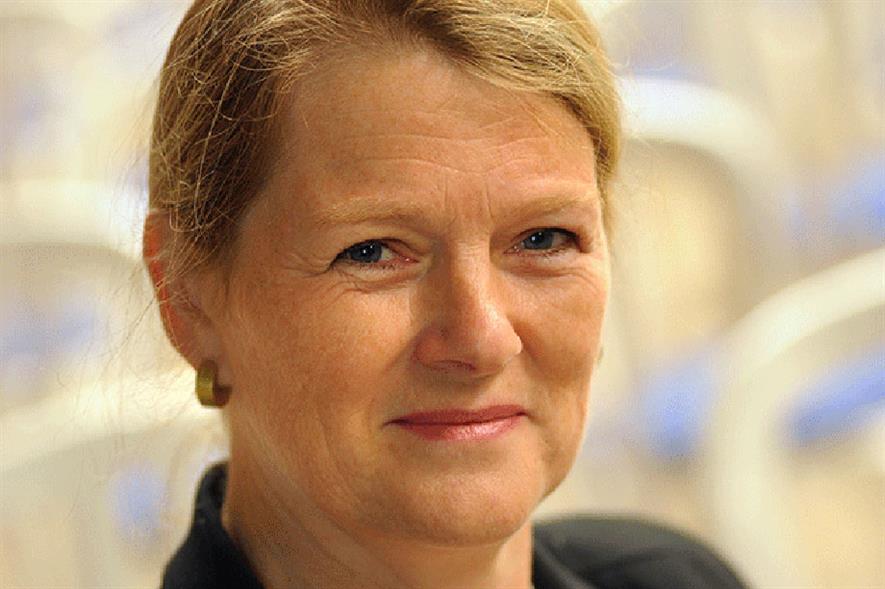 GCA’s Christine Tacon is retiring after seven years and has listed her successes in a final newsletter, with 10 out of 13 supermarkets at 92-96% complying the code.
GCA’s Christine Tacon is retiring after seven years and has listed her successes in a final newsletter, with 10 out of 13 supermarkets at 92-96% complying the code.
She said: “Since the beginning of the emergency I have been urging suppliers to raise any issues straightaway with the retailers. However, from my initial research there is no evidence that suppliers have been raising issues with the Code Compliance Officers or asking for buyers’ decisions to be escalated. If there are issues and they are brought to me for resolution I will as always deal with them on a case-by-case basis but they should first be raised with the retailers directly at the earliest opportunity.
“The Government is appointing my successor and I am expecting an announcement shortly. My successor will take office at a good time. The initial work of the GCA is largely done and I believe the Code provided the framework for progress as well as the flexibility required to maintain groceries supply to consumers at the most difficult of times
In the GCA’s new annual report (www.gov.uk/gca) Tacon highlights areas of progress:
• An increase in competition in the sector as three more retailers have exceeded £1 billion turnover of groceries and been designated by the Competition and Markets Authority.
• “Working between retailers and suppliers has become more efficient, for example the business practices implemented in response to inconsistencies arising as a result of drop and drive have eliminated masses of paperwork as well as reducing time wasted on challenges.”
• “Suppliers feel more able to challenge the retailers to get the best joint solutions – no longer is the response ‘how high?’ when the retailers ask them to jump.”
• “Fresh produce suppliers have been growing in size and are confident under the protection of the Code to work closely and on longer contracts with retailers and consumers have benefitted from an increase in innovative products on the supermarket shelves, created by a growing number of speciality suppliers.”
• “The original 10 regulated retailers are now exemplars among businesses for paying on time. The Duty to Report on Payment Practices and Performance shows they paid between 93% and 100% per cent of all their invoices on time, whereas only 13% of all the suppliers to those retailers achieved the same level of prompt payment.”
The seventh GCA survey ran from 4 February to 29 March and attracted a record number of responses, including 1,480 from direct suppliers. The number of suppliers experiencing a Code-related issue fell to an all-time low. The figure is now just 36%, down from 79% in 2014.
Last year’s top concern for suppliers – forecasting – fell from 15% to 13%.
Delay in payments and de-listing – the other most common issues experienced by suppliers – are both now at their lowest reported level at 12% apiece.
Ten retailers are rated between 92% and 96% as complying consistently well or mostly with the Code.
Edition 22: News from the Adjudicator
gov.uk – 24th June 2020
Serving the sector through the COVID-19 emergency
I am writing this newsletter as we begin to see the first significant easing of restrictions across the economy. The groceries sector has been operating at full throttle throughout these immensely challenging times and I want to pay tribute to the way both suppliers and retailers have performed to keep supermarket shelves stocked. And a massive thank you to the staff working to ensure customers have been able to shop safely and receive regular deliveries.
The stronger and more effective communication between retailers and suppliers that the Code has helped to foster has shown its value in the current emergency and helped maintain very efficient supply chains especially in the early days when supplies of particular products came under huge pressure.
I should now be in my final days in office as the GCA but I wanted to play my part in the response to COVID-19 and offered to extend my contract in order to provide the continuity the sector needs. I agreed to stay on beyond 24 June for a short period to deal with any issues arising from changes to supply arrangements during the early stages of the emergency.
Since the beginning of the emergency I have been urging suppliers to raise any issues straightaway with the retailers. However, from my initial research there is no evidence that suppliers have been raising issues with the Code Compliance Officers or asking for buyers’ decisions to be escalated. If there are issues and they are brought to me for resolution I will as always deal with them on a case-by-case basis but they should first be raised with the retailers directly at the earliest opportunity.
The Government is appointing my successor and I am expecting an announcement shortly. My successor will take office at a good time. The initial work of the GCA is largely done and I believe the Code provided the framework for progress as well as the flexibility required to maintain groceries supply to consumers at the most difficult of times. I look back on the past seven years with a great deal of pride. I took on this role because I wanted to make a difference and I believe the sector is now in a much fairer place.
The success of regulation under the model I have adopted is prompting growing calls for the role of GCA and the scope of the Code to be extended, whether further up the supply chain or to more retailers. The new GCA is bound to have new ideas, but I hope they will continue the initiatives that have worked. I wish my successor every success.
I have just published my annual report and accounts for 2019/2020 and they are now available at www.gov.uk/gca. Do take the opportunity to read through them. In the report I highlight a number of important areas of progress since I was appointed as GCA, including the following examples:
- We have seen an increase, not a decrease in competition in the sector as three more retailers have exceeded £1 billion turnover of groceries and been designated by the Competition and Markets Authority.
- Working between retailers and suppliers has become more efficient, for example the business practices implemented in response to inconsistencies arising as a result of drop and drive have eliminated masses of paperwork as well as reducing time wasted on challenges.
- Suppliers feel more able to challenge the retailers to get the best joint solutions – no longer is the response “how high?” when the retailers ask them to jump.
- Fresh produce suppliers have been growing in size and are confident under the protection of the Code to work closely and on longer contracts with retailers and consumers have benefitted from an increase in innovative products on the supermarket shelves, created by a growing number of speciality suppliers.
- The original 10 regulated retailers are now exemplars among businesses for paying on time. The Duty to Report on Payment Practices and Performance shows they paid between 93% and 100% per cent of all their invoices on time, whereas only 13% of all the suppliers to those retailers achieved the same level of prompt payment.
2020 GCA survey
My seventh and final survey ran from 4 February to 29 March and attracted a record number of responses, including 1,480 from direct suppliers.
Despite including a three-week period covering the early, challenging days of COVID-19 and the inclusion of a new retailer the number of suppliers experiencing a Code-related issue fell to an all-time low. The figure is now just 36%, down from 79% in 2014.
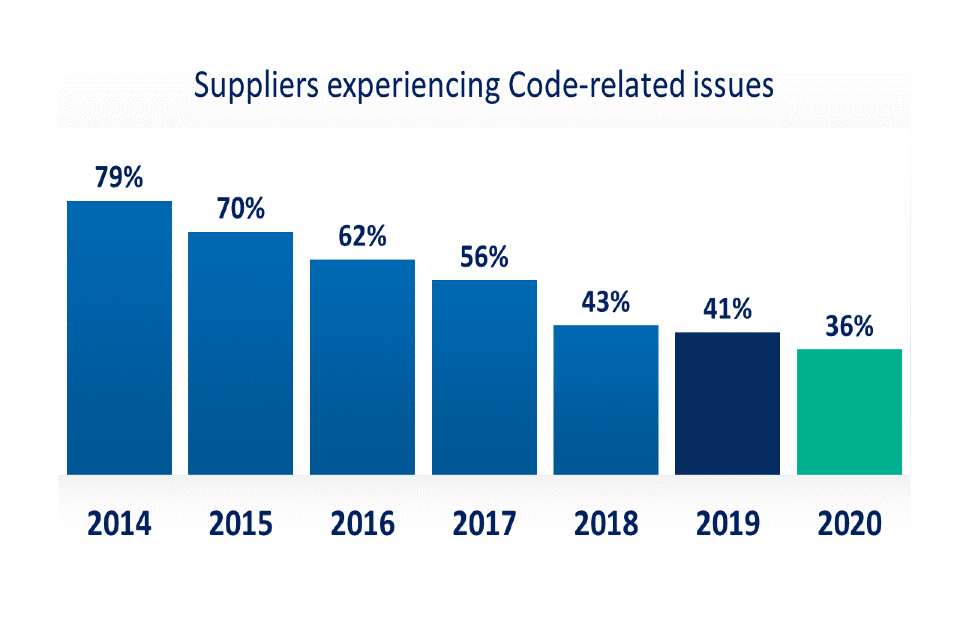
Suppliers recognised improvements across every Code-related issue and last year’s top concern for suppliers – forecasting – fell from 15% to 13%. Delay in payments and De-listing – the other most common issues experienced by suppliers – are both now at their lowest reported level at 12% apiece. The graphic below shows the progress on every Code-related issue since 2014.
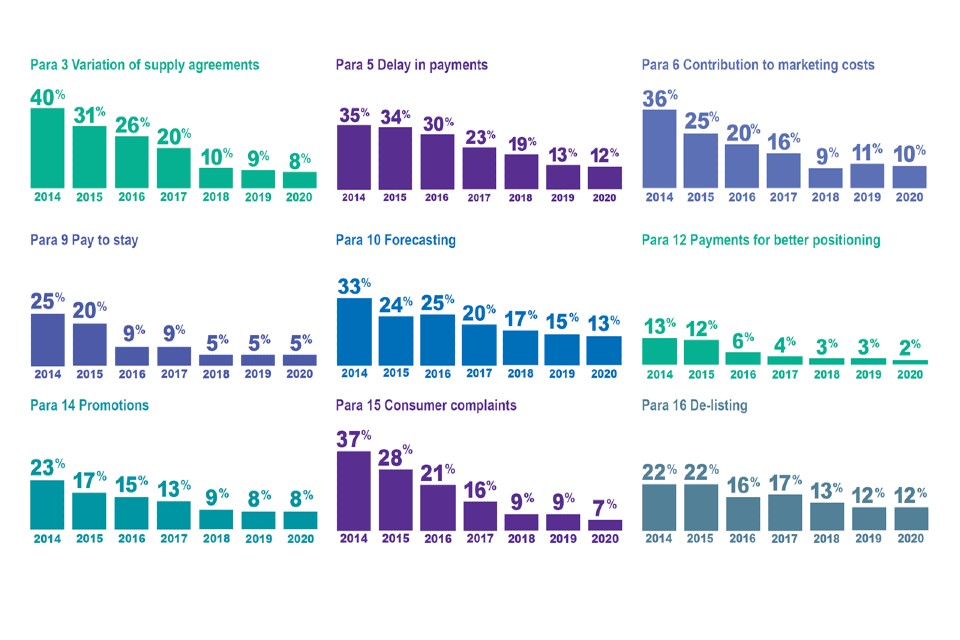
Suppliers also reported a very high level of Code-compliant behaviour from retailers – as this graphic powerfully represents. It is now extremely tight at the top with 10 retailers rated between 92% and 96% as complying consistently well or mostly with the Code. Only three retailers were rated below 90% – which was the best score in 2014.

I was particularly delighted to see that suppliers have recognised the improvements in compliance by Co-op which has taken them from tenth place to second in a year. I worked closely with the retailer for eight months following my investigation and it is testament to the huge progress the retailer has made embedding the Code throughout its organisation.
Farewell and thank you
This is my final newsletter and I want to thank all those who have played a part in achieving this success – especially the suppliers who have completed my annual surveys and brought my attention to issues, and those who have responded to my urging to get trained. In particular I want to pay tribute to the Code Compliance Officers who strongly supported my collaborative approach and took up my challenge to be my eyes and ears within their companies and make the Code work for the benefit of all – retailers, suppliers and customers.
With very best wishes for now and the future.
Christine Tacon
GCA’s tenure instils confidence in suppliers
Food Manufacture – 24th June 2020
Click here to read the full article.
Grocery Code Adjudicator Newsletter & Annual Survey 2020
Mills & Reeve Food and Agribusiness – 23rd June 2020
The latest newsletter from the Groceries Code Adjudicator (GCA) has been published featuring the GCA’s response to Covid-19 and the 2020 survey results.
This is the final newsletter of Christine Tacon as the outgoing Grocery Code Adjudicator, the new GCA will be announced shortly and Christine Tacon will be staying on for a short period after 24 June to deal with any issues arising from changes to supply arrangements during the early stages of the emergency.
It is recognised the groceries sector has been operating at ‘full throttle’ throughout these immensely challenging times. Also that ‘the stronger and more effective communication between retailers and suppliers that the Code has helped to foster has shown its value in the current emergency and helped maintain very efficient supply chains especially in the early days when supplies of particular products came under huge pressure.’
Newsletter
The newsletter indicates that there has been very few if any issues raised from suppliers with Code Compliance Officers, it is not clear whether this shows an increased compliance, possibly due to an increase in consumer demand, or if issues are simply not being escalated. The newsletter states: “Since the beginning of the emergency I have been urging suppliers to raise any issues straightaway with the retailers. However, from my initial research there is no evidence that suppliers have been raising issues with the Code Compliance Officers or asking for buyers’ decisions to be escalated. If there are issues and they are brought to me for resolution I will as always deal with them on a case-by-case basis but they should first be raised with the retailers directly at the earliest opportunity.”
2020 Survey
There are good news for producers from the 2020 survey result in the following three key findings:
-
- Despite including a three-week period covering the early, challenging days of COVID-19 and the inclusion of a new retailer the number of suppliers experiencing a Code-related issue fell to an all-time low. The figure is now just 36%, down from 79% in 2014.
- Suppliers recognised improvements across every Code-related issue and last year’s top concern for suppliers – forecasting – fell from 15% to 13%. Delay in payments and De-listing – the other most common issues experienced by suppliers – are both now at their lowest reported level at 12% apiece.
- Suppliers also reported a very high level of Code-compliant behaviour from retailers. In this year’s survey only three retailers were rated below 90% – which was the best score in 2014.
We at Mills & Reeve wish Christine Tacon all the best in her future endeavours.
Biggest barriers to new entrants
Farmers Guardian – Friday 19th June 2020
The amount of capital required to start up as a new entrant alongside misconceptions swirling about the industry are two of the biggest barriers facing young farmers and new entrants across the UK.
Speaking at the Oxford Farming Conference (OFC) webinar, Christine Tacon, Groceries Code Adjudicators and charwomen of the Management Development Services graduate scheme, highlighted misconceptions surrounding careers in agriculture continue to challenge and hamper the industry’s ability to attract new entrants.
“In terms of recruiting bright young people, we have seen huge numbers from a variety of backgrounds, but they do not know an awful lot about the industry.”
Read the full article here.
Beanstalk Global 20 on 20 Christine Tacon CBE
10th June 2020
We had the pleasure of catching up with the UK’s Grocery Code Adjudicator on her fascinating background within the food sectors and also her defined and very well respected leadership style.
Groceries code compliance
Vegetable Farmer – 1st June 2020
Retailer compliance with the Groceries Supply Code of Practice is at an all-time high, initial analysis of the groceries code adjudicator’s annual survey has found.
Of the almost 1,500 direct suppliers who responded to the survey, 36% said they had
experienced a code-related issue in the past 12 months. That figure has dropped year on year
since the survey was started, in 2014.
The most common issues suppliers experienced in 2020 – forecasting, delay in payments
and de-listing – are all now at their lowest reported level.
Christine Tacon, the first groceries code adjudicator (GCA) to be appointed and who steps
down later this year, said the survey period included three weeks when the sector was under
huge pressure due to Covid-19.
“But the data shows no adverse impact on compliance with the code as retailers and suppliers
raced to keep supermarket shelves filled,” she said.
“This is a testament to the stronger and more effective communication between retailers
and suppliers which the GCA has fostered over the past seven years and which has proved so valuable during this emergency.”
GCA 2020 survey results
1st June 2020
Join a webinar with Gavin Ellison, Director of Public Sector and Not for Profit at YouGov, as he talks us through the full 2020 GCA survey results. Christine also gives an overview of the results from her perspective and answers any questions.
Adjudicator Stays On
British Farmer & Grower – 1st June 2020
Christine Tacon has been re-appointed as Groceries Code Adjudicator for a period of up to six months.
Ms Tacon was due to complete her term in June, but will stay on to provide “continuity and reassurance” as supply chains feel the impacts of coronavirus.
The news follows a temporary easing of domestic competition laws to help the industry deal with
coronavirus issues. The measures allow supermarkets to share data on stock levels, cooperate to keep shops open, or share depots and delivery vans.
NFU President Minette Batters said: “The food chain sector has been under
enormous pressure to ensure consumers’ needs are met during this pandemic.
“We welcome the GCA’s reappointment at this extraordinary time and believe it provides suppliers with much-needed reassurance, particularly when it comes to ensuring that retailers abide by the Groceries Supply Code of Practice (GSCOP).”
Recruitment for Ms Tacon’s successor was underway before the pandemic, but the government is yet to announce her replacement.
Suppliers report fall in fines for ‘drop and drive’ deliveries
The Grocer – 29th May 2020
Suppliers have saved tens of millions thanks to sweeping changes to the ‘drop and drive’ procedures that saw them fined for inaccurate deliveries to supermarkets
Read the full article here.
Christine Tacon: COVID-19-related delistings prompt no issues yet
Food Manufacturer – 22nd May 2020
At an online press briefing on 22 May covering the results of the latest Groceries Supply Code of Practice (GSCOP) supplier survey, Tacon said she had contacted all GSCOP compliance officers at retailers covered by the code in the past week. “Interestingly, some of them have now undone all of their temporary delistings. Some of them are working through them and are considering whether some of them should not be temporary but should be longer term, but are fully aware that they have got to work through that with the supplier.”
However, whatever tack the retailers were taking, no complaints or issues about the handling of the delistings had been reported to her so far, she said. “I should say that I have had virtually nothing from suppliers. so if suppliers are having issues they need to tell me. Suppliers should not sit on issues; they should raise them straight away, because now is the time retailers can do something about it. To suddenly end up in a dispute three months later when the retailer can no longer help them is not the right time.
“On the whole, the information I was getting from suppliers when I was proactively trying to talk to them and say, ‘what’s going on?’ is that it was in both of their interests to reduce the range so that they could keep their core products on the shelves. In the words of one of the code compliance officers, suppliers’ and retailers’ interests were totally aligned in reducing the range, reducing the complexity and upping the volume to the maximum they could.”
The ‘new normal’
However, there were indications that some shifts in shopper purchasing habits had not reverted back to previous trends, said Tacon. “All of the retailers are talking about their ‘new normal’, here people are actually buying differently. I think even if they restock some of the things that were temporarily delisted, they may well not sell either.”
Feedback from the seventh GSCOP supplier questionnaire, the final survey conducted during Tacon’s stint as GCA, registered the highest rate of retailer compliance so far. The survey was carried out by YouGov from 4 February to 29 March and initial results were published on 13 May.
In this latest survey, delisting, including significant reduction in volume without reasonable notice was the second biggest issue reported by respondents in the past 12 months. A total of 21% flagged it as being an issue. The biggest proportion, 22%, cited inaccurate forecasting by
retail customers as an issue. The third largest concern, raised by 19% of respondents, was inadequate processes to enable discrepancies in invoices to be resolved promptly.
From the very first survey in 2014, suppliers have scored their perceptions of retailers’ compliance with the code for the retailers they supply. In 2020 almost 1,500 direct suppliers responded. Only three retailers were rated below 90% for complying consistently well or mostly with the code – which was the best score in 2014. The highest score is 96% and the lowest is 81%. In 2014 the percentage reported as complying with the Code consistently well and mostly ranged from 58% to 90%.
Aldi remains highest perform
In common with every annual survey carried out by YouGov on behalf of the GCA, Aldi is the highest performer – rated with 96% compliance. But the major riser in 2020 is Co-operative Group Limited (Co-op), which is ranked joint second on 94%. This is a massive improvement
from its tenth place in 2019 when the GCA found it had breached the code on two counts. Co-op also takes top place on the most improved table.
Bottom-placed retailer on overall compliance was Iceland on 81%, followed by B&M on 86% and Marks & Spencer on 89%.
Tacon added: “I also thought it was worth mentioning how well Home Bargains had done, coming straight in at a 92% compliance in their very first year of being designated.” It was the first GSCOP supplier survey in which TJ Morris, trading as Home Bargains, had been included.
The Government recently announced that Tacon would continue as GCA for up to six months beyond her agreed contract to deal with any issues arising from supply arrangements during the COVID-19 emergency.
Rod Addy
Read the article online here.
Co-op shoots up rankings in Tacon’s final GSCOP survey
The Grocer – 21st May 2020
 The Co-op has been praised for a “massive improvement” in its behaviour towards suppliers, as it rose from third from bottom to second from top in adjudicator Christine Tacon’s final YouGov supplier survey, published this week.
The Co-op has been praised for a “massive improvement” in its behaviour towards suppliers, as it rose from third from bottom to second from top in adjudicator Christine Tacon’s final YouGov supplier survey, published this week.
The retailer, which was last year found guilty of breaching GSCOP after an investigation by Tacon into the way it was delisting suppliers and unilaterally changing supplier agreements, was ranked only behind Aldi, which topped the table for the seventh year in a row.
For the Co-op, 95% of suppliers said it complied either “mostly” or “consistently” well with the code. Aldi once again topped the table, for the seventh year in a row, with a score of 97%.
The report also named Iceland as the worst performer for the fourth year in a row, with its compliance score down by one point to 81% and almost a fifth of suppliers saying it rarely or never complied with the code.
There was also a fall of two places for M&S, which got a score of 86%, to be third bottom above B&M Stores in the table. The Grocer understands suppliers reported friction as the retailer sought to leverage the power of its online delivery partnership with Ocado.
The survey was greeted by Tacon as a boost to her plan to imbed self-regulation across all 13 retailers covered by the code before she steps down at the end of this year. The Co-op was ordered to introduce major changes to its governance, systems and processes after an investigation into the retailer in 2018.
“This shows that the work they have done on self-governance has driven right through to suppliers and it’s great to see the Co-op getting the recognition they deserve,” Tacon said.
Co-op Food CEO Jo Whitfield added: “These strong supplier relationships have helped us to respond to the challenges of the coronavirus crisis, taking account of supplier issues to meet increased demand to serve communities and feed the nation.
“We’ve overhauled our approach to embedding the code into our business, including a review of processes, the introduction of new controls and monitoring tools and revised training, which has led to a cultural and behavioural shift which puts the potential impact on suppliers at the heart of our decision-making. It’s been a huge team effort and I couldn’t be prouder of the work colleagues have done.”
Julie Ashfield, MD of buying at Aldi, said that treating suppliers fairly was one of the key pillars of its success over the years, but she also praised the work of the Adjudicator.
“These latest results show the positive impact that the GCA has had on the sector over the past seven years,” said Ashfield. “The coronavirus crisis has reminded us all of the need for partnership across the supply chain and how interdependent retailers and their suppliers are.”
Despite criticism by supermarket bosses that GSCOP was undermining the ability of retailers to feed the nation Tacon said “the work I’ve done in the past seven years has helped retailers cope with the current crisis.”
She added: “Aldi should also be particularly congratulated for having held the top spot every year for seven consecutive years, but the survey shows the considerable efforts to improve made by all retailers.”
Iceland refused to comment on the survey
Ian Quinn
Groceries survey shows UK supermarket compliance at record high
New Food – 18th May 2020
Early analysis of suppliers’ responses to the comprehensive annual groceries sector survey has shown that retailer compliance with the Groceries Supply Code of Practice is at “an all-time high”.
UK supermarkets have achieved a record improvement in their dealings with groceries suppliers, UK Groceries Code Adjudicator (GCA) Christine Tacon has revealed in her final GCA survey.
Almost 1,500 direct suppliers to the 13 regulated supermarket retailers completed the survey and 36 percent said they had experienced a Code-related issue at any point in the past 12 months – down from 41 percent in 2019 and 79 percent in 2014 when the survey was first conducted.
This was said to be a particularly striking result as the survey period included three weeks when the sector was facing the challenge of huge increases in consumer buying of certain products as the COVID-19 emergency hit.
In addition, direct suppliers recognised improvements across every Code-related issue. The most common issues experienced by suppliers in 2020 related to forecasting, delay in payments and de-listing. Each of these is now at its lowest reported level – at 13 percent, 12 percent and 12 percent respectively.
In comparison, 35 percent of suppliers reported experiencing delay in payments in 2014, 33 percent experienced issues with forecasting and 22 percent with de-listing. The most reported issue in 2014 – forensic auditing – which 45 percent of suppliers highlighted, is now at five percent.
“This is my final survey as GCA as I will be stepping down later in 2020 after seven years in the role and it tells an extremely positive story,” Tacon said.
“I am delighted to report that in a year when an additional retailer – TJ Morris – was included in the survey and the sector faced the challenge of COVID-19 my survey demonstrates that UK supermarkets continue to make substantial progress.
“The survey period included three weeks when the sector was under huge pressure but the data shows no adverse impact on compliance with the Code as retailers and suppliers raced to keep supermarket shelves filled.
“Indeed it corroborates my own discussions with the retailers who have told me not one supplier has raised an issue with their Code Compliance Officers or asked for an issue to be escalated. I made it clear in my position statement issued on 17 March that suppliers should not wait to raise issues with retailers.
“This is a testament to the stronger and more effective communication between retailers and suppliers which the GCA has fostered over the past seven years and which has proved so valuable during this emergency.
“It also demonstrates that the Code has provided the flexibility retailers need to maintain a vital and efficient supply chain that is getting groceries to the consumer.”
Sam Mehmet
Read the article online here.
Survey shows retailer-supplier dealings continue to improve
Farmers Weekly – 14th May 2020
The Groceries Code Adjudicator (GCA) has reported a record improvement in retailers’ trading relationships with their suppliers.
Adjudicator Christine Tacon acts as a watchdog for dealings between suppliers and the 13 largest UK retailers through the Groceries Supply Code of Practice.
The code was introduced to help address persistent complaints that large retailers were abusing their power in dealings with small-scale suppliers.
Ms Tacon introduced an annual survey of farmer-supplier opinions as a means of finding out more about retailer dealings.
It is this survey which has revealed the improvement.
Of the 1,500 retailer-suppliers, just over a third (36%) reported code-related breaches by the supermarkets in 2019.
This is a drop from 41% in the previous 12 months and the lowest result since Ms Tacon was appointed in 2013.
Over that time the proportion of suppliers experiencing code-related issues has decreased dramatically from 79% in the 2014 survey.
The survey also canvasses supplier opinion on how well each retailer has complied with the code.
Figures are still being collated for the 2020 report, but last year’s responses were encouraging.
In the 2019 survey, suppliers stated they thought retailer compliance ranged from 81% to 97%.
Respondents added that 10 out of 13 retailers had achieved a compliance rate of at least 90%.
That is a marked improvement on 2014 when opinions suggested compliance rates of between 58% and 90%.
Ms Tacon, said the latest survey showed retailer compliance was at an all-time high.
“The survey is a testament to the stronger and more effective communication between retailers and suppliers, which the GCA has fostered over the past seven years,” she added.
The NFU welcomed the results as particularly positive because the survey covered a three-week period when the sector faced disruption amid the Covid-19 pandemic.
NFU president Minette Batters said: “There’s no doubt that we’ve seen a huge behavioural and cultural change since Christine Tacon took on the GCA role.
“These new figures are testament to her hard work, collaborative approach in enforcing the code of practice, and an ability to hold retailers to account.”
However, The Tenant Farmers Association (TFA) said that while it welcomed the improvements for direct suppliers, other primary producers continued to face difficulties.
TFA chief executive George Dunn pointed out that the adjudicator only regulates the relationship between the direct suppliers of the 13 biggest retailers.
“Farmers further down the chain continue to have little say in dealings,” Mr Dunn said.
“This has been highlighted by the Covid-19 pandemic with many businesses exposed to whatever deal is handed down to them.”
Mr Dunn called for the GCA’s remit to be extended beyond direct suppliers to protect the most vulnerable primary producers in the wider supply chain.
Jonathan Riley
Number of suppliers experiencing GSCOP-related issues continues to fall
The Grocer – 13th May 2020
 Supermarket behaviour in dealing with suppliers is at an all-time high, despite the pressures of coronavirus, according to an official survey by Groceries Code Adjudicator Christine Tacon.
Supermarket behaviour in dealing with suppliers is at an all-time high, despite the pressures of coronavirus, according to an official survey by Groceries Code Adjudicator Christine Tacon.
A YouGov survey of almost 1,500 direct suppliers, on behalf of the GCA, found more than a third (36%) said they had experienced a code-related issue with one of the 13 retailers covered by GSCOP in the past 12 months – down from 41% in 2019.
The period includes the first three weeks of the outbreak and the findings come despite calls from the BRC for the code to be suspended to allow companies to delist products at short notice.
The percentage of suppliers claiming to have been affected by a code-related issue has fallen for the seventh consecutive year and has come down from a high of 79% when the survey was first carried out in 2014.
The findings echo the results of a survey carried out for The Grocer earlier this month that showed 31% of suppliers said they had experienced retailers behaving in a way contrary to the code since the onset of the current crisis.
Tacon, who agreed to stay on for a further six months, having originally been due to step down in June, said she believed supermarkets were working more closely than ever with suppliers.
“The survey period included three weeks when the sector was under huge pressure, but the data shows no adverse impact on compliance with the code as retailers and suppliers raced to keep supermarket shelves filled,” she said.
“Indeed, it corroborates my own discussions with the retailers who have told me not one supplier has raised an issue with their code compliance officers or asked for an issue to be escalated.
“This is a testament to the stronger and more effective communication between retailers and suppliers which the GCA has fostered over the past seven years and which has proved so valuable during this emergency.
“It also demonstrates that the code has provided the flexibility retailers need to maintain a vital and efficient supply chain that is getting groceries to the consumer.”
Yesterday Morrisons CEO David Potts, who was one of those to call for the lifting of elements of GSCOP during the crisis, said: “I’ve had no information of a code issue from any of our suppliers since this crisis began.”
However, Ged Futter, founder of The Retail Mind, who carried out the recent survey for The Grocer, said: “The GCA report talks of improvements across every code-related issue. Alternatively, you could say after 10 years of GSCOP over a third of suppliers are still experiencing code-related issues.”
Ian Quinn
Will Covid-19 spark change in the UK supplier payment terms?
Just Food – 13th May 2020
Read the full article here.
Christine Tacon, the UK’s Groceries Code Adjudicator, is impressed with the progress – not least because her own supplier surveys are also showing delays in payments have tumbled down the list of concerns. In 2014, 35% had an issue with late payments, she explains, but last year this was down to 13%. “I don’t have evidence it’s a real problem [anymore].
Tacon even goes so far as to say the improvements – arguably sparked by her Tesco investigation – had “very definitely” helped improve the resilience and ability of the sector to deal with the current coronavirus crisis. “The interests of suppliers and grocers during the pandemic has been aligned,” she explains. “They are actually talking to each other.” Others are not so sure.
David Burrows
Groceries sector survey shows supermarket behaviour at a record high
Groceries Code Adjudicator – 13th May 2020
 The UK’s supermarkets have achieved a record improvement in their dealings with
The UK’s supermarkets have achieved a record improvement in their dealings with
groceries suppliers, Christine Tacon’s seventh and final GCA survey has revealed.
Read the full press release here.
Christine Tacon extends GCA contract to provide continuity through coronavirus outbreak
The Grocer – 27th April 2020
 Tacon had been due to stand down in June, seven years after taking up the role
Tacon had been due to stand down in June, seven years after taking up the role
“I want to play my part in the response to Covid-19”, the adjudicator said
Groceries Code Adjudicator Christine Tacon has agreed to stay in the post for a further six months, amid fears GSCOP is coming under pressure from retailers during the coronavirus outbreak.
Small business minister Paul Scully confirmed today that Tacon had been re-appointed for an emergency third term. She had been due to stand down in June, seven years after taking up the role.
Scully said the reappointment would provide “continuity and reassurance to the groceries sector” through the Covid-19 outbreak.
The moves comes after Tacon wrote to supermarket CEOs earlier this month urging them to drop calls for elements of GSCOP to be suspended during the coronavirus crisis.
Last month, Morrisons CEO David Potts called on the government to allow it to delist products without the need to give suppliers “reasonable notice”. It is understood more than one supermarket has called for GSCOP to be subject to emergency conditions that would give suppliers less protection.
“These are exceptional times and it is vital for both retailers and suppliers that there is consistency and certainty when the nation is relying on the groceries supply chain to keep supermarket shelves filled,” said Tacon.
She added; “I had intended to step down as Groceries Code Adjudicator in June when my term of office ended. However, I want to play my part in the response to Covid-19 and so offered to extend my contract in order to provide the continuity the sector needs.”
Scully said: “Supermarkets and their suppliers are working flat out to ensure people’s needs are met during this unprecedented time. We are doing everything we can to make it easier for grocery suppliers to do their job, and Christine’s reappointment will provide them with some much-needed continuity and reassurance in what is a very unsettling time.”
The government launched a public appointment process on 30 October 2019 to identify a successor and said it expected to make a decision on a successor “shortly”.
Ian Quinn
Christine Tacon to continue as Groceries Code Adjudicator
Department for Business, Energy & Industrial Strategy – 27th April 2020
Christine Tacon will continue as Groceries Code Adjudicator (GCA) for a period of up to 6 months.
Small Business Minister Paul Scully today (Monday 27 April) confirmed the reappointment of Christine Tacon CBE as the Groceries Code Adjudicator for a period of up to 6 months. Her reappointment will provide continuity and reassurance to the groceries sector through the coronavirus (COVID-19) outbreak.
The Groceries Code Adjudicator enforces compliance with the Groceries Code, which was introduced in 2009 to ensure a level playing field between the UK’s largest supermarkets and their direct suppliers.
To further support the sector during the coronavirus pandemic, the government has temporarily relaxed domestic competition rules so that supermarkets, their suppliers and logistics services providers can better work together to respond to the crisis. Legislation now in place enables affected businesses to work together to help keep shops open and deliver the essential supplies that people need.
Small Business Minister Paul Scully said:
Supermarkets and their suppliers are working flat out to ensure people’s needs are met during this unprecedented time. We are doing everything we can to make it easier for grocery suppliers to do their job, and Christine’s reappointment will provide them with some much-needed continuity and reassurance in what is a very unsettling time.
Christine Tacon, Groceries Code Adjudicator, said:
I had intended to step down as Groceries Code Adjudicator in June when my term of office ended. However, I want to play my part in the response to COVID-19 and so offered to extend my contract in order to provide the continuity the sector needs.
Background
Having held the role of Groceries Code Adjudicator since its launch in 2013, Christine Tacon has succeeded in improving compliance with the Groceries Code. The proportion of suppliers experiencing code-related issues has decreased from 79% in 2014 to 41% in 2019. Suppliers’ assessments of each retailer’s compliance with the code ranged from 58% to 90% being compliant in 2014 to between 81% and 97% in 2019, with 10 out of 12 retailers achieving a compliance rate of at least 90%.
Christine Tacon’s second term as Groceries Code Adjudicator ends on 24 June 2020 and she had previously announced that she would not be seeking reappointment. However, in light of the coronavirus outbreak, she will now stay on beyond that date for a period of up to 6 months to resolve issues arising during the emergency. The government launched a public appointment process on 30 October 2019 to identify a successor and expects to make a decision shortly.
Webinar: 'Will grocery retail be disrupted by coronavirus? We discuss with our leading industry experts'
Listen again here. Access Code: 3K.@Wz7&
The potential impact of coronavirus to the retail economy is as of yet unfathomable, as shoppers turn to survival mode. Groceries and household essentials are the only port in this storm. Beanstalk discuss how this will shape future retail with experts.
Aired: Tuesday 21st April 11:00 BST.
Panelists: Christine Tacon CBE – Groceries Code Adjudicator, Andy Carter – Owner/Director @ REVEL8 Consulting LTD, Peter Durose – Managing Director at Coregeo Ltd, Jim Jefcoate – Director at Hurdletree Associates, George Beach – Director @ Mudwalls Farms, Max MacGillivray – Editor in Chief for Beanstalk & Webinar Host.
Hosted by: Beanstalk.Global
Westminster Food & Nutrition Forum
16th April 2020
Progress on ensuring fairness in the grocery supply chain.
Coronavirus shouldn’t affect GSCOP, Tacon tells supermarket bosses
The Grocer – 14th April 2020

Tacon has urged retailers to use the flexibility within the code.
-
-
- Groceries Code Adjudicator Christine Tacon has asked retailers to withdraw their requests for elements of the code to be suspended.
-
- Last month Morrisons CEO David Potts asked the government to allow the delisting of products without giving suppliers reasonable notice”.
- Tacon reassured suppliers that complaints about delists during the period would be investigated.
Groceries Code Adjudicator Christine Tacon has written to supermarket CEOs urging them to withdraw calls for elements of GSCOP to be suspended during the coronavirus crisis.
Tacon’s intervention came after it emerged several retailers had raised concerns with Defra and the CMA about remaining compliant with the code because of the current unprecedented trading conditions.
Last month Morrisons CEO David Potts called on the government to allow it to delist products without the need to give suppliers “reasonable notice”. He said supermarkets were in effect on a “war footing” and asked for “regulations that work perfectly well in peacetime to be changed”.
Tacon said she understood other retailers had also raised concerns about the code. However, her letter urges supermarket CEOs to use the flexibility within the code, rather than seek for elements of it to be suspended. And she sought to reassure suppliers that complaints about delists during the period would be investigated, once it was over.
“I am writing to you because I understand that in their discussions with Defra and the CMA, some retailers have raised concerns about compliance with the Groceries Supply Code of Practice during the current trading conditions,” her letter says.
“I want to reassure you, as no doubt your code compliance officers are also doing, that there is considerable flexibility already in the code, particularly as to what constitutes reasonable notice of de-listing or variation of supply agreements.”
“I have always resisted giving any figure in relation to notice periods and have instead issued guidance setting out the factors retailers should consider when determining what is reasonable in the circumstances of any particular supply relationship.”
“What is reasonable is always to be determined on a case-by-case basis bearing in mind all relevant factors.”
The Adjudicator said she believed co-operation between retailers and suppliers that had been taking place so far demonstrated they could work together, within GSCOP, during the outbreak.
“Over these initial few weeks, for the vast majority of suppliers, their interests have been aligned with those of retailers to get the groceries that consumers want onto the shelves.”
“I was pleased to hear from all CCOs that there has been extremely close working between retailers and suppliers and a considerable increase in communication. This has been echoed by suppliers who I have spoken to. One described co-operation with the retailers as excellent and said that ‘GSCOP isn’t on the agenda’,” the letter adds.
GSCOP expert Ged Futter, founder of The Retail Mind, said he thought most retailers were being proactive and collaborating with suppliers. He said: “I can’t understand why companies need to go to Defra or the CMA.”
“GSCOP is not there to be a barrier. It’s a framework with which people can work. At times like this the most important thing is collaboration and that is what the code wants. Any retailer that thinks it’s there to slow this down is not understanding the code. Likewise, suppliers should realise that they can still raise issues under GSCOP. Some products have been delisted but now is the time to park those complaints so they can be dealt with while this is over.”
Webinar: 'We look to predict the fresh food landscape 18 months post COVID-19 with our expert industry guest speakers'
Listen again here. Access Code: I4$yq82&
Aired: Tuesday 14th April 15:00 BST.
Panelists: Christine Tacon CBE – Groceries Code Adjudicator, Shaun Browne – Co-Head Corporate Finance, UK at Houlihan Lokey, Sterling Crew – Chair of The Food Authenticity Network’s Advisory Board, Sarah Calcutt – Partners in Produce Ltd, Ben Makowiecki – Area Director Agriculture for Lloyds Banking Group, Max MacGillivray – Editor in Chief for Beanstalk & Webinar Host.
Hosted by: Beanstalk.Global
Christine Tacon calls for retailers to help suppliers facing cashflow problems
The Grocer – 27th March 2020
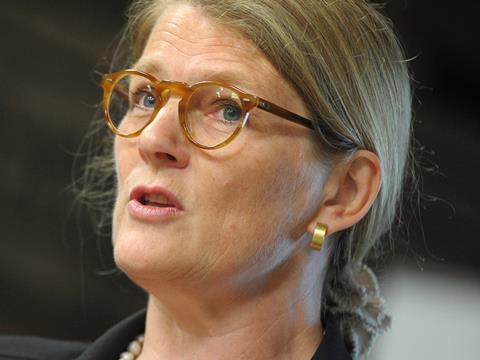
Groceries Code Adjudicator Christine Tacon has made an extraordinary intervention in a bid to help suppliers facing a cashflow crisis from the coronavirus outbreak.
Tacon has always previously refused to give any guidance on payment terms, because the issue is not covered in GSCOP.
However, amid fears suppliers could go to the wall unless they are paid faster, and huge spikes in demand from retailers, Tacon has written to all supermarkets urging them to step up their support.
A number of supermarkets have already announced steps to help the cashflow crisis, with Morrisons the first to act two weeks ago.
“One of the areas in which I am frequently asked to intervene is in relation to payment terms, which are not covered by the code,” said Tacon in the letter.
“I have always resisted saying anything about them as a result.
“In the current groceries supply situation, however, cashflow is critical for many of your suppliers. Some retailers already pay small suppliers within 14 days and have recently accelerated those payments still further, which is appreciated.
“Anything else you are able to offer your suppliers to help them through this extremely difficult time would be very welcome.”
Sainsbury’s this week committed to making immediate payments to small suppliers to ease cashflow pressures. Tesco and Aldi have also announced immediate payment terms for small suppliers.
Ian Quinn
Coronavirus: Groceries Code Adjudicator issues guidance for supply chain
Food Manufacturer – 17th march 2020
 The Groceries Code Adjudicator (GCA) has urged retailers and suppliers to work tog ether but has called on them to follow some “guiding principles”.
The Groceries Code Adjudicator (GCA) has urged retailers and suppliers to work tog ether but has called on them to follow some “guiding principles”.
It said there were “considerable challenges” facing retailers and suppliers as they worked together to ensure customers had access to food and other essentials during the COVID-19 outbreak.
The GCA said it was aware of co-ordinated work across Government to respond to the situation and said it had no intention of interfering with that.
But it has offered some guiding principles to assist retailers and suppliers to deliver continuity of supply to consumers, “as far as this” remained possible given significant pressures on staffing and some customer buying habits.
It said that nothing in the Groceries Supply Code of Practice (the Code) required any regulated retailer to break any other legal requirement. It advised that the Code should be read compatibly with all other legal obligations placed on regulated retailers.
The GCA said it could not offer a view as to whether current circumstances amount to “force majeure”. Retailers, it said, would want to agree a way with suppliers to meet the most pressing objectives of the situation as it developed.
The GCA said it “would expect all parties to work together constructively to achieve this”. Examples included effective communication on both sides, and an appreciation that, for example, reasonable notice provisions in the Code would need to be considered in light of the rapidly changing situation.
It recognised that notice periods might need to be short to address challenges at the earliest possible opportunity, but added that suppliers should not wait to raise issues with retailers.
Michelle Perrett
GSCOP – Get trained, know the code, speak up!
Spend Matters – 25th February 2020
 We haven’t heard from 4C Associates in some time, but they look to have been busy with new hires and a new website. We’ll be catching up with business developments soon. But for now, Simon Latham, a senior manager with the procurement consultancy, shares his thoughts on The Grocery Supply Code of Practice (GSCOP), having worked at JS, Safeway and Tesco where he wrote Tesco’s GSCOP training material and trained over 3,000 people.
We haven’t heard from 4C Associates in some time, but they look to have been busy with new hires and a new website. We’ll be catching up with business developments soon. But for now, Simon Latham, a senior manager with the procurement consultancy, shares his thoughts on The Grocery Supply Code of Practice (GSCOP), having worked at JS, Safeway and Tesco where he wrote Tesco’s GSCOP training material and trained over 3,000 people.
Now a decade old, The Grocery Supply Code of Practice (GSCOP) was created after the 2008 Competition Commission report highlighted the impact of major supermarkets on competition. It found that some of their practices were anti-competitive, transferring risk and costs onto the supplier. It applies to ‘Designated Retailers’ (i.e. the very large ones) and was intended to promote fair dealing between the large sellers and their suppliers, which can escalate claims of late payment, or payments for shelf positioning, etc., if they believe the supermarket to be in breach.
“The code has been around for over 10 years now and in this time it has proven strong correlation between receiving Grocery Code Adjudicator (GCA) focus and retailers improving performance,” he says.
Christine Tacon is the UK’s first Groceries Code Adjudicator and oversees the implementation of the GSCOP. “Christine and her team have orchestrated and delivered some fantastic results and achievements since the GCA’s conception,” he continues, “she ends the role at the end of June, and it is acknowledged by many how significant a job she has done to improve the commercial relationships between retailers and suppliers.”
“GSCOP’s overarching principle that should be applied in any day-to-day discussions, commercial arrangements or during any two-way dialogue between the buyer and the seller, is that you treat people how you yourself would want to be treated. This principle of ‘fair dealing,’ is not only the common thread throughout GSCOP, but it importantly sets the tone or environment under which any discussions should be carried out.
As a supplier, if you feel uncomfortable with how you are being treated in a discussion with a retailer, there is a possibility that the code is in some way being flaunted. Requests are often framed in a way that leaves little to the imagination if not fulfilled – if the consequence of not doing something is punitive, having a good working knowledge of GSCOP would be hugely advantageous and would help you find a palatable solution to the issue.
After 10 years, only 47% of direct suppliers have received training. The large companies continue to receive training, but micro, small and medium-sized companies are seeing a decline in the training sought – this is risky for those small companies potentially most at risk of a potential breach. Going forward, the GCA is recommending a more holistic company-wide approach to compliance that looks at improved communication, better systems and internal process, audit and legal compliance frameworks. The GCA aims to continue to work closely with retailers, but still relies heavily on suppliers advising of any potential areas of concern.
GSCOP does not give you black and white numbers and firm rules – every issue requires the need to agree and determine what ‘reasonable’ looks like. The key is its ability to bring parties together in a collaborative fashion to resolve issues amicably. GSCOP itself is split into 6 parts containing 17 rules. The 17 rules cover a broad spectrum of areas including common areas of tension such as delays in payments, costs for waste and shrink, acceptable payments for promotions and new lines, plus much more.
The scope of the CGA will undoubtedly continue to broaden – for example, last year saw the inclusion of B&M, Home Bargains and Ocado as designated retailers. Suppliers supplying the designated retailers, therefore, need to be familiar with the code and its 17 rules, plus the context and the overarching principles of it.”
In Tacon’s own words – “Get trained, know the code, speak up!”
Nancy Clinton
GCA reaches out to small suppliers
Speciality Food – 10 February 2020

The Groceries Code Adjudicator (GCA), Christine Tacon, has launched the seventh annual survey, which provides suppliers with the opportunity to express any Groceries Supply Code of Practice issues. The survey has enabled Christine, as the UK’s first GCA, to achieve progress for suppliers, demonstrate where retailer efforts have improved Code compliance and identify areas for improvement. The day the survey was released marked 10 years since the Code came into force.
Christine says,“I am particularly keen for micro and small suppliers to take part as I would like to have more information about the Code issues they face. I am very grateful to Speciality Food for promoting the survey and helping me raise awareness among this important group of suppliers. Last year, around 300 micro and small suppliers responded to the survey and of those, 22% of small suppliers and 30% of micro suppliers said they were unaware of my role, compared to only 9% of large suppliers.’
Suppliers can complete the survey at yougov.com/GCA, and it closes on 29th March 2020.
GCA opens annual survey
Fresh Produce Journal – 07 February 2020
Christine Tacon launches final survey of suppliers as Groceries Code Adjudicator before her term ends in June
The Groceries Code Adjudicator Christine Tacon has launched her annual survey of supermarket suppliers, ten years on from when the Groceries Supply Code of Practice came into force.
The survey, which will be Tacon’s last as GCA before her term ends in June, has played a vital role in regulating and improving retailer practices. It demonstrates where retailers’ efforts have improved Code compliance, as well as identifying areas for them to make improvements.
It is an opportunity for suppliers to tell the GCA what Code issues they are facing and whether the regulated retailers are treating them fairly and lawfully.
This year the survey – the seventh carried out by Tacon – includes Home Bargains, which was designated by the Competition and Markets Authority in September 2019.
Suppliers have until 29 March 2020 to complete the survey at www.yougov.com/GCA.
Tacon said: “The annual survey is the best way for the GCA to understand what issues suppliers are experiencing with the retailers and it is a powerful indicator of the state of relations in the sector. The retailers themselves use the results to help them pinpoint the issues they need to work on.
“I have tracked retailer behaviour through an annual survey since my first year in the role and seen continued progress.
“The 2019 survey results were the best ever with only four out of ten suppliers reporting having experienced a Code-related issue in the last twelve months – down from a high of eight out of ten in 2014 – but I am still pushing for further improvement.
“I would like to see if that trend has continued against a challenging retail background and since three additional retailers joined the original ten.”
The independent polling company YouGov runs the survey on behalf of the GCA, with Tacon assuring suppliers the information they provide is treated in complete confidence.
The results will be announced by the GCA in its newsletter and online in June.
Fred Searle
New Markets: New Opportunities in 2020
Lexology – 06 February 2020
The turn of a year into a new decade sharpens our focus on what’s happening in our market and what may affect our future. Scotland Food and Drink’s target value for the sector of £30bn by 2030 seems significantly closer in February 2020 than it did when we hosted our annual conference in November 2019! This link will provide some insight into the theme of the conference, “New Markets: New Opportunities”
At the close of 2019 the industry was celebrating its value rising to £15bn. So the arithmetic just got easier – a decade to double value and hit that target. Some of the underlying data makes that ambitious figure feel more attainable when taking into account the success of some initiatives. One stand out figure is an impressive nearly 27 million people being reached throughout the two-week Scottish Food & Drink Fortnight campaign last year.
Scotland Food & Drink’s CEO, James Withers, talks about the key drivers that will contribute to that target in our conference highlight video.
We enter 2020 with what seems like an unprecedented number and diverse range of issues likely to impact Scotland’s food and drink sector. Brexit and Scottish independence combined with shifts in global trade and talk of tariffs have followed us into 2020 to be joined by heightened tensions driven by terrorism at local and international levels, aggressive positioning by national leaders and now the spread of coronavirus. Climate change will continue to exercise consumer choice, as will national economic planning and the global conscience.
Indeed November 2020 may prove to be a pivotal point in the year with the US presidential elections on 3rd November followed by the UN hosting COP26, its climate change conference, in Glasgow between 9th and 19th November.
Each of these events can affect every Scottish food and drink business, irrespective of its position in the supply chain, and, for some, the impact may be the negative of import bans or tariffs and, for others, the positive of opportunities arising from consumer choices evolving with the science of climate change or the persuasiveness of creative marketing. The loss of one business can be the profit of another.
Some of these issues were touched on or anticipated at our conference last November. The theme of “New Markets: New Opportunities”, when first envisioned, was primarily a reaction to Brexit, trade tariffs and consumer trends. Markets seem to have become much more complex these last few months. But are there more opportunities offering greater profitability?
The watchword for the last few years has been “collaboration”, meaning collaboration within each link in the supply chain and partnering between each link. Clearly we must now add to that a new word: “flexibility”; the flexibility to adjust to more than evolving consumer trends. It must include:
-
- the ability to anticipate, identify and assess the impact of market-changing events;
- the capacity to analyse risk; and
- the contractual right to flex and adapt to change and to manage risk.
It is an unavoidable fact for many smaller operators doing business in the food and drink industry that there are no written contracts, other than purchase orders and invoices with limited terms and conditions, and relatively little muscle when it comes to managing a relationship with a customer with far greater economic leverage. Otherwise, there would be no need for Christine Tacon CBE, the Groceries Code Adjudicator.
For a business to make its contribution to the industry target and to grow its own profitability, there are choices to be made. If there is no contract and the operators trade from order to order, there is as much flexibility as the parties’ respective commercial strengths afford each of them. Having a contract may actually frustrate flexibility if its terms are highly prescriptive.
The best contractual outcome offering both parties both a collaborative relationship and the flexibility to adapt to market changes and protect profitability is a contract that is itself flexible. Contractual flexibility should be of mutual interest and, with the right advice and creative drafting, is attainable. Examples include the parties agreeing the contract’s duration and, within that period, regular reviews of the trading environment and a mechanism for agreeing variations of material terms like production specification, delivery arrangements or even pricing structures.
The turn of a year into a new decade sharpens our focus on what’s happening in our market and what may affect our future. Scotland Food and Drink’s target value for the sector of £30bn by 2030 seems significantly closer in February 2020 than it did when we hosted our annual conference in November 2019! This link will provide some insight into the theme of the conference, “New Markets: New Opportunities”
At the close of 2019 the industry was celebrating its value rising to £15bn. So the arithmetic just got easier – a decade to double value and hit that target. Some of the underlying data makes that ambitious figure feel more attainable when taking into account the success of some initiatives. One stand out figure is an impressive nearly 27 million people being reached throughout the two-week Scottish Food & Drink Fortnight campaign last year.
Scotland Food & Drink’s CEO, James Withers, talks about the key drivers that will contribute to that target in our conference highlight video.
We enter 2020 with what seems like an unprecedented number and diverse range of issues likely to impact Scotland’s food and drink sector. Brexit and Scottish independence combined with shifts in global trade and talk of tariffs have followed us into 2020 to be joined by heightened tensions driven by terrorism at local and international levels, aggressive positioning by national leaders and now the spread of coronavirus. Climate change will continue to exercise consumer choice, as will national economic planning and the global conscience.
Indeed November 2020 may prove to be a pivotal point in the year with the US presidential elections on 3rd November followed by the UN hosting COP26, its climate change conference, in Glasgow between 9th and 19th November.
Each of these events can affect every Scottish food and drink business, irrespective of its position in the supply chain, and, for some, the impact may be the negative of import bans or tariffs and, for others, the positive of opportunities arising from consumer choices evolving with the science of climate change or the persuasiveness of creative marketing. The loss of one business can be the profit of another.
Some of these issues were touched on or anticipated at our conference last November. The theme of “New Markets: New Opportunities”, when first envisioned, was primarily a reaction to Brexit, trade tariffs and consumer trends. Markets seem to have become much more complex these last few months. But are there more opportunities offering greater profitability?
The watchword for the last few years has been “collaboration”, meaning collaboration within each link in the supply chain and partnering between each link. Clearly we must now add to that a new word: “flexibility”; the flexibility to adjust to more than evolving consumer trends. It must include:
- the ability to anticipate, identify and assess the impact of market-changing events;
- the capacity to analyse risk; and
- the contractual right to flex and adapt to change and to manage risk.
It is an unavoidable fact for many smaller operators doing business in the food and drink industry that there are no written contracts, other than purchase orders and invoices with limited terms and conditions, and relatively little muscle when it comes to manging a relationship with a customer with far greater economic leverage. Otherwise, there would be no need for Christine Tacon CBE, the Groceries Code Adjudicator.
For a business to make its contribution to the industry target and to grow its own profitability, there are choices to be made. If there is no contract and the operators trade from order to order, there is as much flexibility as the parties’ respective commercial strengths afford each of them. Having a contract may actually frustrate flexibility if its terms are highly prescriptive.
The best contractual outcome offering both parties both a collaborative relationship and the flexibility to adapt to market changes and protect profitability is a contract that is itself flexible. Contractual flexibility should be of mutual interest and, with the right advice and creative drafting, is attainable. Examples include the parties agreeing the contract’s duration and, within that period, regular reviews of the trading environment and a mechanism for agreeing variations of material terms like production specification, delivery arrangements or even pricing structures.
Brodies LLP – Eric Galbraith
After 10 years of GSCOP, what’s changed – and what’s left to do?
The Grocer – 05 February 2020
 This week the Groceries Supply Code of Practice reached a major milestone: its 10-year anniversary. Introduced to ensure the country’s largest retailers treat their suppliers lawfully and fairly, the landscape for groceries suppliers has changed enormously since 4 February 2010.
This week the Groceries Supply Code of Practice reached a major milestone: its 10-year anniversary. Introduced to ensure the country’s largest retailers treat their suppliers lawfully and fairly, the landscape for groceries suppliers has changed enormously since 4 February 2010.
Admittedly, in the early years it was hard to see the Code making a difference. It required a driver to set the retailers who dominate our high streets on the road to progress. Parliament recognised that and created a regulator with bite.
Since my appointment as the first Groceries Code Adjudicator (GCA) in June 2013, I have worked closely with the retailers and that collaborative approach has achieved significant progress. I know this because since the beginning I have tracked the changes through an annual survey, with suppliers recording improvements in retailer behaviour year on year.
2019 was the best-ever, with only four out of 10 suppliers reporting having experienced a Code-related issue in the last 12 months – down from a high of eight out of 10 in 2014.
To mark the anniversary, I launched my seventh and final survey before I step down in June. As always its value comes from the significant number of suppliers who respond, providing a comprehensive picture of the issues – right down to retailer level. So once again I am calling on all sectors and sizes of suppliers to take the time to shine a strong light on what is happening in the sector. The information provided will be immensely valuable for the retailers, as well as for my successor.
But the survey is not just about information. It has proved to be a very powerful tool in driving change – a tool that I am extremely proud of creating.
The retailers are hungry to understand what issues their suppliers are experiencing, they want to identify the challenges and they are eager to do something about them so they can rise up the annual league table and try to knock Aldi off the top spot it has held since 2014.
As I look back over the past seven years, I can see it has helped make my role more about encouragement and reward rather than punishment. I believe that these two themes have been at the heart of my success, although I don’t underestimate the impact of my two investigations, which have proved to be gamechangers for retailers’ understanding of what the Code requires of them.
The Tesco investigation allowed me to be prescriptive on the issue of delay in payments, requiring that pricing issues should be resolved in seven days and ensuring suppliers are given 30 days to challenge any proposed deduction. Delay in payments has now dropped from the number one issue thanks to my regulatory power to hold all the regulated retailers to these standards.
The results of my more recent investigation into Co-operative Group Limited are now driving my mission to establish a whole-organisation approach to Code compliance across all the regulated retailers. I am not talking about returning to the early days of the Code with no Adjudicator overseeing it. Rather I want all retailers proactively considering, monitoring and measuring their approach to compliance, to reduce the risk of future Code breaches. Already we are moving firmly in that direction.
I took on the role of GCA because I wanted to make a difference. Seven years on I’m proud of many achievements: the voluntary agreement on forensic auditing; cracking the hard nut of drop and drive; helping establish finance-to-finance helplines; encouraging more suppliers to get trained in the Code.
There’s more to be done – particularly to further improve the accuracy of forecasts. But what pleases me the most is that I believe we are well on the way to creating a culture in which retailers do the right thing not just because the law requires it, but because it makes good business sense.
Christine Tacon
Women in Food and Agriculture event proves to be a great success
Farming Life – 09 January 2020

Over 300 delegates from 26 countries made their way to Amsterdam for the inaugural Women in Food & Agriculture Summit.
The agribusiness and food event brought together some of the sector’s most progressive and disruptive thinkers with an audience that wanted to openly debate the inclusivity and diversity of the agri-food industry.
The speakers covered a host of progressive topics including the role of blockchain in generating more income for farmers, how the Dutch are planning to pay farmers for the true cost of food production and what the sector needs to do to address its sustainability challenges.
The boldly named gathering, which encouraged all genders to attend, sparked an intentional stream of questions on social media according to the event organiser Olga Korzhova.
“The event was not about sexism nor feminism, it was about an intentional provocation of some hard-hitting conversations,” she said.
“When we first raised the idea with our 20 strong steering committee, and number expressed their concern with a gender biased event.”
However, she adds that the survey the organisers conducted prior to the event highlighted the need for it to be held and in the way that it was held.
The survey had 2,500 respondents, 72% of whom were women; the dominant feedback was that there is a difference in how women feel women are treated in the sector, versus how men feel women are treated.
Dr Mark Lyons, president and CEO of Alltech, the sponsors of the survey, addressed the event on the first morning, and said that he’d heard a number of times at the event that women felt that the sector was male dominated.
“One of the biggest challenges we face across the industry is the war for talent,” said Dr Lyons.
“We cannot lose great people because they perceive the ag industry as male-dominated. That’s a crisis for the entire agri-food sector.”
There were very frank and open discussions between speakers and delegates agreed that the sector is making some great strides in becoming more inclusive, but also it highlighted what barriers there are for women in all ages and stages of their careers.
“Topics like the danger of unconscious bias, managing changed and the importance of mentoring for women at all stages of their careers were dominant in conversations that we heard,” Ms Korzhova added.
Commenting on the event, Jane King, CEO of AHDB, the UK agricultural and horticultural levy board said: “I was hugely inspired by the warmth, ambition, talent of the women that gathered in Amsterdam. It felt as if a movement had begun to drive change for an industry that we are all passionate about. The tone of conversation was very progressive – a preparedness to tackle the biggest challenges of our time together to help build a more resilient, sustainable industry in tune with our planet and with consumers. From here I think that it’s important to build on this momentum and I’d be very keen to attend next time.
She added that “women-only events can be different to those dominated by men, not necessarily better but uniquely different and that’s a good thing. We should encourage diversity in all forms as it will help the industry to embrace change effectively”.
Lena Johansson, Political Editor-in-Chief at Land Lantbruk in Sweden said: “It was really rewarding to meet so many skilled and prominent women from the agricultural and food industries. It gave me lots of new energy and inspiration. The atmosphere at the summit felt so warm and inviting. I hope that there will be another WFA next year which will gather women from even more countries. Women in the agriculture and food industry need meetings like this to be able to lift and support each other. If the agrifood businesses are to cope with future challenges, it is necessary that both women’s and men’s skills be utilised.”
Christine Tacon, Chair of MDS Ltd who spoke about careers in Agrifood added: “I really enjoyed being on a panel discussing what we had learned and the career advice we would pass on to others. All three of us agreed that having someone outside your work prepared to give you honest feedback was essential and that women entering the industry should have no inhibitions about what they could do or how far they could get.”
Sarah Bell, a supply chain consultant and speaker at the summit described the event as a showcase of some of the brightest leaders in agriculture, she said: “All of the speakers I listened to brought interesting information and perspectives to their subject. Many led me to question my own unconscious bias and think about how I can do things better in both farming and my work with the wider supply chain. The collaborative and educational elements of the conference make it a valuable event to anyone who wants to see a diverse industry where merit and talent are the key components of leadership.”
Finally, Patricia Marks, CEO of the Newbury & District Agricultural Society said: “It was a wonderful event for discussion, debate, knowledge transfer, learning, listening and networking. An annual event is a must to continue the work from this first event.”
She added a comment about the Twitter discussions sparked by the summit: “This was an event looking and discovering the female perspective to the challenges facing our industry, in a supportive and understanding environment. The event is, and will always be, open to all but the focus is on the female perspective, similar to youth events for the perspective of the young, similar to sector specific events for the perspective of a particular industry.”
The event was a resounding success and the team are busy planning the 2020 Summit for the same time of year and location to be announced.
Women in agribusiness: 'We are not men in skirts'
Farmers Journal – 25 December 2019
Following seven years as the UK’s Groceries Code Adjudicator, Christine Tacon speaks to Amii McKeever about her background, why she is leaving this role and women in agribusiness.
Click here to view the full article.
GCA’s self-regulation proposal: the big misunderstanding
The Grocer – 17th December 2019

Suppliers are concerned and retailers are confused. Christine Tacon, the outgoing Groceries Code Adjudicator, said in her final annual conference she wanted “to see the retailers build for themselves a whole-organisation approach to code compliance”.
The GCA did not say she would introduce a self-regulatory regime but suppliers are worried. In its response to the Department for Business Energy & Industrial Strategy’s statutory review of the GCA, the Food Ethics Council said “we do not support introducing self-regulation of the sector and do not believe that a voluntary approach would be effective”.
I have been asked by designated retailers and suppliers if the GCA will disappear in April. There is no need to worry – the GCA will be around for at least another three years.
There are, however, a few things to bear in mind when considering the idea that self-regulation is just around the corner.
First of all, and those who have been around for long enough will remember, we have had self-regulation before, in the form of the Supermarkets Code of Practice. SCOP came in after the Competition Commission investigated the grocery market in 1999/2000. It contained many of the same provisions as GSCOP, but was a code retailers signed up to. There was no regulator.
Christine Tacon urges government to stick with ‘collaborative’ GCA approach
SCOP did not work so the Competition Commission did another investigation, which led to GSCOP. GSCOP was not voluntary because the Competition Commission believed the large grocery retailers were abusing, or were capable of abusing, their bargaining power. In 2010, when GSCOP came into force, it covered the 10 largest grocery retailers. Since then, and just this year, three more retailers have been added.
After GSCOP, in 2013 we got the GCA and in 2015, the GCA got the power to fine retailers. So it took 16 years to get a regulator with some teeth. The Competition & Markets Authority is not about to throw the towel in now.
As to the GCA’s strategy itself, it is important to bear in mind Tacon did not say she wanted self-regulation. She said she wanted retailers to put “their compliance management thinking into their overall governance structures, their legal and audit functions as well as their internal systems and processes, into their training and their communication with suppliers.”
For me, this arose from her investigation into the Co-op. The law required buyers to be trained, but in practice many other departments could also make decisions that affected a supplier’s relationship with a retailer. That is why the GCA is trying to encourage retailers to build in compliance throughout their business.
It is also important to bear in mind that the GCA does not have the power to change her role. The GCA has powers to investigate and arbitrate, that is all. Moreover, BEIS agreed with the CMA in February 2018 that the CMA would try and designate more retailers on an annual basis. BEIS has also announced a new GCA will be appointed in June, so suppliers can sleep easy at least until 2022, when BEIS undertakes its next statutory consultation on the role of the GCA.
Mark Jones
UK grocery watchdog has dramatically changed dysfunctional UK supermarkets
Farmers Journal – 05 November 2019
Since taking office in 2013, the UK’s grocery code adjudicator has delivered dramatic behavioural change in how UK supermarkets treat suppliers.
Click here to view the full article.
Christine Tacon urges government to stick with ‘collaborative’ GCA approach
The Grocer – 27th August 2019
 Groceries Code Adjudicator Christine Tacon has urged the government not to ditch her “collaborative” approach to tackling retailer-supplier disputes, as she presses ahead with plans for a system of self-regulation.
Groceries Code Adjudicator Christine Tacon has urged the government not to ditch her “collaborative” approach to tackling retailer-supplier disputes, as she presses ahead with plans for a system of self-regulation.
Responding to a statutory review of the role by Department for Business, Energy and Industrial Strategy (BEIS), Tacon produced written support from supermarkets and food and drink companies. Her practical approach had transformed relations “beyond recognition”, she claimed.
Tacon’s evidence follows stinging criticism from the BEIS committee in the House of Commons,
in May. Then, MPs accused her of trying to duck out of taking on new powers to tackle suppliers
and questioned why she had not been more proactive on issues such as the proposed.
Earlier in the summer, Tacon confirmed she would step down at the end of her term, in June next year. She has said she hopes to embed an internal governance system within all the 12 supermarkets and other retailers currently under GSCOP remit before she leaves, despite fears it will encourage retailers to return to their old practices.
But in her evidence to the review, which ends next month, Tacon told small business minister Kelly Tolhurst that since taking on the role in 2013 the “fast practices” of retailers had widely disappeared.
“My overall approach to monitoring and ensuring compliance with and enforcing the code is now well-established and I am confident that this delivers results,” she said.
“My collaborative approach with the retailers I regulate enables tough, honest conversations and prompt remedial action. All the regulated retailers have supported my collaborative approach and worked hard to achieve progress. In this way, and by focusing on themes rather than individual cases, I have ensured retailers improve for the benefit of the widest possible supplier base.”
Tacon’s evidence included support from supermarket CEOs and compliance officers as well as suppliers. One supplier said the Adjudicator had “done a fantastic job and the business that our company does with the UK supermarkets… is unrecognisable compared to seven years ago”.
BEIS is considering whether to change the fining powers of the GCA, or the circumstances in which she could launch an investigation.
Just two formal investigation have been carried out since Tacon took over. The probe into Tesco’s 2014 financial scandal came before she had been awarded her powers to fine retailers 1% of their turnover, while earlier this year she stopped short of fining the Co-op aftering finding it guilty of breaching the code.
In November, the Competition & Markets Authority rejected calls to extend the powers of the Adjudicator to cover primary producers, despite adding Ocado and B&M Stores to the list of retailers policed by Tacon.
Ian Quinn
Christine Tacon's exit announcement will surely make suppliers nervous
The Grocer – 24th June 2019
 Read the full article here.
Read the full article here.
Outgoing UK grocery business adjudicator sets out new approach to regulation
Just Food – 25th June 2019
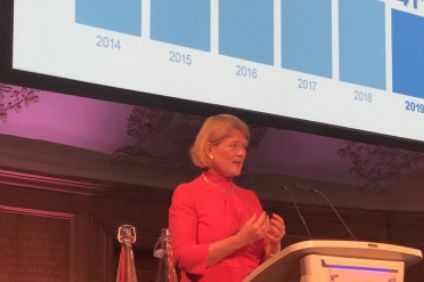 The UK government body overseeing the behaviour of the country’s large supermarket chains has set out a new compliance strategy.
The UK government body overseeing the behaviour of the country’s large supermarket chains has set out a new compliance strategy.
The Groceries Code Adjudicator (GCA), Christine Tacon, told the organisation’s annual conference in London yesterday (24 June) that her aim is to drive effective top-to-bottom compliance risk management by the retailers she regulates.
However, it has led to concerns that the changes are effectively ushering in self-regulation.
Tacon, who confirmed she will step down in 2020 after seven years in the role, said that in her final year she is committed to working with each of the 12 large retailers to ensure all their practices, systems and behaviours are designed and structured to meet their obligations under the Groceries Supply Code of Practice (GSCOP).
She told conference delegates: “I am introducing a common factors approach to guide their compliance risk management activity.
“However they are set up, I want to see the retailers build for themselves a whole-organisation approach to code compliance. This puts their compliance management thinking into their overall governance structures, their legal and audit functions, as well as their internal systems and processes into their training and their communication with suppliers.
“This is the best way to make sure that breaches of the code don’t happen and if they do, that they are quickly picked up and put right. It means retailers doing the right thing not only because that is what is required of them, but because it makes good business sense.”
Tacon set out her vision after her organisation’s annual survey revealed continuing improvement in retailer behaviour. For the second year running only four out of ten suppliers reported having experienced an issue at any point in the year.
Last year’s top concern for suppliers – delay in payments – fell from 19% to 13% in a period when the retailers’ response to the issue was under formal monitoring by the GCA. Forecasting is now the issue most reported by suppliers, and that, too, has continued to decline.
However, some concerns have been expressed about the direction in which the GCA is heading in terms of regulation.
Trade justice organisation Tradecraft in Depth tweeted: “We must oppose moving back to the failed model of industry self-regulation.”
Andy Coyne
Aldi tops GCA annual survey for 6th year with Co-op the most improved
Farmers Guardian – 25th June 2019

97 per cent of suppliers said Aldi complies consistently well or mostly well with the code.
Aldi has topped the Groceries Code Adjudicator (GCA) annual survey for the sixth year, with 97 per cent of suppliers stating the retailer complied well or mostly well with the Groceries Supply Code of Practice (GSCOP).
B&M came bottom with 81 per cent of suppliers saying it complied well or mostly well.
And the GCA, Christine Tacon, was looking to work with retailers to ensure all their ‘practices, systems and behaviours are designed and structured’ to meet their obligations as she enters her final year in the role.
It comes as the annual survey revealed continuing improvement in retailer behaviour, with only four in ten suppliers reporting experiencing an issue for the second year.
Concerns
Last year’s top concern for suppliers – delay in payments – fell from 19 per cent to 13 per cent.
Forecasting was now the issue most reported by suppliers but it has also continued to decline.
Co-op was the top improver, after significant scrutiny from the GCA following a year-long investigation which found it had breached the code.
Ms Tacon said Co-op’s should be pleased the steps it has taken were being noticed by suppliers.
She added the investigation could be a ‘game-changer’ for the sector.
“The root causes I identified as a result of that investigation showed the extent to which the retailer had failed to take charge of its own Code compliance,” she said.
“Opportunities to manage and minimise its compliance risk had been missed, and themes emerged which were not only common to Co-op’s breaches of the two paragraphs of the Code I investigated, but also familiar to careful readers of my previous two case studies.
“I now intend to build the lessons I learnt into my approach with all regulated retailers. I want to leave this role having achieved all I set out to do – and more.”
Future
She was also planning to examine how the code should apply to the buying alliances, joint ventures and merged entities run by the retailers.
On the debate as to whether the role of the GCA should be extended she said it would mean ‘significant change’ in the way the work was done.
She said it would mean altering the levy funding model and the collaborative approach she had established would not have been possible with a larger cohort or regulated businesses.
“And thought would have to be given to the fit between any new price-based measures and the competition position underpinning everything the GCA is currently established to do,” she added.
Julie Ashfield, managing director of buying at Aldi, said: “We are incredibly proud to have topped the GCA’s annual survey every year since its inception six years ago. This reflects the close relationship we have with suppliers, which is built on mutual trust and understanding.
“The partnerships we have established with our suppliers over many years allow us to source the very best products for our customers.
“As we move towards our long-term target of 1,200 stores by 2025, this presents an opportunity for our suppliers to grow with us too.
“We currently source from more than 1,000 British businesses and look forward to working with many more in the coming years.”
Alex Black
Retail supplier complaints hit new low
Fresh Produce Journal – 24h June 2019
 Aldi again named most Code-compliant supermarket in annual report by Groceries Code Adjudicator
Aldi again named most Code-compliant supermarket in annual report by Groceries Code Adjudicator
The number of supplier complaints against supermarkets has fallen to a new low, the Groceries Code Adjudicator’s new annual report indicates.
The report, presented today by Adjudicator Christine Tacon, revealed a reduction in complaints from all nine of the most-reported areas of concern in the past year. Issues around forensic reporting are at a low of just seven per cent (2014: 45 per cent), margin maintenance is at eight per cent (2014: 36 per cent), ‘pay to stay’ has fallen to five per cent (2014: 25 per cent) and payment delays has dropped to 19 per cent (2014: 35 per cent).
In a further sign of progress, only two retailers were rated by suppliers as being below the level of the best-performing retailer.
The four most-improved retailers – who Tacon said had been subjected to increased scrutiny or enhanced engagement – were Tesco, Morrisons, Asda and the Co-op.
Tacon said she no longer had any single top issue of concern, but that she would continue to monitor the performance of all retailers in relation to delay in payments, forecasting and promotions.
Delayed payments was listed as the number-one most complained about issue by suppliers in 2018, followed by issues around forecasting, de-listing and variation of supply chain procedures without reasonable notice.
Aldi top on compliance
Aldi was rated the supermarket which was best complying with the Groceries Supply Code of Practice, followed in order by Tesco, Waitrose and Sainsbury’s. Iceland finished bottom of the list, behind the Co-op.
In terms of supplier perceptions of which stores conducted relationships fairly and in good faith, Aldi was again voted the best, ahead of Waitrose and M&S. Iceland and the Co-op again occupied the bottom two positions.
The Adjudicator also concluded its investigation into the Co-op this year, stating that the retailer needed to take a “very different approach to Code compliance”. “I have made robust recommendations for urgent action and I will be helping Co-op to change its approach by monitoring closely how it implements those recommendations,” Tacon said.
Of the results, Julie Ashfield, managing director of buying at Aldi, said: “We are incredibly proud to have topped the GCA’s annual survey every year since its inception six years ago. This reflects the close relationship we have with suppliers, which is built on mutual trust and understanding.
“The partnerships we have established with our suppliers over many years allow us to source the very best products for our customers.
“As we move towards our long-term target of 1,200 stores by 2025, this presents an opportunity for our suppliers to grow with us too. We currently source from more than 1,000 British businesses and look forward to working with many more in the coming years.”
For the year ahead, Tacon said: “There will be no letting up. As well as assessing the response on the monitored top issues I will be working closely with Co-op to ensure it fully implements my recommendations and I will be sharing the learnings with retailers and suppliers.
“During the year the government will also conduct a second statutory review of the GCA’s performance to cover the period April 2016 to March 2019 and I encourage all those with an interest in the work of the GCA to give their views.”
Tacon also confirmed that she will be stepping down as Adjudicator next year after seven years in the role.
Suppliers call for Amazon to be regulated by Groceries Code Adjudicator
Yorkshire Post – 24th June 2019

Food and drink suppliers have called for online giant Amazon to come under the watch of the grocery industry regulator.
Amazon and Boots were the two retailers which received the most requests from suppliers to come under the remit of the Groceries Code Adjudicator, according to its annual survey.
The finding comes as adjudicator Christine Tacon admitted that there is more scope for the Groceries Code of Conduct to cover more than the 12 retailers currently facing scrutiny by the code.
There were calls from 12 grocery suppliers to scrutinise the conduct of Amazon, while 10 suppliers wanted to introduce Boots to the remit of the code. There were a number of other recommendations for retailers including Home Bargains and Booths.
Over the past 12 months, the competition regulator, the Competition and Market Authority (CMA), forced Ms Tacon to scrutinise B&M and Ocado under the code of conduct.
B&M, which recently withdrew its attempt to appeal against the CMA decision, was ranked the worst of the 12 major grocery retailers for its overall compliance to the set of industry standards, according to the survey of suppliers.
Only 25 per cent of suppliers said that B&M met the expected standard of conduct “consistently well”, according to the survey.
Tesco also saw itself slide slightly in a leaderboard of the overall conduct by the retailers, after some retailers commented to say they were “unhappy” about how its multimillion-pound merger with wholesaler Booker led to confusion.
Ms Tacon, inset, said, however, that responses from suppliers have been their best yet, with a significant reduction in the number of suppliers impacted by delayed payments.
The Co-op was the retailer which improved the most over the past year, according to the survey, months after the GCA announced the retailer breached the grocery code.
The survey also highlighted fears from suppliers that they may face repercussions from retailers for raising concerns, after 43 per cent of suppliers said they are not sure if they would actually report issues to the GCA. Ms Tacon, who has now entered her final year in the role, said there is still a significant future for the GCA amid questions over whether it is necessary as compliance officers within retailers take on more responsibility.
She said: “The statutory review is taking place, but I am absolutely sure they will see the importance of the role, because of the positive response we have had from suppliers. We received more survey responses from suppliers than ever. Suppliers don’t want their policemen against bad behaviour being taken away, even if retailer behaviour has significantly improved.”
The UK food and grocery industry is forecast to grow by £24.1bn, or 12.5 per cent, by 2024, bringing the market to a total value of £217.7bn, according to the latest forecasts from research organisation IGD.
Groceries Code Adjudicator to step down
Food Manufacture – 24th June 2019
Read the full article here.
By Rod Addy
Retailers to be given 'self-policing GSCOP role as Adjudicator steps down
The Grocer – 24th June 2019
 Read the full article here.
Read the full article here.
Christine Tacon could face plenty of flak in the BEIS review of the GCA
The Grocer – 21st June 2019
 Read the full article here.
Read the full article here.
Waitrose and Ocado to sign up to supplier audit respite pledge
The Grocer – 20th June 2019
 Read the full article here.
Read the full article here.
Christine Tacon: suppliers can learn from GSCOP-regulated retailers on payment terms
The Grocer- 30th May 2019
The regulated retailers have told Tacon that being code compliant has improved their internal efficiency.
Read the article here.
As next GCA league table looms, here's what suppliers need to look out for
The Grocer – 29th May 2019
In six years, Tacon’s collaborative approach has improved retailer compliance and seen millions returned direct to victim suppliers. It is not just working, it has become the envy of many other countries
On 24 June, at the Grocer Code Adjudicator’s annual conference, we will see the new league table of retailer compliance.
It is based on 1,200 entries in this year’s survey, and if you don’t know about it, be aware your retailers take a huge interest.
I can remember writing that Christine Tacon’s collaborative approach would take years to work, and calling for fines. Six years on, not only do we see it working, it is the envy of many other countries. In five years of the survey, the best-case retailer compliance scores have risen from 90% to 97%, while worst-case compliance has risen from 58% to 84%. It’s a testament to the GCA’s philosophy of ‘encouragement vs penalty’, motivating retailers to clean up their act.
As a GSCOP trainer I know the code is utterly vague. But a highlight for me is that the GCA used this vagueness to find a home for any wrongdoing in its loosely worded paragraphs. Also, Tacon has not fined any retailers, knowing the money would go to the Treasury. She has insisted instead that millions be returned direct to victim suppliers.
I recently asked Christine about the highs and lows of the role and she told me: “The highs are suppliers saying ‘thank you’. Many people say things have changed so much for the better in five years, even though the market gets ever tougher. That’s why I do the job. The low is receiving criticism for not doing what I can’t do!”
This later comment refers to the fact that whilst six BEIS ministers have mostly stayed out of her way, including Jo Swinson and Anna Soubry, Defra and others have constantly pressured to extend the role down to farmers, demonstrating a complete misunderstanding of the code and its role.
A frustration for the GCA has been suppliers’ reluctance to engage due to the ‘climate of fear’ of reprisal. Even now the office only gets about three calls a week. So, ready to try new things, the GCA’s first webinar went ahead in April.
So for suppliers: go to the 24 June GCA conference and meet the retail code compliance officers, who will be staying after lunch for 10-minute sessions. Make the league table a top-to-top agenda item. The retailers’ top brass are serious about it. And sign onto the next webinar, on 3 July, to get involved in the live interaction.
The league table, though, has been remarkable.
Iceland, which has been on or at the bottom, is changing its trading terms for simplicity to impact better supplier engagement and move up. Morrisons introduced a supplier charter after having its knuckles rapped to remedy its ‘bottom end’ reputation.
At the top, Aldi has been ahead all five years of the table. Perhaps it has an advantage with the simplicity of its business, but I know that the Aldi senior team is proud to be at the top of that list, and eagerly wait to see if they have remained. Yes, they play hard in negotiation, but they are fair in implementation – that’s how it should be.
And my predictions? Aldi will indeed remain at the top of the league. Fallers will be Tesco and Co-op, and the risers will include Iceland.
David Saples
IOD Director Of The Year Finalist

Groceries Code Adjudicator Announced as IOD London and South Director of the Year Awards Finalist
Christine Tacon has been shortlisted for the public sector director of the year at the 2019 IoD London & South Director of the Year Awards.
The finalists were chosen from the hundreds of directors that entered or were nominated across nine different categories.
The expert judging panel will now convene to decide the overall winners to be announced at the awards ceremony on Thursday 20 June 2019 at the iconic 116 Pall Mall, the home of the Institute of Directors.
David Stringer-Lamarre, IoD London Chair said: “After a year of BREXIT ups and downs for business, it’s inspiring to see so many UK directors leading the way in good governance, leadership & business performance.”
The winners from each of the thirteen categories will be automatically entered into the UK finals of the IoD Director of the Year Awards, providing the finalists with additional exposure and profile on a national stage as the ‘best of the best’ in British business.
Visit www.iodawards.com/london-south for a full list of finalists and details on how to attend the event.
The Times: 16/05/2019
MPs upset as groceries watchdog rejects extra powers
The grocery regulator has clashed with MPs after they accused her of not being willing to take on powers that would provide more extensive protection to supermarket suppliers.
The business, energy and industrial strategy committee expressed frustration with Christine Tacon, the Groceries Code Adjudicator, after she said she did not need any more powers and resisted offering a view on a number of issues affecting suppliers.
In a testy hearing yesterday Ms Tacon told MPs that they were being “dismissive of what has been achieved” and that she was being asked for opinions on “areas I am not working in”.
The GCA was set up in 2013 to improve the treatment of suppliers. Ms Tacon regulates the treatment of suppliers by retail companies with an annual groceries turnover of more than £1 billion.
Ms Tacon, 59, said there had been improvement on every metric she looked at, and only two of the 12 retailers she regulates were performing worse than the most compliant was five years ago.
“You will not find a supplier in the country that supplies the regulated retailers that doesn’t say there’s been a dramatic change,” she said. “We are the envy of very many other countries.”
Since 2015 the GCA has had the power to fine supermarkets up to 1 per cent of their annual sales. It has run two inquiries, into Tesco and the Co-operative Group, but has yet to levy a fine. The Tesco inquiry covered a period before its fining powers were granted.
Ms Tacon told MPs she intervenes informally “all the time” on behalf of suppliers , including an instance in 2015 where Ms Tacon asked David Potts, the chief executive of Morrisons, why “lump sum” payments were being demanded to “hit half-year figures”.
She said this “stopped overnight”, with Morrisons conducting an internal investigation using a third party and paying money back to suppliers. Ms Tacon was responding to MPs who were asking for her views on issues such as lengthy payment terms and downward price pressure put on suppliers, issues that she said were outside her remit.
Ms Tacon said her remit could be expanded to cover more retailers so there was a “level playing field” but told MPs: “I do not believe I need more powers.”
Rachel Reeves, committee chairwoman, said suppliers being treated properly went beyond the code. She added: “It is perhaps a bit surprising that six years into your role you’re happy the powers you were granted then are the right powers for a very different market.”
Peter Kyle, the Labour MP, said: “It’s really extraordinary to hear a regulator say they don’t need any new powers . . . particularly in a market where we know exploitation of suppliers is rife.”
Sir Patrick McLoughlin, a Conservative MP, said it was a “pity” when Ms Tacon admitted she had not had any discussions with the Competition and Markets Authority over the proposed merger between Sainsbury’s and Asda.
James Hurley
Watch the full committee hearing here.
Farmers Guardian: 03/05/2019
Gender equality: Why British agriculture is in need of a culture change
With gender equality in the workplace rising up the agenda, Christine Tacon spoke to Olivia Midgley about why she thinks agriculture is in need of a culture change.
Throughout her 40 years in business, Christine Tacon has enjoyed senior roles at some of the world’s biggest companies, including Mars, Vodafone and Anchor/Fonterra.
She is also renowned for spearheading the transformation of Co-operative Farms, taking the business from a £6 million loss, to a £6m profit. The business was later sold to the Wellcome Trust for £249m in 2014.
Now, alongside her role as Groceries Code Adjudicator (GCA), she helps other women negotiate the world of business, specifically in food and agriculture.
Drawing on her family’s own experience has been a key driver. Her mother, probably driven by the shortage of food in the post-World War Two years, wanted to work in agriculture and joined the Land Army before taking her agricultural degree. She worked for the Ministry of Agriculture, Fisheries and Food, advising dairy farmers on how to increase milk yields. But that work soon came to an end when she married Christine’s father at the age of 29.
Mrs Tacon said: “She had to give up her job, because the civil service expected women to resign on marriage. Unbelievably, that rule existed in the Foreign Office until 1973.
“Listening to her made me determined I was not going to choose between work and family. And certainly I was not going to have someone else make that decision for me.”
Mrs Tacon was drawn to science and engineering and worked for various companies while working her way up to director level.
While sexism was, at times, present in the workplace – she was once told to wear a skirt instead of jeans while working in a high precision zinc die casting factory – she does not feel her gender has ever been a barrier.
Diversity
She said: “I resolved that I did not want to change the person I was to fit in. We need women at senior levels to change the dynamic, not to become men in skirts. Coming at the job in a different way is what diversity is all about.”
When Mrs Tacon had her first child she was the only female director of global firm Redland. The company had to introduce a maternity package especially for her.
“Nowadays there is a more generous statutory maternity pay policy and many businesses have policies that go further than this. How things have changed in two generations, from losing your job if you married to shared paternity leave,” she added.
Mrs Tacon feels ‘lucky’ to have been confident in her own ability and was always happy to challenge the way things were done. Even when working in large multinational businesses, she succeeded in effecting change.
“I never considered that I had been disadvantaged throughout my career due to being female,” she added.
“On the contrary; I think I have often been noticed for being a competent female.”
Recent role
It is an attitude she has brought to her most recent role as GCA.
As the Government’s regulator, she has the power to investigate code breaches and fine up to 1 per cent of turnover – £0.5 billion for a retailer such as Tesco.
Rather than using a ‘big stick’, she said she has always taken a measured and business-like, collaborative approach.
“There could, of course, be some correlation here that women prefer non-confrontational styles. I have only done two investigations in five and-a-half years,” she said.
“But I have achieved significant change through what I deemed as a collaborative approach working with the supermarkets I regulate. I showed them how I wanted them to change rather than trying to catch them out.”
Looking ahead
In the future, Mrs Tacon thinks some businesses may need a shift in culture in order to support women – and that will take time.
She said: “The culture needs to change. But it will not change overnight. The law is on our side, but we all have to help make baby steps of progress, nudging business forwards.”
Mrs Tacon believes nurturing new talent is important. She runs the Women in Food and Farming group, which helps members develop skills and knowledge in what is still a male dominated industry.
She also chairs MDS, a not-for profit business which recruits and trains graduates in the food sector, many of them young women.
But she also admits to have been ‘gender blind’ in the past and even declined invitations to join groups to promote women.
“I wanted to be accepted for what I did, not because I was female. But I now believe that was an arrogant approach. Just because I had the confidence to be myself in a man’s world, does not mean that everyone shares that same confidence.”
Olivia Midgley
News from the Adjudicator
Report of the investigation into Co-operative Group Limited
Read the full report here.
The Times: 26/03/2019
Co-op escapes fine despite adjudicator’s scathing criticism

The Co-operative Group has avoided a fine from the grocery regulator despite being found guilty of “widespread” failings in how it treated its suppliers.
A year-long investigation by the Groceries Code Adjudicator found that the supermarket had dropped suppliers’ products without due notice, levied unfair charges on them and unreasonably varied their supply deals.
Christine Tacon, the adjudicator, ordered the Co-op, which prides itself on its ethical behaviour, to introduce “major changes” to the way in which it engages with suppliers but stopped short of making the group the first to be fined for breaches of the legally binding code of practice, which covers Britain’s 12 largest grocers.
Ms Tacon, 59, said that the Co-op’s actions were “not malicious” and that it had repaid suppliers, which had been charged fees unfairly. The Co-op is Britain’s largest mutually owned business by membership and had sales of £9.5 billion in 2017. Its grocery arm is the UK’s fifth biggest food retailer, with more than 2,500 stores.
The investigation was only the second inquiry by the GCA since it was set up in 2013 and the first since it was given the power to fine supermarkets up to 1 per cent of their annual sales.
Ms Tacon was highly critical of the Co-op’s “serious” mistreatment of suppliers, saying that they had been dropped or seen their sales volume cut with “no notice or short, fixed-notice periods that were not reasonable”.
While many suppliers managed without suffering a significant financial blow, others incurred large costs, including one that suffered a £200,000 hit, she found. Large and small suppliers alike were mishandled, Ms Tacon said, as compliance with industry rules had become a “box-ticking exercise” while the group was trying to recover from a crisis that began in its banking arm in 2013. “Quality control” fees were also applied without justification.
Ms Tacon said that weaknesses in training, policies and processes for the supermarket’s buyers and “poor functioning” of the group’s IT system contributed to the problems.
Jo Whitfield, 50, chief executive of Co-op’s food business, has apologised to suppliers and refunded £650,000 to those affected. She said: “We were focused on rescuing the Co-op and doing right by consumers but we should have also given more thought to the potential impact those planned changes would have on our suppliers. We tried to move more quickly than our systems, processes and people could handle.”
Ms Tacon ordered the Co-op to make changes to its governance, audit and IT systems and to overhaul training of its buyers, and improve the way in which it communicates decisions to remove products with suppliers.
The group will have to pay the £1.3 million cost of the investigation as well as associated costs.
Behind the story
Supermarket buyers who didn’t understand legally binding industry rules. Suppliers dropped without fair warning. Fees charged without explanation. A creaking IT system that left staff unable to do their jobs properly (James Hurley writes).
As the groceries code adjudicator Christine Tacon found, the Co-operative Group’s supply chain failures were “serious” and “widespread”. So why no financial penalty?
Ms Tacon has been in her role, which was created to improve supermarkets’ treatment of suppliers, for almost six years but the Co-op is her first formal investigation since she was given the power to impose fines. She says the Co-op’s transgressions were “not malicious” and that its agreement to repay wronged suppliers and to implement a series of improvements is a much better outcome for the industry than simply issuing a fine that would go to the Treasury.
Yet these outcomes need not be mutually exclusive and a fine might be a good signal to send to errant supermarkets.
The Grocer: 26/03/2019
GCA got the right result on Co-op code compliance breaches
Read the full article here.
by Ronan Hegarty
The Times: 02/11/2018
Ocado and B&M join grocery code
 The supermarket industry watchdog is to start monitoring how Ocado and B&M Homestores treat suppliers after their respective annual turnovers passed the £1 billion mark.
The supermarket industry watchdog is to start monitoring how Ocado and B&M Homestores treat suppliers after their respective annual turnovers passed the £1 billion mark.
The Competition and Markets Authority (CMA) said that Ocado, the online grocer, and B&M, the cut-price retailer, would be bound by the Groceries Supply Code of Practice, which governs how suppliers are treated to avoid abuses of power.
For example, retailers bound by the code cannot make changes to the terms of supply retrospectively and must provide notice and give reasons when cancelling a supplier’s contract.
Compliance with the code is managed by the independent Groceries Code Adjudicator, led by Christine Tacon. Her office was set up in 2013 with powers to oversee the behaviour of ten supermarket groups, arbitrate on disputes and fine errant grocers. Its biggest investigation was into Tesco, the country’s largest grocer, which it found guilty of “serious breaches” of industry rules in 2016 as it sought to flatter its financial performance
Peter Hill, the CMA’s head of remedies enforcement, said: “These rules mean that suppliers are protected from unfair business practices, and retailers can trade with confidence on a level playing field. Businesses supplying Ocado and B&M will now also benefit from this protection.”
The decision to bring them within the code will bolster J Sainsbury’s argument that it needs to complete its merger with Asda, which will come under scrutiny by the CMA, to stay ahead of the competition.
B&M declined to comment. Its shares closed up 7 ¼ p at 424p. Ocado did not respond to requests for comment. It closed down 8½p at 846¾p.
Simply Supply Chain: 30/10/2018
Letter to The Grocer, October 2018
Dear Sir
As reported last week in The Grocer ‘Women in Agribusiness Award’ the USA appear to have recognised Christine Tacon, The Grocery Code Adjudicator’s, impact on the UK Grocery retailers more fully than some of our own institutions….
As a representative of all chilled suppliers, I chair the Drop and Drive Claims Workgroup; we have been a direct beneficiary of Christine’s support to promote our campaign to eliminate unsubstantiated deductions as part of her drive to reduce delays in payments, and have seen these fall by up to 90% for those engaging in the Good Faith Receiving programmes available.
The GCA’s remit is currently under review with a number of additional retailers who sell more than £1bn in ‘Grocery’ products likely to be included, and therefore required to operate according to Christine’s established interpretation of the Grocery Code.
The definition of ‘Grocery’ is itself apparently open to interpretation and I understand the CMA is still trying to assess what sources of data are eligible to help determine whether a retailer should be included in the expanded remit. The ‘blurred line’ applies to those retailers who offer a range of products that include those found in the established grocery retailers, but whose sales are not included within the current definition of ‘grocery’ sales as captured by market research reports.
One such retailer which has avoided inclusion to date is Amazon. As a consumer, its excellent customer service and range of products is clearly extremely attractive and a significant proportion of its £2bn sales in 2017/18 must surely fall into this broader definition of grocery. As a supply chain consultant working with manufacturers and retailers, I have yet to encounter an organisation that appears to be in breach of so many elements of the Grocery Code, and so reluctant to communicate, let alone work with, its suppliers to correct its own data errors that appear to be the root-cause of many of their trading conformance breaches, which they so liberally fine suppliers for, without opportunity for redress.
We have seen how effective Christine has been with the 10 retailers who are working diligently to conform to the Grocery Code. It would be remiss if suppliers missed the opportunity to write to the CMA sharing the evidence of their sales to Amazon consumers (both directly and indirectly) in the UK, so that the CMA are made aware of the true sales of ‘grocery’ products through its platform. Only then can they be bound to the same standards that the rest of the retailers are now adopting, because it is the ‘right thing to do’ ethically and commercially.
I urge you to pick up your pens and contact the CMA immediately, as this opportunity may not present itself again for another few years, by which time it could be too late.
Jonathan Kittow
CEO Simply Supply Chain
The Grocer: 12/10/2018
Amazon should face Adjudication over conduct, claim suppliers
Read the full article here: Amazon Article
Demeter Award of Excellence
Women In Agribusiness Demeter Award of Excellence 2018
 Hailed as a “dynamic businesswoman who has had a major impact in agribusiness and the food sector”, Christine Tacon is credited with transforming the largest farmer co-operative in the UK from operating at a huge loss to ending with an $8 million profit, and a $30 million increase in revenue. She also took on the role as the first ever sector regulator in the UK, bringing fairness to the relationship between direct suppliers and the country’s 10 biggest supermarkets by enforcing a Groceries Supply Code of Practice. Her success in pursuing breaches of the Code has been proven in annual surveys that show issues experienced by suppliers have been cut in half, and the number of retailers complying with the Code has risen dozens of percentage points.
Hailed as a “dynamic businesswoman who has had a major impact in agribusiness and the food sector”, Christine Tacon is credited with transforming the largest farmer co-operative in the UK from operating at a huge loss to ending with an $8 million profit, and a $30 million increase in revenue. She also took on the role as the first ever sector regulator in the UK, bringing fairness to the relationship between direct suppliers and the country’s 10 biggest supermarkets by enforcing a Groceries Supply Code of Practice. Her success in pursuing breaches of the Code has been proven in annual surveys that show issues experienced by suppliers have been cut in half, and the number of retailers complying with the Code has risen dozens of percentage points.
Tacon also is the chair of Management Development Services, a recruitment and training provider for graduates of the food and produce sector, and non-executive director of Anglia Farmers, a $350 million farm-purchasing co-operative. Additionally, she is the founder of Ladies in Agriculture, created to facilitate networking and mentorship opportunities.
The Grocer: 31/08/2018
Christine Tacon wins Women in Agriculture Award of Excellence

Groceries Code Adjudicator Christine Tacon has won a major international award for her “dynamic” work.
Tacon, who took up the role in 2013, was nominated by peers to receive the Women in Agribusiness Demeter Award of Excellence in the US.
The honour, which will be awarded in her absence in Denver, Colorado, later this month, recognises those who have achieved excellence in their field or demonstrated an “extraordinary contribution to the agribusiness industry”.
Tacon, who ran the Co-op farming business for more than a decade, was said to have transformed it from operating at a huge loss to ending with an “$8m” profit, and a “$30m” increase in revenue. She is now conducting an investigation into its treatment of suppliers.
The WIA added: “Her success in pursuing breaches of the Code has been proven in annual surveys that show issues experienced by suppliers have been cut in half.”
Tacon is also the chair of Management Development Services, a recruitment and training provider, and non-executive director of Anglia Farmers.
Ian Quinn
The Grocer: 29/06/2018
As retailer behaviour improves should the Adjudicator go harder or go home?
The Grocer: 28/06/2018
Holland & Barrett accused of ‘tarnishing’ Groceries Code
The Grocer: 25/06/2018
Sainsbury’s drops behind Tesco for code compliance
The Grocer: 21/06/2018
Adjudicator hits out at retailer and supplier use of ‘costly’ arbitration process
The Grocer: 21/06/2018
Extended Adjudicator remit confirmation will soothe Burnley and Coupe’s aches
The Grocer: 15/06/2018
Adjudicator role changes could cause a clash with retailers
Curbing supermarkets power: is punishment the answer? TEDxMacclesfield
31st May 2018
As the first supermarkets adjudicator in the UK, Christine Tacon decided to break from regulatory tradition. Rather than enforcing the rules by threatening big retailers with investigations and fines she forged a new approach.
The Grocer: 02/05/2018
As suppliers face Sainsbury’s-Asda squeeze, who can help them?
 Adjudicator Christine Tacon said today that size did not matter when it came to the prospect of her protecting suppliers from a combined Sainsbury’s and Asda behemoth.
Adjudicator Christine Tacon said today that size did not matter when it came to the prospect of her protecting suppliers from a combined Sainsbury’s and Asda behemoth.
“Size makes no difference to my ability to regulate them,” Tacon told members of the Environment, Food and Rural Affairs Committee when asked by chairman Neil Parish what she planned to do to stop the companies “stitching up” their supplier base.
In fact, the Adjudicator even suggested to MPs that the small matter of the combined giant taking up more than 30% of the market might actually work in her favour.
“With my penalty powers I have the ability to fine in a way that’s going to hurt.
“One per cent is a lot of money for them,” said Tacon. “In fact I would argue that the larger a retailer the more they are likely to embed IT and processing systems towards being Code compliant.”
Tacon told MPs she hoped the result of the merger, if it goes through, might be to see Asda move from the bottom of the Adjudicator’s league table of behaviour to sit alongside Sainsbury’s close to the top. But the MPs seemed to fail to grasp the grim reality as far as suppliers are concerned.
That is that the Adjudicator is pretty much a spectator when it comes to stopping Sainsbury’s and Asda from what another member of the committee described as, in none-too-parliamentary terms, “screwing suppliers into the ground”.
Although at times she must have felt like she was speaking to a brick wall – and you could argue it would have just about the same impact – Tacon made it clear that price negotiations have always been outside her remit.
Mike Coupe has already suggested Asda and Sainsbury’s will be able to reduce prices by 10% across many everyday products, by making full use of their ability to squeeze their top 100 suppliers – 85% of which are the same for both companies. So is there anything to save those suppliers from Old Man Depression?
Worryingly, if you are one of them, the only sunshine on the horizon would appear to be the possible intervention of the CMA.
But when it launches its investigation into the proposed takeover, to what extent will its thinking be based on this issue of potential unfair treatment of suppliers, rather than the traditional grounds of reduced competition for consumers?
Most experts seem to think that, as with previous takeovers, the issue of store crossover and a potential reduction in consumer choice will be at the forefront of the CMA’s probe. This could result in Sainsbury’s and Asda being forced to sell off stores. (Though who will buy them, given the way the race for bricks and mortar space among supermarkets has ground to a halt, is up for question.)
But will the probe give equal priority to the potential threat of a serious lessening of competition, due to the impact on suppliers?
Will the impact of a Sainsbury’s-Asda “duopoly” on suppliers’ margins, their ability to put money into innovation and more fundamentally the reduction in the number of their routes to market, be a deciding factor?
As with a lot of the CMA’s rationale, there is very little in black and white to suggest how the authority may look beyond pins on the map to decide whether the merger gets the go-ahead.
But for those suppliers wondering how they will face up to not just one, but two grocery giants with 30% of the market, don’t expect the Groceries Code Adjudicator to be able to ride to your rescue. Whether MPs get it or not, she is powerless to intervene.
Ian Quinn
The Grocer: 30/04/2018
How scared should suppliers be about the Sainsbury’s-Asda merger?
Sainsbury’s doesn’t much like its suppliers. Harsh, perhaps. But it’s got form, going back years, particularly on the branded side, where it’s regularly gone out of its way to drive customers towards own-label lines, through ad campaigns, till vouchers and other mechanics.
It’s also appeared the most irritable and threatening (at least publicly) towards suppliers who chose to engage with the discounters over the years.
 Oh, and Sainsbury’s was the only major multiple not to participate in The Grocer’s Supplier of the Year 2018 competition (the winners, announced last week). You might think it would want to give some credit to its best-performing suppliers. And buyers from nine of the top 10 multiples responded (as well as many other smaller retailers, wholesalers and buying groups). But not Sainsbury’s. It’s above such niceties, apparently.
Oh, and Sainsbury’s was the only major multiple not to participate in The Grocer’s Supplier of the Year 2018 competition (the winners, announced last week). You might think it would want to give some credit to its best-performing suppliers. And buyers from nine of the top 10 multiples responded (as well as many other smaller retailers, wholesalers and buying groups). But not Sainsbury’s. It’s above such niceties, apparently.
So it was no surprise to hear Sainsbury’s CEO Mike Coupe identify suppliers as the greatest source of leverage in its shock merger with Asda. While insisting there will not be job cuts at Sainsbury’s and Asda (Coupe said its experience with Argos, which now employs more people than it did prior to the acquisition, was instructive), and with no store closures planned thanks to its “sweetheart” geographic fit, that puts the onus on suppliers to achieve the 10% price reduction on everyday lines that it’s held out as the most juicy and public-facing component of its ‘sharpened’ proposition.
Suppliers would deliver £350m of net synergies out of the £500m total he explained. But the gross synergy figure is much higher, in order to fund that 10% price reduction.
Yet he insisted the Sainsbury’s-Asda merger was a “great deal” for suppliers, driving greater efficiency, streamlining supply chains, enabling differentiated ranges, and the opportunity to grow sales via a more attractive proposition that would simultaneously boost footfall.
Unfortunately, lots of suppliers don’t buy that, and have been contacting The Grocer (and other media channels) to voice their concerns.
Coupe was at pains to point out he expected these synergies to come from “large, multinational suppliers, who make spectacular returns on equity and are very, very profitable. What we are trying to do is to identify synergies from those suppliers and reinvest them into UK customers.”
In other words, Coupe will take on those beastly, big, foreign suppliers on behalf of British customers.
Extra volumes
Also, the synergies would result not from seeking price reductions as a reward for extra volumes, he explained. Rather, they will come from “harmonisation” or “equalisation” of terms. The due diligence process – hosted via an anonymised, third party ‘black box’ process, to avoid competition abuse – has given both parties “a pretty good idea of the buying synergies”, he said.
“We know the arithmetic. What we don’t know is who’s buying better where. That’s all stuff to work through. But what we know is that equalising prices on the same products, the money’s there.”
He added: “We think we will be a force for good, not just in how we compete, but in terms of resilience and the capacity to compete on any number of fronts.”
How Sainsbury’s chooses to use these synergies, ie the “fronts” on which it chooses to compete, is likely to be crucial.
As we’ve seen with Aldi and Lidl, their success has come primarily from competing in areas that are NOT dominated by large, multinational suppliers. In other words, on meat and fish, fruit and veg, which are dominated by smaller players, here and abroad.
Coupe insisted at the media conference this morning that Sainsbury’s had “good supplier relations and supported British producers extensively” but that hasn’t stopped the NFU from expressing its concerns vociferously. And it’s hard to square his insistence on the excellent “cultural fit” between the two businesses and Asda’s strong admonishment by the Groceries Code Adjudicator last year over supplier bullying.
The other awkward issue for Coupe is the margin that Sainsbury’s has always expected from its suppliers. As suppliers have regularly told us, part of the reason Sainsbury’s cannot seem to compete with the discounters is the gross profit it expects to make: it often buys more cheaply but sells at a higher price, they tell me.
A ’protect choice’
On the other hand, the Sainsbury’s-Asda transaction would “protect choice”, Sainsbury’s argues, on the basis that as a supplier you’re likely to flog a far wider range of goods via a thriving full-service supermarket than if you backed the discounters with their limited ranges.
That’s long been the argument Sainsbury’s has held for supplier support.
But “while everyday value items – those that supermarkets use as benchmarks and shape price image – are likely to drop,” says James Brown, head of the retail and consumer goods practice at pricing specialists Simon-Kucher, “beyond [these lines] the impact is not at all clear.”
The question is therefore: can the CMA trust a more powerful supermarket to act on behalf of the consumer across the piece, or will it use its heft there to close off competition more generally?
Over the next 12 to 18 months, that’s what we’ll find out.
Adam Leyland
The Independent: 30/04/2018
The Sainsbury’s-Asda merger goes to the heart of what we can expect from post-Brexit Britain
The business world seems to have been taken aback by the revelation of plans for a merger between Sainsbury’s and Asda, despite the proposal being seemingly well-advanced.
If the union proceeds, it appears likely that the separate brands will nonetheless be retained, which is a shame if you were hoping to shop at Assbury.
Plainly the retention of two such household names in the retail sector will ensure continuity of identity for customers – and for in-store staff. It may also be an advance sop to the Competition and Markets Authority (CMA), which is likely to initiate an investigation into a deal that will have a significant impact on the supermarket sector.
As things stand, Sainsbury’s and Asda both have about a 15 per cent share of the UK’s grocery market. Their combined clout will put them ahead of Tesco, which has been pre-eminent for years and currently has a market share of nearly 28 per cent.
Mike Coupe, chief executive of Sainsbury’s, is the man who will lead the merger. Amid scepticism about the likelihood of staffing cuts and the possibility that less competition in the sector could actually push prices up, Coupe has been sounding positive notes. No stores will close, he says, and no in-store staff will lose their jobs (which must be reassuring to those working in the accounts department). What’s more, prices will actually come down, he contends, “by around 10 per cent on many products”.
In short, the all-important customer will benefit. Nothing for the CMA to see here.
Unions, of course, will have something to say about that, as they go into bat for employees at risk of redundancy. There will also be considerable anxiety among supermarkets suppliers, many of whom have already been squeezed by the buying power of a dominant Big Four (Morrisons being the fourth).
It is less than a year since Asda was identified by the Groceries Code Adjudicator (GCA) as the worst major UK supermarket insofar as its treatment of suppliers was concerned. In September, the company repaid hundreds of thousands of pounds that it had demanded up front from suppliers in return for agreeing to stock products, after the GCA’s criticism.
A year before, Tesco had been on the sharp end of a GCA report after it found the firm had knowingly delayed payments to suppliers. Morrisons came under fire in 2016 too.
Sainsbury’s has built a stronger reputation, which may bode well in the merger talks. The other firms all say they are improving supplier relationships after those recent hiccups, which may suggest that the introduction of the GCA as an independent – but government-backed – regulator in 2013 has been effective.
Given that research last year by accountancy firm Moore Stephens found that 150 suppliers were forced to close in 2016 as a result of “predatory practices” by supermarkets, it is clear that further improvements are essential.
In this context the Sainsbury’s-Asda merger could, then, provide an opportunity. Certainly it will be so heavily scrutinised that there is a hefty imperative for management to show that it can develop relationships with suppliers that are symbiotic rather than confrontational.
Indeed, the treatment of food suppliers goes beyond questions about the present corporate cause célèbre. It even goes beyond the ethical requirement per se of supermarkets to behave responsibly. Rather, it goes to the heart – or at least could go to the heart – of what kind of Britain we are going to get post-Brexit.
After all, even allowing for the ongoing uncertainty over the withdrawal process (and the faint possibility of the UK not departing), it is surely time that we began to consider how we can resolve the identity crisis that has beset Britain in the last two years. For that to happen, both sides of the debate need to consider what a UK outside the European Union will look like.
In that future, agriculture, food and corporate fairness are all potentially important components, drawing on a historic strength, a present obsession and a sense of fair play that underpins many people’s idea of Britishness (and could do with a reboot).
Sainsbury’s and Asda, as two of this country’s best known and biggest brands, should consider their future with this backdrop in mind, not simply in the context of efficiencies, market share, share price and profit.
If they don’t, perhaps our future is with Europe after all – if Lidl and Aldi have anything to do with it.
Will Gore
NAMNEWS: 23/04/2018
Tesco Working To Ensure Booker Is GSCOP Compliant
Tesco is urgently working with buyers at Booker to ensure its newly enlarged business is compliant with GSCOP rules.
With the Code currently only covering the top 10 supermarkets in the UK, Booker’s activities have not previously been covered by the Adjudicator, Christine Tacon. However, having worked hard to improve its dealings with suppliers since the 2014 accounting scandal, Tesco is reported to have called for a “culture change” amongst buyers in the Booker operation.
Sources close to Tesco, quoted by trade magazine The Grocer, said talks have been held with Booker’s buyers as part of its ‘Joining Forces’ integration programme. They added that Booker’s previous behaviour had been allowed to go “under the radar” as the wholesaler operated outside the scope of GSCOP. However, they said Booker’s tactics as part of Tesco would now flout laws set up to protect suppliers, as it is in effect the same business.
Tacon told The Grocer she that was meeting with Tesco’s management imminently to discuss how Booker would become GSCOP compliant. She is quoted as saying: “I asked Charles Wilson about this on day one of the merger and he said it was day one and too soon. It’s no longer too soon, they are running out of time and I need some answers.”
The Grocer: 18/04/2018
Morrisons Boost Supplier Transparency with Online Portal
Morrisons has announced the launch of a new online supplier portal it claims will boost transparency and long-term relationships with its supplier base. The retailer said the move was a response to concerns from suppliers and followed other moves to simplify trading relationships in its supply chain.The free portal would include all commercial agreements stored in one, secure place, visible to both suppliers and Morrisons at the same time, it said.
It will use the portal for all information flow, handovers, delivery, approvals, reminders, filing and retrieval.
The new set-up will also include details such as promotions, cost price changes and agreements to invoice.
Morrisons said suppliers would be able to use the portal to access and view the progress of invoices; check whether invoices have been received; check if any queries need resolving; and whether invoices have been paid.
The move follows pressure from Groceries Code Adjudicator Christine Tacon, who in December urged all supermarkets to launch dedicated supplier helplines in 2018 to deal with issues such as delayed payments and disputed invoices.
Tacon called on retailers to follow the likes of Tesco and Asda in setting up dedicated helplines, as some suppliers feared raising matters such as compliance issues or delayed payment direct with buyers could lead to the threat of delisting.
Morrisons has more widely looked at how it deals with its suppliers following a probe by Tacon in 2016, which exposed demands for lump sum payments of up to £2m, though Morrisons escaped without a fine.
Other measures made by Morrisons to make its supplier relations simpler and more transparent since then include reducing the types of supplier income from 37 to three, revamping its supplier agreements and removing many of the charges that suppliers previously paid, such as for customer complaints.
Morrisons claimed it had been particularly successful in improving the number of suppliers paid on time, a figure it says is now at 99%.
“Three years ago, suppliers told us we could be easier to work with and we responded by setting out ambitions to buy and sell simply and establish lasting relationships with them,” said Michael Gleeson, Morrisons food trading director.
“Measures, such as our supplier portal, will make it easier to work with Morrisons and the initial response has been very positive.”
Gleeson added: “We will continue to listen to suppliers’ views and respond wherever possible.”
Ian Quinn
Articles written for the press
 Roythornes 1-2-3 with Christine Tacon
Roythornes 1-2-3 with Christine Tacon
Opinion and comment from Food and Drink leaders.
Read the full article here.
Financial Times: 12/04/2018
EU eyes crackdown on unfair practices by powerful food buyers
Brussels is proposing a crackdown on powerful food buyers that force predatory terms on small suppliers, in a move to protect producers that has alarmed some large European retailers.
Phil Hogan, EU agriculture commissioner, will on Thursday unveil a package of reforms to ban “unfair” contract terms and empower national authorities to police the conduct of big buyers such as supermarkets and food production companies.
The proposal would set minimum standards so member states can take action “to protect the more vulnerable [suppliers] in the food chain,” said Mr Hogan in an interview with the Financial Times. “If there are not unfair trading practices happening, then they [buyers] have nothing to fear,” he added.
Many small-scale food producers, such as dairy farmers or fruit growers, work on tight margins and have little bargaining power when they deal with the large companies that buy their products. This leaves them vulnerable to being squeezed on contract terms they have little choice but to accept.
These small suppliers are also hesitant to complain for fear of being labelled a trouble maker or excluded from future deals
Unfair trading practices have been on Brussels’s agenda for some time, but the EU has avoided intrusive regulation. Instead, it has developed a voluntary code of conduct called the supply chain initiative, which outlines fair business practices throughout the supply chain and helps resolve disputes.
Political gestures do not make for good or better regulation. This directive will not do anything to help farmers – Christian Verschueren, EuroCommerce director-general
However, some EU member states have gone further at a national level — which is one reason the European Commission thinks further action from Brussels is justified.
Mr Hogan singled out the UK’s groceries code adjudicator set up four years ago as “a wonderful example” of what can be done.
The body monitors the 10 largest UK food retailers and their relationships with their direct domestic and international suppliers. They work with companies to address concerns but can also consider confidential complaints, make binding recommendations and levy fines of up to 1 percent of annual turnover.
After an investigation of Tesco’s payment terms in 2015, it made recommendations that all UK retailers had to implement. It recently launched a second investigation into practices at the Co-operative Group.
The EU’s proposed approach has worried some buyers, who fear it will distort the market without helping farmers in practice.
“The Commission has not produced any evidence of a structural problem or of the utility of EU legislation in resolving it,” said Christian Verschueren, director-general at EuroCommerce, an association representing retailers and wholesalers. “Political gestures do not make for good or better regulation. This directive will not do anything to help farmers.”
The commission proposal would ban unilateral or retroactive changes to contracts and outlaw taking longer than 30 days to pay suppliers of perishable products. Another group of arrangements would only be acceptable if both buyers and sellers agreed.
Member states would also have to designate a national enforcement authority to hear confidential complaints, launch investigations and examine suspect practices.
This national enforcer would be able to fine big buyers who unfairly trade with small and medium-sized food suppliers, defined as a company with less than 250 employees or €50m annual turnover. The size of any fines would be left to member states. The rules will cover all small suppliers, both those inside and outside of the EU.
Farmers’ representatives welcomed the proposal. “We favour strong enforcement led by an independent authority able to initiate and conduct investigations and apply deterrent sanctions in case of non-compliance,” said Pekka Pesonen, secretary-general at farmers association Copa-Cogeca.
“We want to ensure that the food supply chain works better and this needs to be done through legislation at EU level as we have clearly seen that voluntary approaches alone do not work.”
Rochelle Toplensky
The Grocer: 19/2/2018
Taking Tacon down the farm was never going to wash
It’s no wonder farming groups are disappointed by the government’s decision not to extend the powers of the Groceries Code Adjudicator, Christine Tacon, to cover primary producers.
Going back now at least three years, they have been strung along by successive governments into holding out hope that the Adjudicator might be ordered to descend like an avenging angel to stop them being bullied by the big, bad supermarkets.
But, in reality, even the most ardent of campaigners on the issue must have seen the writing on the wall long ago: that this was to become yet another broken government promise.
What might be more difficult for them to accept, however, is the fact that the government is, albeit after some absurdly drawn out and bungled handling, making the right decision.
It was in January 2015 that former PM David Cameron expediently dangled the carrot in front of farmers when, in the midst of a crisis over milk prices and under pressure from the Efra committee, he promised to look at extending Tacon’s remit.
Yet, despite repeated signals along similar lines, the government took until October 2016 before it eventually launched a call for evidence on the issue.
Now, nearly a year and a half later, it has come to the conclusion that there is “no clear evidence” of the need to expand the GCA’s remit to new turf, at least as far as primary producers are concerned.
It’s easy to see why the likes of the NFU and a variety of other farm campaign groups were attracted to the idea of the Adjudicator’s role being expanded. Having seen a vast improvement in the behaviour of supermarkets towards suppliers on a whole range of key issues, despite the glaring lack of formal investigative action by Tacon, why wouldn’t indirect suppliers welcome coming under her umbrella?
Yet bodies such as the BRC always strongly argued that trying to bolt on extra powers flew in the face of the raison d’être of the Adjudicator, and had warned that they were certainly not about to cough up to fund any such extended remit, as they do the current system.
Tacon herself has also made no secret of her opposition to the idea and it’s a pretty sure-fire bet that the government would be looking for a new person to fill her shoes right now should they have decided the other way.
An impossible ask
The Adjudicator rightly argued that what suppliers had in mind was an impossible ask, not just in the scale of what her already lightly manned office was being asked to do, but also because of the fundamental change in remit.
She pointed out that at their heart the calls were concerned with supermarket prices, something that the GCA was never set up to police.
Not only that, but it’s been apparent for years that extending the remit would require a fresh CMA investigation and, potentially, primary regulation, which would not only take years but, against the backdrop of Brexit, is about as unlikely as it gets.
In contrast, the decision announced last week to get the CMA to look into expanding Tacon’s remit to cover other retailers (and wholesalers) outside the top 10 supermarkets makes much more sense.
The Grocer exclusively reported way back in October 2016 that this was the course the government was more likely to go down. And while it again looks like it could be a painfully long process, there is much greater logic for the CMA to approve this direction of remit extension.
The glaring need is, of course, for suppliers to be protected against possible abuses of buying power by the looming merger of Tesco and Booker, should the merger be approved by shareholders next week.
Beyond that, there is plenty of anecdotal evidence, at the very least, to support widening the Adjudicator’s powers.
It simply makes no sense that Asda, Sainsbury’s and Tesco are policed by Tacon, but the same is not true for the likes of Boots, Ocado and, surely at some point down the line, Amazon.
The Adjudicator was set up to ensure supermarkets’ power over suppliers did not lead to an “adverse effect on investment and innovation in the supply chain and ultimately on consumers”. So it makes no sense to persist with this artificial divide.
As for indirect producers, while it’s easy to have sympathy for farming groups, which are rightly suspicious that the government’s new £10m package of support will be anything other than sticking plaster, sadly they have been pinning their hopes for too long on a solution that was never going to happen.
Ian Quinn
The Grocer: 27/11/2017
Time for a new approach to food assurance
Does anyone remember the Efra Committee episode where Neil Parish et al tried to get Groceries Code Adjudicator Christine Tacon to answer questions on farmgate prices, despite the fact her role doesn’t have anything to do with meat and dairy farmers, or pricing?
Well, if you thought that was uncomfortable viewing, try and get hold of the tapes of the Committee’s latest inquiry into 2 Sisters and standards in poultry processing. If Parish and co’s cringeworthy questioning of Tacon was reminiscent of a bad reality TV show, their interrogation of FSA CEO Jason Feeney and others responsible for UK food safety and assurance was as relentless as The Revenant.
Their final report on the inquiry was equally damning, describing the current UK food assurance system as patchy, full of loopholes and easy to game.
In fairness to the MPs, I think most of the British public would share their outrage that, nearly five years on from Horsegate, we are dealing with yet another meat industry scandal. And just like with horsemeat, the evidence suggests this wasn’t a misdemeanour by a dodgy backstreet butcher – it was a major failure in process at one of the UK’s biggest meat suppliers, which has every accreditation under the sun.
And while horsemeat was at least brought to public attention by regulators, this latest scandal was only uncovered thanks to a tenacious undercover journalist. Had the Guardian and ITV not chosen to investigate the plant, it might still be operating in the same way.
That’s a sobering thought. And – in the words of Efra’s report – it should be a wake-up call, not only for accreditation firms but for the entire food industry.
Everyone – from food safety experts to industry leaders and trade unionists – seems to agree the current system of assurance is broken. We are in the ridiculous situation where the UK food industry is more audited than ever – which is ultimately driving up prices for the consumer – but no one is any safer than before.
In the words of Dawn Welham, technical director at Authenticate IS and president elect of the Chartered Institute of Environmental Health, any competent business can pass an audit. But to keep our food safe, we need to separate out the businesses that continue to do the right thing when no one is looking, from those who don’t.
It’s time for a new approach, and some much more probing questions.
Carina Perkins
Food Manufacture: 20/07/2017
Food Suppliers ‘Must Open Up About Retailer Abuse’
Suppliers were “finally opening up” but could still be “more forthcoming” in coming forward with their issues with retailers, Christine Tacon claimed.
Writing in her Annual Report and Accounts for 2016-2017, published at the end of June, Tacon reassured suppliers’ that their identities would be protected. “Trade associations have an important role to play in this they could do more to assist the flow of information to my office,” she added.
Tacon’s concerns followed the publication of an annual GCA survey of direct suppliers that signalled an improvement in relations with retailers for the fourth year running.
Read the full article here.
Farmers Weekly: 19/07/2017
‘Climate Of Fear’ Must Be Tackled In Grocery Market
The supermarket watchdog is making significant progress tackling unfair trading in the grocery supply chain, but more must be done to tackle the “climate of fear” that stops suppliers speaking out.
That is the conclusion of the government’s statutory review of the Grocery Code Adjudicator (GCA), which also said the GCA had led to a positive “cultural shift” among supermarkets in the way they treat their suppliers.
“There is, however, more to be done,” – Margot James, minister for small business.
Read the full article here.
Groceries Code Adjudicator Annual Conference Report
Groceries Code Review
Significant Cultural Change In Supermarket Industry
Small Business Minister Margot James has welcomed a positive relationship change between supermarkets and their suppliers, as she publishes the first Statutory Review of the Groceries Code Adjudicator (GCA) today.
The review, which considered independent findings from YouGov alongside responses from trade associations, supermarkets and suppliers, found that the GCA, Christine Tacon CBE, has been effective in exercising her powers and enforcing the Groceries Code. Suppliers reported a positive change in their relationship with large retailers, as well as a major reduction in unfair trading practices. The number of suppliers who complained about being charged to remain on supermarkets’ supplier lists fell from 30% to 9% between 2014 and 2016, while problems with incorrect deductions from invoices fell from 47% to 30% over the same period.
A number of respondents praised Ms Tacon personally, with one citing her “wealth of knowledge and skills”. Another commented that she “holds an in-depth knowledge of the sector that is hugely beneficial.
“This review highlights the excellent work of the Groceries Code Adjudicator over the past three years. It is vital that Government and the GCA continue working together to prevent unfair treatment of smaller suppliers.
“Poor supply chain practices have no place in an economy that works for all, and I want to thank Christine for her achievements in levelling the playing field and ensuring fair treatment of suppliers and retailers alike.” – Small Business Minister Margot James
Notes to Editors:
- Established in 2013, the Groceries Code Adjudicator, Christine Tacon, is the UK’s first adjudicator of the groceries industry, overseeing the relationship between the 10 largest supermarket chains and their suppliers.
- In June 2017 Ms Tacon was reappointed for a second term in the role, in which she is responsible for ensuring large supermarkets treat their direct suppliers fairly and lawfully.
Press Coverage: The Grocer
How the Adjudicator has changed grocery
The Groceries Code Adjudicator’s annual conference in Westminster carried additional significance this year as it marked the end of Christine Tacon’s first term and raised questions about the organisation’s long-term direction and future remit.
The organisation has undoubtedly had a positive impact on the grocery sector. Among the standout headlines in the latest GSCOP survey was that the number of suppliers experiencing potential breaches of the code has fallen by almost a third since 2014. The proportion now stands at 56%, down from 62% last year and a high of 79% in 2014.
There has also been a significant reduction in supplier complaints on thorny issues such as forensic auditing, unjustified charges and lump sum payments. But although the survey numbers are impressive, they don’t fully reflect the positive impact the GCA has had on grocery in the four years since it was launched.
Arguably, its most important achievement has been to bring about a change in culture and behaviour. It has encouraged supermarkets to reassess their relationships with suppliers to ensure there is a collaborative benefit for both parties.
The GCA has been effective in highlighting poor or unfair practices across the sector, which has resulted in a number of retailers changing the way they work with suppliers. This, in turn, has increased trust and transparency levels across the wider industry.
It was particularly pleasing to see a record number of suppliers participate in this year’s survey, including more than 500 suppliers to our business.
This is a clear indication that suppliers have the confidence to raise issues with the Adjudicator, which bodes well for the long-term future of Aldi and the wider sector.
From a retailer’s perspective, healthy supplier relationships that benefit both sides make sound commercial sense. This has been our approach ever since Aldi opened its first UK store more than a quarter of a century ago.
We believe in open, honest dialogue with our suppliers to give them clarity and stability in their dealings with us. This builds long-term relationships and allows us to provide great products to customers and a fair deal for our suppliers.
In practice this ensures that our suppliers do not make any financial commitments without a prior agreement from us on cost, specifications and volumes.
It means our suppliers are not placed under financial strain in supporting unnecessary bogofs, multibuy promotions or charges for better positioning of goods or increased shelf space. This keeps our sales volumes and buying patterns with suppliers stable and predictable through the year.
Thanks to this approach, we have topped the GCA’s survey for the fourth consecutive year, an achievement we are incredibly proud of, and one we are committed to maintaining by working together with our suppliers.
We believe the spotlight that has been focused on the relationships between retailers and suppliers is positive and something that the GCA deserves a huge amount of credit for.
Tony Baines is MD of corporate buying at Aldi UK
Read the article here
CCH Daily: 30/06/2017
People in the news.
Consumer Minister Margot James has announced the reappointment of Christine Tacon CBE as the Groceries Code Adjudicator (GCA). Having held the role since its launch, Tacon has overseen significant progress in compliance with the Groceries Code. In 2015 she investigated alleged Code breaches by Tesco, which resulted in the supermarket adopting fairer payment practices and improved transparency in all its dealings with suppliers.
Read the full article here.
Farmers Weekly: 26/06/2017
Supermarket treatment of suppliers – the good, bad and ugly
Asda and Iceland have come bottom of a league table ranking UK supermarkets on fair trading practices with suppliers, while Aldi and Sainsburys have come top.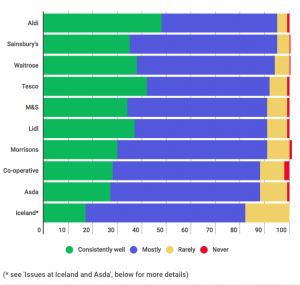
Horticulture Week: 26/06/2017
Unfair packaging charges reduced says adjudicator, but payment delays still troubling
Groceries Code Adjudicator (GCA) Christine Tacon says the latest polling data from supermarket suppliers “demonstrate major progress across key issues” during her four years in the role. But she says payment delays remain a major issue.
“The overall fall is welcome, but the more dramatic data comes from looking at supplier experience of issues that I have identified among my Top Five, and where I have used collaborative or more formal regulatory action to drive change.”
The figures show a fall in suppliers experiencing:
- “forensic auditing” – from 45% in 2014, to 12% in 2017;
- “margin maintenance” requests, from 36% in 2014 to 10%;
- unjustified charges for consumer complaints, down from 37% to 12%;
- unfair packaging and design charges, down from 24% to 11%;
“Suppliers have found the issue of packaging and design charges to be an irritant for years. Recently a supplier in the fresh produce industry told me that that they had been trying to resolve the problem of overcharging in this area for more than 10 years. But within 18 months of me focusing on the problem he was pleased to say the issue had gone away.”

Read the article here.
The Guardian: 26/06/2017
Asda is named worst supermarket in treatment of suppliers.
Asda has been named as the worst of the UK’s major supermarkets in its treatment of suppliers. It dropped below Morrisons, which was bottom of the list last year, as the Bradford-based chain took action to improve its performance according to a survey of more than 1,200 grocery suppliers by the industry watchdog.
“We’ve listened to the GCA and worked to improve our ways of working with suppliers to ensure we’re doing our job in the best way we can. This includes ensuring our smaller suppliers are paid within 14 days, simplifying our processes, and eliminating some of our supplier charges and audits. We will also be introducing further changes, including the expansion of a dedicated helpdesk to ensure our suppliers have a single point of contact to raise any concerns.”
Christine Tacon, the grocery code adjudicator who enforces the rules and has the power to fine retailers, said that she was generally pleased with progress since she came into office four years ago. She said more suppliers were getting involved as they found that she was able to bring about real change in the grocery market.

Read the full article here.
Fresh Produce Journal: 26/06/2017
Groceries Code Adjudicator agrees to a further year in the post, while new survey suggests her work is having a major impact
Groceries Code Adjudicator Christine Tacon has confirmed that she will continue for a further year, while the new government evaluates the role’s remit.
“The overall fall is welcome, but the more dramatic data comes from looking at supplier experience of issues that I have identified among my Top 5 and where I have used collaborative or more formal regulatory action to drive change”
She named her new Top 5 issues as delayed payments, forecasting, promotions, payments for better positioning and ‘pay to stay’.
“Suppliers have found the issue of packaging and design charges to be an irritant for years. Recently a supplier in the fresh produce industry told me that that they had been trying to resolve the problem of overcharging in this area for more than 10 years. But within 18 months of me focusing on the problem he was pleased to say the issue had gone away.”
“I see this as a sign that the collaborative approach that I have promoted has been a real engine of change and is achieving positive results across all retailers. I am delighted that suppliers are seeing the benefits of this change.”

Read the full article here.
Department for Business, Energy & Industrial Strategy: 26/06/2017
Christine Tacon reappointed as Groceries Code Adjudicator
Read the full article here.
April 2017 - Watchdog to quiz Tesco on Clubcard firm's 'favouritism'
April 2017 - Opinion: The future of the GCA
March 2017 - Supermarkets in 'bullies' quiz
February 2017 - Adjudicator rules payment for shelf space is beyond remit
February 2017 - Adjudicator role extension review to be postponed
January 2017 - Supermarkets up their game in changing trading practices
November 2016 - Irish Farmers' Association event
Morning Ireland Radio interview
RTE News TV report including interview
AgriLand: Absence of a ban on below cost selling a major flaw
AgriLand: Primary producers often the weakest link in the food supply chain
October 2016 - Widening the GCA net: who should Tacon tackle next?
June 2016 - Morrisons 'Treats suppliers the worst'
Previous Board and Taskforce Memberships
NED Met Office 2013-2106 (Board and member of Audit and Risk Committee, RemCo andNomCo)
NED Ursula Agriculture 2013-2016 a technology start-up analysing satellite and drone data
Governor Harper Adams University 2012-2106
Chair Food and Drink Engineering Forum 2012-2014 across IMechE, IChemE, IBD, IFST, IET
Chair 2011 Oxford Farming Conference, Director 2009-2011
NED Farmway 2012-2013, a farm supply business which we sold
NED Rural Payments Agency, Audit & Risk Committee member DEFRA 2001-2009
Public Member Network Rail 2012-2015
DEFRA Regulatory Challenge Panel Member 2011- 2015, including legislation on water abstraction
Member Living with Environmental Change (LWEC) Business Advisory Board 2012-2014
Member Rabobank Agricultural Advisory Board 2004-2011
Member Implementation Group of the Strategy for the Future of Food and Farming DEFRA 2003-2006
Sub-group Chair Food Growing in Schools Taskforce to DEFRA, DoE, DoH 2011-2012
Sub-group Chair Fruit and Vegetable Taskforce to DEFRA, DoH 2009-2010
Trustee Forum for the Future 2003-2006
April 2016 - Adjudicator warns extending remit will not resolve farmers' price woes
February 2016 - Tacon sends out clear message to the big retailers
February 2016 - The Grocer Power List 2016
“She’s been dubbed ‘Take on Tacon’. And who can doubt her resolve after her damning report into the ‘shocking’ negotiation tactics of Tesco?”
January 2016 - Tesco seriously breached industry code by delaying payments to suppliers, says report
January 2016 - Tesco Prioritised Finances Over Suppliers
January 2016 - Tesco knowingly delayed payments to suppliers
January 2016 - Tesco delayed payments to suppliers to boost profits, watchdog finds
January 2016 - Tesco breached Code
January 2016 - Tesco 'acted_unreasonably' towards suppliers
December 2015 - Tacon slams calls for GCA role in prices row
December 2015 - Stronger regulation will improve supplier relations
December 2015 - I’m a GCA, get me out of here!
June 2015 - Suppliers cry 'foul' over supermarket behaviour
June 2015 - Tesco at heart of most complaints to watchdog from food suppliers
June 2015 - Supplier survey shames grocers
June 2015 - Suppliers still unhappy with Tesco's deals, says watchdog
ESRC Seminar Series: "Food and Corporations" - City University London 30 March 2015

ESRC Seminar Series: “Food and Corporations” – see session 11
May 2015 - The Agri Brigade
April 2015 - David Cameron responds to a grilling by The Grocer
Working for fairness in the groceries supply chain
Feb 2015 - Boring is better than beaten
Feb 2015 - GCA Christine Tacon on Managing Supplier Relationships
Feb 2015 - Guest comment in The Promar Digest
Feb 2015 - Suppliers scared to blow whistle on big retailers
Feb 2015 - Troubled Tesco faces another enquiry
Feb 2015 - Watchdog warns UK stores over Tesco probe
Feb 2015 - Grocery regulator launches inquiry into Tesco's treatment of suppliers
Jan 2015 - Standing up for suppliers
Jan 2015 - Tacon takes on Tesco
Jan 2015 - Tacon with teeth
Oct 2014 - Tacon wants Tesco to review Groceries Code compliance
Oct 2014 - Watchdog: spill the beans on supermarket abuses
Oct 2014 - Hidden fees fuel a third of supermarket profits
June 2014 - Groceries Code boss sees gains
May 2014 - GCA marks first year with major conference and market survey
Toughen up: what Australia’s supermarket code could learn from the UK
This is an interesting opinion piece by Professor Caron Beaton-Wells drawing attention to the weaknesses of the Australian code as compared to the UK model.
March 2014 - Food and Farming need women leaders
March 2014 - Keeping supermarkets in line
February 2014 - Supermarkets urged to review forensic auditors' six-year-old-money claims
February 2014 - Consuming issues: Tacon's role broader than she thinks
February 2014 - Tacon warns retailers over 'forensic' auditing of suppliers
February 2014 - Elliott & Tacon star turns at UK seminar on supply chain
December 2013 - Fair Food Chain discussed in Brussels
December 2013 - Groceries Code Adjudicator Outlines Powers
December 2013 - Groceries Code Adjudicator heads to Brussels
December 2013 - Supermarket watchdog says suppliers avoid complaining
October 2013 - UFU meet UK Groceries Code Adjudicator
October 2013 - Unfair supply chain practices tops agenda in UFU meeting
October 2013 - Stormont Agriculture Committee meet with Groceries Code Adjudicator
October 2013 - O'Neill discusses concerns with Groceries Code Adjudicator
October 2013 - No help for farmers from Adjudicator
October 2013 - UK food industry praises Appetite for Engineering
September 2013 - An appetite for innovation, but no investment to feed it
September 2013 - Catch 22 for women Neds
One Woman's Career - RBS Focused Women presentation
Presentation at a Focused Women event (attended by men as well as women) in Manchester to RBS and its guests. See also Recommendations.
The Groceries Code Adjudicator
Presentation explaining the role of the Groceries Code Code Adjudicator.
July 2013 - Adjudicator proposes 1% of turnover fines
July 2013 - Rogue retailers face £500m fine
July 2013 - AgriChatUK - “One hour special with Christine Tacon, Grocery Code Adjudicator”
June 2013 - UK appoints regulator to protect grocery suppliers
June 2013 - UK supermarkets could face big fines, says tough-talking retail watchdog
June 2013 - Met Office announces new non-executive directors
Under Pressure
April 2013 – Tacon sets out stall on key role in food chain
March 2013 - Supermarkets watchdog gets ready to 'sort out the bullies'
Stargrazing: technology and its potential impact on water in agriculture
Presentation at Pinsent Masons to city investors.
Current Board and Committee Roles
Groceries Code Adjudicator a BIS Ministerial Appointment (2013-present)
The role was created to encourage, enforce and monitor adherence to the Groceries Supply Code of Practice by the 10 UK grocery retailers with turnover >£1bn in dealing with their direct suppliers. I have the power to launch investigations and to impose sanctions, including penalties up to 1% of UK turnover. The UK is unique in having a regulator and legally binding Code, so I am consulted by the European Commission and other countries facing the same supply chain issues.
- Considerable public profile achieved, building awareness amongst suppliers to raise issues
- Pioneered working in a collaborative way as a regulator, as well as using investigative powers
- Demonstrable success in changing retailer behaviour and improving compliance
- Completed investigation into Tesco plc
- 2 arbitrations complete and 2 in progress
This is a 3 day/week position supported by an office staffed by civil servants on secondment.
Chair Management Development Services (MDS) Ltd (May 2016)
An organisation running a 2 year graduate training programme on behalf of its members who are produce growers and processors in the food chain.
Non-Executive Director Anglia Farmers (Co-opted), Chair of RemCo and NomCo (2012 to present)
A £250m farmer-controlled co-operative, co-ordinating the purchase of inputs and products to its 4000 members across the UK. AF has experienced substantial growth over 10 years.
- Encouraged and established board committees and best practice in talent management
- Driven joint board and executive strategic planning, focusing on growth
Member Natural Environment Research Council (NERC) (2012, ending 2017)
NERC has a crucial role in directing where research is needed and funded. It includes the Centre for Ecology and Hydrology, National Oceanographic Centre, British Antarctic Survey and British Geological Survey.
- Ensured industry is represented and understood on a board mostly made up of scientists
BBC Rural Affairs Advisory Committee, Chair 3 days p.a. (2005 to present)
The meetings are attended by producers and researchers of programmes such as BBC News, Costing the Earth and Countryfile. Our role is to ensure the programmes remain topical and accurate.
BIS Select Committee approves my appointment to GCA
The Business Industry and Skills (BIS) Select Committee, who have scrutinised the Grocery Code Adjudicator Bill, asked for a pre-appointment hearing to meet the Government’s proposed candidate for the post of Groceries Code Adjudicator. This was a specially convened meeting in the House of Commons, which lasted an hour with questions on my experience and how I was going to approach the role. The full script will be made available, I currently have the draft to correct for typos. It was filmed and mentioned on Today in Parliament
February 2013 - Fresh Produce Journal
This issue of the FPJ covers Christine’s presentation to students at the University of Cambridge Institute for Manufacturing together with an interview following her appointment as Groceries Code Adjudicator.
What does the future hold for the UK agricultural sector? - January 2013
Christine was the keynote speaker at the annual conference of the Institute of Chartered Accountants in England and Wales, speaking on the topic ‘What does the future hold for the UK agricultural sector?’.
A summary of the talk is included in the ICAEW Farming and Rural Business Group News
January 2013 - Christine Tacon appointed Groceries Code Adjudicator
Media coverage includes:
Mirror Online: Supermarket tsar_Christine Tacon appointed Groceries Code Adjudicator
Retail Week: Five reasons why Christine Tacon may prove an astute appointment as Groceries Code Adjudicator
The Grocer: Tacon named as Groceries Code Adjudicator
NFU: Groceries code appointment – NFU response
Farming UK: Tacon appointed as new supermarket adjudicator
Food Manufacture: Christine Tacon appointed groceries code adjudicator
Just Food: UK Groceries Code Adjudicator appointed
Just Food: BRC cautiously welcomes grocery adjudicator Tacon
New Statesman: Five questions answered on the first appointed supermarket ombudsman
The future of satellites in agriculture - December 2012
 Presentation by Christine (keynote speaker) at European Space Solutions agriculture session. Details on the ESS conference website.
Presentation by Christine (keynote speaker) at European Space Solutions agriculture session. Details on the ESS conference website.
Interests
Regular participant in London to Brighton Veteran Car Run in 1903 Autocar![]() , rallied from Paris to Monaco in 1953 Morris Minor and have owned 1929 Austin 7 since learning to drive in it
, rallied from Paris to Monaco in 1953 Morris Minor and have owned 1929 Austin 7 since learning to drive in it
Narrowboat owner, travelled from Macclesfield to London for the Olympics
Sustainable building: worked on Co-operative Group Eco-Town bid, got planning permissions for “home grown” house on Co-op farm and converted own barn with rainwater harvesting, ground source heating, sedum roof and new building materials
Nitrogen: How can we support farmers to adopt best practice? - November 2012
 Presentation to Farmway in Edinburgh – November 12 2012
Presentation to Farmway in Edinburgh – November 12 2012
December 2011- "A farmer and a woman" - The new Fellow securing food for the nation
Speech to Order of British Empire Lunch - May 2010
 Given by Christine in response to the given title “Unusual situations I have had to address running the Co-operative Farms”.
Given by Christine in response to the given title “Unusual situations I have had to address running the Co-operative Farms”.
Notes on Food Security - May 2011
 Prepared by Christine in response to Professor Sir John Beddington’s Foresight Report into the Future of Food and Farming.
Prepared by Christine in response to Professor Sir John Beddington’s Foresight Report into the Future of Food and Farming.
Lincoln Food Lecture
Address by Christine to the Lincolnshire Agricultural Society Annual spring lecture.
Awards/Education/Interests
Honorary Professor, Harper Adams University 2016
Doctor of Science, Honoris Causa, Cranfield University 2014
CBE for Services to Agriculture in 2004 ![]()
Chartered Engineer, FIMechE, FIAgrE, FRSA, FRAgS, Chartered Environmentalist![]()
MBA Cranfield University
MEng and MA Cambridge University, Production Engineering
Fluent French and German speaker, basic Spanish
Vintage and veteran cars: participant in London to Brighton Veteran Car Run in a 1903 Autocar. ![]()
Enjoy narrowboating, dog-walking, vegetable growing, cross-country skiing and adventure holidays.
Employment
| The Co-operative Group, Managing Director Co-operative Farms | 2000-Jan 2012 |
| Executive board member Co-operative Food (simultaneous) | 2010-Jan 2012 |
| New Zealand Dairy Board (now Fonterra), Commercial Director Anchor Foods UK | 1996-2000 |
| Redland Plc, Marketing Director Redland Bricks | 1994-1996 |
| Vodafone, Marketing Consultant to National Lottery Bid | 1993-1994 |
| Wang UK, Marketing Director | 1992-1993 |
| Mars Confectionery, Marketing Manager, Production Planner | 1985-1992 |
| Coats Viyella, Quality Manager Dynacast UK, Trainee Dynacast Germany, France | 1982-1985 |
Previous Non-executive Experience
Public Member of Network Rail acting as a shareholder, representing the public interest, holding the Executive and Non-Executive board to account 2012-2015
Chair Food and Drink Engineering Forum operating across IMechE, IChemE, IAgrE, IBD, IFST, IET 2012-2014
Business Advisory Board Member for Living with Environmental Change, a partnership of the Research Councils reporting to BISNED 2011-2014
Farmway 2012-2013, a farm supply business which I led to a sale, completed March 2013
NED Rural Payments Agency, Audit & Risk Committee member DEFRA 2001-2009
Member Implementation Group of the Strategy for the Future of Food and Farming DEFRA 2003-2006
Trustee Forum for the Future 2003-2006
Rabobank Agricultural Advisory Board 2004-2011
Chair 2011 Oxford Farming Conference, Director 2009-2011 ![]()
Sub-group Chair Food Growing in Schools Taskforce to DEFRA, DoE, DoH 2011-2012
Sub-group Chair Fruit and Vegetable Taskforce to DEFRA, DoH 2009-2010![]()
Member HRH Prince’s Rural Action Programme 2007-2008
Judge 2012 BBC Food and Farming Awards, Farmer of the Year and Big Food Idea (retail/supply)
Member of LWEC Review Panel 2012
Executive experience 1982 to 2012
11 years in the Co-operative Group as Managing Director of the Co-operative Farms (now owned by the Wellcome Trust), including a year on the Co-operative Food Executive Board
- Credited with turning round the farming business, losing £6m p.a, to one of the most respected farming businesses in the UK, in 2011 making £6m profit
- Integrated production vertically into packing and branded produce in Co-op stores
- Encouraged co-operation in machinery sharing, input purchasing and focus on R&D
- Initiated the award-winning “From Farm to Fork” project which has had over 250k school children spend an educational day on a farm and Habitat Heroes, a project enhancing the environment for red-listed species on the farms
- The farm sold at £50m premium to the value of the land, which I perceive as the value I added
12 years in fast moving consumer goods: brand management with Mars Confectionery and Vodafone and Marketing Director at Anchor Foods (now Fonterra)
- Launched the Tracker brand at Mars Confectionery and created the Milky Way advertising still known to children today (through You Tube). Was one of the first engineers to be recruited into marketing and used my analysis of data to make significant differences in strategy.
- Created the Free Range butter campaign for Anchor which ran for 15 years
- Worked as a consultant for Vodafone for a year on their National Lottery bid
5 years in engineering with Coats Viyella (Germany, France, UK) and Marketing Director, Redland Bricks
- 3 years at Coats Viyella in Dynacast, the high precision zinc die-casting subsidiary mainly supplying the motor industry. Trainee then Quality Assurance Manager
- Redland Bricks was owned by Redland plc, I was the only female director in the plc. I used traditional marketing skills to increase margins considerably in the bricks business.
| The Co-operative Group, Managing Director Co-operative Farms | 2000-2012 |
| New Zealand Dairy Board (now Fonterra), Commercial Director Anchor Foods UK | 1996-2000 |
| Redland Plc, Marketing Director Redland Bricks | 1994-1996 |
| Vodafone, Marketing Consultant to National Lottery Bid | 1993-1994 |
| Wang UK, Marketing Director | 1992-1993 |
| Mars Confectionery, Marketing Manager, Production Planner | 1985-1992 |
| Coats Viyella, Quality Manager Dynacast UK, Trainee Dynacast Germany, France | 1982-1985 |
October 2012 - BBC Farmer of the Year finalists
Christine was a judge in the BBC Food and Farming awards and can be heard on three broadcasts meeting the finalists vying for the title of Farmer of the Year:
Farmer of the Year finalist: Tom Rawson
Farmer of the Year finalist: Henry Edmunds
Farmer of the Year finalist: Guy Watson
2000-Jan 2012 Co-operative Farms
Transformed the Co-operative Group’s farming business from a £6m loss, £40m turnover in 2000 to £6m profit and £65m turnover
- restructured and removed layers of management
- took major decisions such as exiting dairy farming and expanding into fresh produce packing
- de-risked operations through hedging currency and fuel, selling forwards and introducing risk management principles to the industry
Drove a cultural change within the business
- integrated Farms with the rest of the Co-operative Group, connecting farmers with Group initiatives, such as educating children and wildlife conservation initiatives, and raising awareness in the Group of the power of the farming business to support the brand
- achieved the highest employee engagement scores in the Group
Inspired and led the branding of Co-operative Farms
- led branding of fresh produce packs in store
- secured extensive PR coverage
- initiated the multi-award winning “From Farm to Fork” schools education project: over 60k primary school children have spent an educationally structured day on a farm to date
Influenced the farming industry
- member of the DEFRA sponsored Implementation Group of the Sustainable Farming and Food Strategy, setting a new strategic direction for the industry including a requirement for farmers to connect with their markets
- implemented industry leading Environmental Management System and species protection project (Habitat Heroes)
- networked with landowners, government, BBC, EU, industry leaders and grower groups leading to demonstrable change in strategy and communication e.g. CAP Reform implementation, cattle movement process to contain TB and advising Countryfile which is now the most watched factual programme by the BBC
- speaking engagements including the Oxford Farming Conference, 2011 City Food Lecture, numerous farmer discussion groups, TV and radio
1996-2000 Anchor Foods Ltd (now Fonterra)
UK turnover £300m
Sales Director and Commercial Director
Promoted in 1999 to Sales Director of a demoralised, not highly respected sales force. Further promoted to Commercial Director.
refocused the team on the customer, increasing visits to customers at all levels, including other functions, and started a new focus on convenience and foodservice.
introduced tighter disciplines of monitoring performance and much tighter integration with marketing.
started much improved co-ordination with manufacturing to reduce costs across the supply chain, and drove value chain initiative project starting at the customer end.
drove new initiatives to exceed budget, in particular in foodservice and a strategy to dominate own label indirectly.
kept team morale high during a difficult few months of being caught in a price war, followed by complete customer service failure, leading to delistings, compensation claims.
high level of networking through election to regional CBI council, marketing society and an informal group of marketing and managing directors meeting for quarterly dinners.
Marketing Director
Inherited poorly regarded team.
recruited a new team, managing the departure of most of the old, with no dismissals, but setting new standards through use of interim managers and recruits. My successor was one of the new recruits.
developed a new brand equity with the use of ‘Free Range’ for Anchor butter involving advertising, repackaging and extension to new products.
redirected aerosol cream from decline and price focus to growth and added value/interest strategy, increasing profitability by factor of 2.
raised level of consumer insight, increasing depth of strategic thought.
introduced Idea to Market disciplines, throughout the company, including Business Activity Recommendations for all major initiatives.
raised skills in understanding profitability and financial justifications, always in control of budgets.
created new open plan office environment from the ‘archive floor’, breaking down silos of cheese vs butter vs cream and hierarchies as a result, and strong teamwork.
December 2011- "A farmer and a woman" - The new Fellow securing food for the nation
Institution of Mechanical Engineers (PDF 2.3MB, new window)
September 2012 - Anglia Farmers - Non Executive Director
I have been co-opted as a Non Executive Director of Anglia Farmers, the £250m turnover buying group commencing Sept 2012.
September 2012 - Network Rail - Public member
I have been accepted as a Public Member of Network Rail: there are 30 Public Members who act as shareholders, serving a 3 year term commencing Nov 2012.
September 2012 - Christine Tacon joins the board of Anglia Farmers
August 2012 - Interview with Labour Party researcher
We discussed a range of food and farming issues.
June 2012 - BBC Radio on the hunt for 'big food ideas'
May 2012 - Tacon takes on chair of arable farming venture
April 2012 - The Female FTSE Board Report 2012
April 2012 - Few regrets from time as Britain's biggest farmer
Report of the Fruit and Vegetables Task Force - August 2010
 Final report as prepared by DEFRA and agreed by the Taskforce of which Christine was a sub-group chair.
Final report as prepared by DEFRA and agreed by the Taskforce of which Christine was a sub-group chair.
February 2012 - LWEC Review
Living with Environmental Change was set up to coordinate the work of the Research Councils. It is customary to have reviews of effectiveness and I have been invited onto the panel to look into this. It will be an interesting exercise as I have only just joined the Business Advisory Board arm of
February 2012 - Farms chief bids a fond farewell to growing business
The Sustainable Farming and Food Strategy, Three Years On - Reflections on progress - 2006

Report by Lord Curry, Chair of the Implementation Group, of which Christine was a member.
January 2012 - Farmway Ltd
I am now an Independent Non Executive Director of Farmway Ltd and have had my first board meeting.
January 2012 - Harper Adams University
I have accepted an invitation to be a Governor at Harper Adams.
December 2011- Carr's corner
October 2011 - Local farmer champions home-grown food
October 2011 - Farmer is Co-op's onion king
October 2011- Co-op to promote British farmers
September 2011- Co-operative Farms boss steps down
September 2011- Co-op Farms chief resigns
August 2011- Standing out from the crowd
August 2011- Christine's aim is to grow the Co-op's business organically
July 2011- Reasheath provides tailored training for The Co-operative Farms
June 2011- Life in the fast lane
June 2011- The Co-operative Group
Co-operative lifeline for red squirrels in Perthshire
Farm hopes more otters will follow in green scheme
Plans to save the water vole
Owls offered 'super-sized' homes
Farm joins trial to boost nature
Blair farm welcomes the 'Habitat Heroes'
April 2011- Round up: Co-operative Group sponsors online coverage of Oxford Farming Conference
April 2011- In brief: Co-operative financial results
April 2011- Co-operative Farms lead the way with a national apprenticeship scheme role
April 2011- Co-op eyes leading food security role
March 2011 - Hard worker has loved each minute of a life on the land
2016
November 2016 - Irish Farmers' Association event
Morning Ireland Radio interview
RTE News TV report including interview
AgriLand: Absence of a ban on below cost selling a major flaw
AgriLand: Primary producers often the weakest link in the food supply chain
October 2016 - Widening the GCA net: who should Tacon tackle next?
June 2016 - Morrisons 'Treats suppliers the worst'
April 2016 - Adjudicator warns extending remit will not resolve farmers' price woes
February 2016 - Tacon sends out clear message to the big retailers
February 2016 - The Grocer Power List 2016
“She’s been dubbed ‘Take on Tacon’. And who can doubt her resolve after her damning report into the ‘shocking’ negotiation tactics of Tesco?”
January 2016 - Tesco seriously breached industry code by delaying payments to suppliers, says report
January 2016 - Tesco Prioritised Finances Over Suppliers
January 2016 - Tesco knowingly delayed payments to suppliers
January 2016 - Tesco delayed payments to suppliers to boost profits, watchdog finds
January 2016 - Tesco breached Code
January 2016 - Tesco 'acted_unreasonably' towards suppliers
2015
December 2015 - Tacon slams calls for GCA role in prices row
December 2015 - Stronger regulation will improve supplier relations
December 2015 - I’m a GCA, get me out of here!
June 2015 - Suppliers cry 'foul' over supermarket behaviour
June 2015 - Tesco at heart of most complaints to watchdog from food suppliers
June 2015 - Supplier survey shames grocers
June 2015 - Suppliers still unhappy with Tesco's deals, says watchdog
ESRC Seminar Series: "Food and Corporations" - City University London 30 March 2015

ESRC Seminar Series: “Food and Corporations” – see session 11
May 2015 - The Agri Brigade
April 2015 - David Cameron responds to a grilling by The Grocer
Working for fairness in the groceries supply chain
Feb 2015 - Boring is better than beaten
Feb 2015 - GCA Christine Tacon on Managing Supplier Relationships
Feb 2015 - Guest comment in The Promar Digest
Feb 2015 - Suppliers scared to blow whistle on big retailers
Feb 2015 - Troubled Tesco faces another enquiry
Feb 2015 - Watchdog warns UK stores over Tesco probe
Feb 2015 - Grocery regulator launches inquiry into Tesco's treatment of suppliers
Jan 2015 - Standing up for suppliers
Jan 2015 - Tacon takes on Tesco
Jan 2015 - Tacon with teeth
2014
Oct 2014 - Tacon wants Tesco to review Groceries Code compliance
Oct 2014 - Watchdog: spill the beans on supermarket abuses
Oct 2014 - Hidden fees fuel a third of supermarket profits
June 2014 - Groceries Code boss sees gains
May 2014 - GCA marks first year with major conference and market survey
March 2014 - Food and Farming need women leaders
March 2014 - Keeping supermarkets in line
February 2014 - Supermarkets urged to review forensic auditors' six-year-old-money claims
February 2014 - Consuming issues: Tacon's role broader than she thinks
February 2014 - Tacon warns retailers over 'forensic' auditing of suppliers
February 2014 - Elliott & Tacon star turns at UK seminar on supply chain
2013
Toughen up: what Australia’s supermarket code could learn from the UK
This is an interesting opinion piece by Professor Caron Beaton-Wells drawing attention to the weaknesses of the Australian code as compared to the UK model.
December 2013 - Fair Food Chain discussed in Brussels
December 2013 - Groceries Code Adjudicator Outlines Powers
December 2013 - Groceries Code Adjudicator heads to Brussels
December 2013 - Supermarket watchdog says suppliers avoid complaining
October 2013 - UFU meet UK Groceries Code Adjudicator
October 2013 - Unfair supply chain practices tops agenda in UFU meeting
October 2013 - Stormont Agriculture Committee meet with Groceries Code Adjudicator
October 2013 - O'Neill discusses concerns with Groceries Code Adjudicator
October 2013 - No help for farmers from Adjudicator
October 2013 - UK food industry praises Appetite for Engineering
September 2013 - An appetite for innovation, but no investment to feed it
September 2013 - Catch 22 for women Neds
One Woman's Career - RBS Focused Women presentation
Presentation at a Focused Women event (attended by men as well as women) in Manchester to RBS and its guests. See also Recommendations.
The Groceries Code Adjudicator
Presentation explaining the role of the Groceries Code Code Adjudicator.
July 2013 - Adjudicator proposes 1% of turnover fines
July 2013 - Rogue retailers face £500m fine
June 2013 - UK appoints regulator to protect grocery suppliers
June 2013 - UK supermarkets could face big fines, says tough-talking retail watchdog
June 2013 - Met Office announces new non-executive directors
Under Pressure
April 2013 – Tacon sets out stall on key role in food chain
March 2013 - Supermarkets watchdog gets ready to 'sort out the bullies'
Stargrazing: technology and its potential impact on water in agriculture
Presentation at Pinsent Masons to city investors.
February 2013 - Fresh Produce Journal
This issue of the FPJ covers Christine’s presentation to students at the University of Cambridge Institute for Manufacturing together with an interview following her appointment as Groceries Code Adjudicator.
What does the future hold for the UK agricultural sector? - January 2013
Christine was the keynote speaker at the annual conference of the Institute of Chartered Accountants in England and Wales, speaking on the topic ‘What does the future hold for the UK agricultural sector?’.
A summary of the talk is included in the ICAEW Farming and Rural Business Group News
January 2013 - Christine Tacon appointed Groceries Code Adjudicator
Media coverage includes:
Mirror Online: Supermarket tsar_Christine Tacon appointed Groceries Code Adjudicator
Retail Week: Five reasons why Christine Tacon may prove an astute appointment as Groceries Code Adjudicator
The Grocer: Tacon named as Groceries Code Adjudicator
NFU: Groceries code appointment – NFU response
Farming UK: Tacon appointed as new supermarket adjudicator
Food Manufacture: Christine Tacon appointed groceries code adjudicator
Just Food: UK Groceries Code Adjudicator appointed
Just Food: BRC cautiously welcomes grocery adjudicator Tacon
New Statesman: Five questions answered on the first appointed supermarket ombudsman
2012
The future of satellites in agriculture - December 2012
 Presentation by Christine (keynote speaker) at European Space Solutions agriculture session. Details on the ESS conference website.
Presentation by Christine (keynote speaker) at European Space Solutions agriculture session. Details on the ESS conference website.
Nitrogen: How can we support farmers to adopt best practice? - November 2012
 Presentation to Farmway in Edinburgh – November 12 2012
Presentation to Farmway in Edinburgh – November 12 2012
Notes on Food Security - May 2011
 Prepared by Christine in response to Professor Sir John Beddington’s Foresight Report into the Future of Food and Farming.
Prepared by Christine in response to Professor Sir John Beddington’s Foresight Report into the Future of Food and Farming.
Lincoln Food Lecture
Address by Christine to the Lincolnshire Agricultural Society Annual spring lecture.
October 2012 - BBC Farmer of the Year finalists
Christine was a judge in the BBC Food and Farming awards and can be heard on three broadcasts meeting the finalists vying for the title of Farmer of the Year:
Farmer of the Year finalist: Tom Rawson
Farmer of the Year finalist: Henry Edmunds
Farmer of the Year finalist: Guy Watson
September 2012 - Christine Tacon joins the board of Anglia Farmers
August 2012 - Interview with Labour Party researcher
We discussed a range of food and farming issues.
June 2012 - BBC Radio on the hunt for 'big food ideas'
May 2012 - Tacon takes on chair of arable farming venture
April 2012 - The Female FTSE Board Report 2012
April 2012 - Few regrets from time as Britain's biggest farmer
Report of the Fruit and Vegetables Task Force - August 2010
 Final report as prepared by DEFRA and agreed by the Taskforce of which Christine was a sub-group chair.
Final report as prepared by DEFRA and agreed by the Taskforce of which Christine was a sub-group chair.
February 2012 - Farms chief bids a fond farewell to growing business
The Sustainable Farming and Food Strategy, Three Years On - Reflections on progress - 2006

Report by Lord Curry, Chair of the Implementation Group, of which Christine was a member.


 Food and drink suppliers have been granted more power at the negotiating table after seven years of successful regulation in the groceries sector, according to the exiting Groceries Code Adjudicator (GCA).
Food and drink suppliers have been granted more power at the negotiating table after seven years of successful regulation in the groceries sector, according to the exiting Groceries Code Adjudicator (GCA). 
